Summer Research Program’s Student Experiences
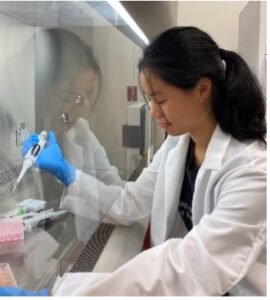 Being a summer student at RITMS has brought me so many opportunities to grow both academically and personally. As a rising college freshman, I was able to conduct asthma research, observe complex experiments, and take the lead on a project of my own. From the beginning of the program, I had a general sense of my project’s research objectives, and was given the chance to design my own experiments in the direction that my curiosity led me.
Being a summer student at RITMS has brought me so many opportunities to grow both academically and personally. As a rising college freshman, I was able to conduct asthma research, observe complex experiments, and take the lead on a project of my own. From the beginning of the program, I had a general sense of my project’s research objectives, and was given the chance to design my own experiments in the direction that my curiosity led me.
Learning to establish research questions and make decisions has been an integral part of my RITMS experience. My project involved hypothesizing the molecular pathways of ILC2 cell response to two compounds and their effects on asthma. Within my first couple of weeks in the program, I learned to culture cell lines, conduct cell viability assays, and treat cells with various chemicals for my experiments. One of the unique aspects of my experience was that I learned not only various techniques, but also how to become comfortable working independently in a laboratory setting and using the tools available to me in resourceful ways.
RITMS has given me the chance to receive invaluable mentorship from everyone in Dr. Yang’s lab. In keeping me involved in their projects, they showed me how exciting the field of immunology is and encouraged me to ask questions frequently. Ever since the beginning of my program, Dr. Yang and I were able to develop a detailed timeline for my experiments, which the other researchers constantly helped me to follow and change as needed. Under their guidance, I was able to become more independent while still being able to rely on them for assistance throughout any learning process. Interacting with other summer students in Dr. Yang’s lab has also been a unique experience; since our projects have many parallels, we have been able to discuss together the best ways to conduct certain experiments. I have learned to become comfortable taking the lead at times and sharing the skills I developed in the beginning of my program. Outside of lab work, I have gained tremendous advice for my college studies and beyond simply by spending time in Dr. Yang’s lab and hearing about others’ professional journeys.
Anthony Altobelli IV
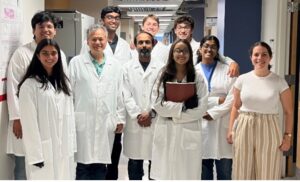 The RITMS summer internship program has provided me with an avenue for learning and appreciating real-world scientific research. As a rising junior in college, I have yet to receive a laboratory experience that has provided as much insight into meaningful research as the RITMS program has provided. Throughout the course of the summer, as a member of the undergraduate program, I conducted research and became a part of a scientific team. While brand new to many different applications and strategies utilized by the institute, the leaders, both Ph.D. containing and members working towards their Ph.D. worked with me every step of the way instilling confidence in laboratory techniques that I had not experienced before. It truly felt good going into the lab every day not only with purpose but also with a support system that wanted to see you grow and thrive within the program. Through experimentation, failure, and support, I can say that I am walking away from the program possibly a better “western blotter” or maybe a true natural at taking care of cell culture lines, but I can definitely say I am walking away with a true understanding of what it means to be a scientific researcher.
The RITMS summer internship program has provided me with an avenue for learning and appreciating real-world scientific research. As a rising junior in college, I have yet to receive a laboratory experience that has provided as much insight into meaningful research as the RITMS program has provided. Throughout the course of the summer, as a member of the undergraduate program, I conducted research and became a part of a scientific team. While brand new to many different applications and strategies utilized by the institute, the leaders, both Ph.D. containing and members working towards their Ph.D. worked with me every step of the way instilling confidence in laboratory techniques that I had not experienced before. It truly felt good going into the lab every day not only with purpose but also with a support system that wanted to see you grow and thrive within the program. Through experimentation, failure, and support, I can say that I am walking away from the program possibly a better “western blotter” or maybe a true natural at taking care of cell culture lines, but I can definitely say I am walking away with a true understanding of what it means to be a scientific researcher.
The RITMS summer research program has allowed me to better understand my academic goals. While I came into the program with an interest in laboratory research and biomedical studies, it gave me the opportunity to experience the responsibilities and day-to-day challenges that a researcher faces. Through RITMS, I have been able to join a scientific research community that I hope to continue to be a part of in the future.
Sahana Kapoor
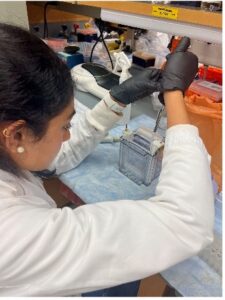 Working at the Institute for Translational Medicine and Science this summer has been an extraordinary opportunity, providing me with invaluable hands-on research experience that will undoubtedly shape my future academic and professional endeavors. As a rising senior in high school, I initially had limited research exposure, but the Panettieri Lab embraced me with unwavering support from my mentor, post-docs, graduate students, and other accomplished scientists. Under the mentorship of Dr. Cynthia Koziol-White, I was able to conduct my own research on human airway smooth muscle cells, as well as, assist and observe in various other experiments, ranging from tissue extraction from donor lungs to ASM and epithelial cell culture techniques. A significant portion of my time was dedicated to mastering the Western Blot Procedure, involving serum deprivation of cells overnight, administering compounds like carbachol, methacholine, histamine, and acetylcholine, performing gel electrophoresis, and analyzing and presenting my results. Although I encountered setbacks and challenges while learning this technique, individuals like Eric Gebski, Dr. Gaoyuan Cao, Cassandra Spector, and Brian Deeney were always ready to lend a helping hand, enabling me to improve my understanding of the scientific process.
Working at the Institute for Translational Medicine and Science this summer has been an extraordinary opportunity, providing me with invaluable hands-on research experience that will undoubtedly shape my future academic and professional endeavors. As a rising senior in high school, I initially had limited research exposure, but the Panettieri Lab embraced me with unwavering support from my mentor, post-docs, graduate students, and other accomplished scientists. Under the mentorship of Dr. Cynthia Koziol-White, I was able to conduct my own research on human airway smooth muscle cells, as well as, assist and observe in various other experiments, ranging from tissue extraction from donor lungs to ASM and epithelial cell culture techniques. A significant portion of my time was dedicated to mastering the Western Blot Procedure, involving serum deprivation of cells overnight, administering compounds like carbachol, methacholine, histamine, and acetylcholine, performing gel electrophoresis, and analyzing and presenting my results. Although I encountered setbacks and challenges while learning this technique, individuals like Eric Gebski, Dr. Gaoyuan Cao, Cassandra Spector, and Brian Deeney were always ready to lend a helping hand, enabling me to improve my understanding of the scientific process.
In addition to the hands-on laboratory experience, I acquired in this program, the faculty and staff at RITMS went above and beyond in creating a truly educational experience for the summer students. Weekly lab meetings with Dr. Panettieri allowed me to both delve into the ongoing research in the lab and offered me an opportunity to present my findings. During this, I was able to describe the scientific background, methods, results, and conclusions of my experiments. Although this was initially intimidating, the lab members created a welcoming and supportive environment that bolstered my confidence. Moreover, group lectures for the student interns expanded my scientific knowledge, covering topics like airway biology, the scientific method, cell signaling pathways, and the application of statistics in scientific research. I am immensely grateful for the chance to engage in real research and for the exceptional support provided by everyone in the lab. This experience has been transformative, and I am excited to carry the skills and knowledge gained here into my future academic pursuits.
Manali Shah
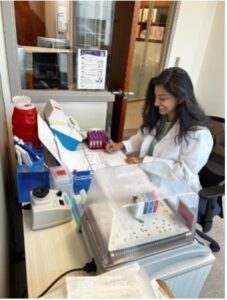 In my time as a Clinical Research Assistant, I have been active in interacting with patients and healthcare providers in various ongoing clinical studies by assisting in medical record and data collection, taking vital signs, participating in the Institutional Review Board (IRB) process, and processing samples as per study protocols. Working in the RWJ Clinical Research Center has helped me develop essential skills to ensure a patient-centered environment, while paying attention to details in all the steps of enrolling, screening, and proceeding with patients in the outlined protocols. With my previous patient interaction being more short-term for emergent situations, working in this center exposed me to the care and treatment of patients with chronic conditions, such as cystic fibrosis, renal disease, and scleroderma. It is interesting to witness the different roles of healthcare providers in ensuring the safety and wellbeing of patients throughout these trials. Overall, this experience has been very educational and influential for my future aspirations in the healthcare field.
In my time as a Clinical Research Assistant, I have been active in interacting with patients and healthcare providers in various ongoing clinical studies by assisting in medical record and data collection, taking vital signs, participating in the Institutional Review Board (IRB) process, and processing samples as per study protocols. Working in the RWJ Clinical Research Center has helped me develop essential skills to ensure a patient-centered environment, while paying attention to details in all the steps of enrolling, screening, and proceeding with patients in the outlined protocols. With my previous patient interaction being more short-term for emergent situations, working in this center exposed me to the care and treatment of patients with chronic conditions, such as cystic fibrosis, renal disease, and scleroderma. It is interesting to witness the different roles of healthcare providers in ensuring the safety and wellbeing of patients throughout these trials. Overall, this experience has been very educational and influential for my future aspirations in the healthcare field.
Preeti Airen
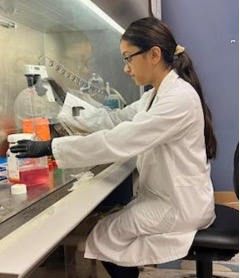 A summer at the Panettieri lab has been an experience better than any that I could have asked for. The lab was a place where theory came to life and learning could be done without being limited by the walls of a classroom or the covers of a textbook. The lab had cutting-edge equipment, supportive people, and exposed me to areas of science that I had never seen before. I saw how experiments that required a lot of time spent hand pipetting in school could be done in minutes in a more accurate and completely automated process. The lab taught me things I never thought I would learn and helped meet people I never thought I would meet.
A summer at the Panettieri lab has been an experience better than any that I could have asked for. The lab was a place where theory came to life and learning could be done without being limited by the walls of a classroom or the covers of a textbook. The lab had cutting-edge equipment, supportive people, and exposed me to areas of science that I had never seen before. I saw how experiments that required a lot of time spent hand pipetting in school could be done in minutes in a more accurate and completely automated process. The lab taught me things I never thought I would learn and helped meet people I never thought I would meet.
Most of my work in the lab involved observing various cell signaling pathways through specific proteins in order to measure Cyclic Adenosine Monophosphate, or cAMP, levels and I did a lot of work with Western blots. My work in the lab required me to do a lot of reading about the compounds and proteins that I was working with, and it was all worth it. I learned so much and found myself having passions for fields of medicine that I had not even considered for my career before.
I worked under the guidance of Dr. Gaoyuan Cao. Dr. Cao always encouraged me to read and learn as much as I could. He also allowed me to make mistakes and learn from them. He was extremely supportive and was always ready to answer any questions I asked. Mr. Brian Deeney helped me a lot with my western blots. He was always happy to share tips on how to make the process easier and more efficient. Mr. Nikhil Karmacharya also helped me a lot. In addition to entertaining every question I asked, he was always willing to let me watch him run various procedures and let me do some tasks around the lab to help him out. Doing these tasks repeatedly helped me get good at them. Overall, everyone in the lab was extremely supportive. This was especially visible at lab meetings, in which everyone presented the research they had done in the past week to the whole lab, including Dr. Panettieri. Dr. Panettieri always gave each person helpful tips on how to change and improve their experiments. Overall, I had a wonderful experience at the lab. I always found myself coming in early and leaving late. I left the lab every day with a smile on my face, wonderful stories to share with people in the future, and more knowledge than I had left with the previous day.
Anamitra Kugapalan
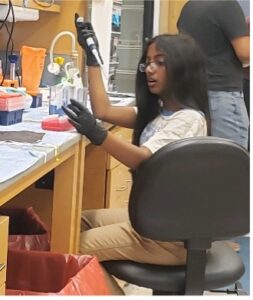 I am Anamitra Kugapalan and I was a high school student that did research at RITMS. Participating in RITMS was an incredible activity to do this summer. It was a unique experience that allowed me to not only grow my passion for science but to develop more advanced skills in this field. RITMS teaches students a variety of advanced lab techniques regarding cell cultures, western blots, gel electrophoresis, and more. Another aspect that made RITMS unique was that we did not just focus on the procedure – we also learned how to analyze, interpret, and present results, along with how to design experiments. At RITMS, the experiments we executed all had relevance to translational medicine. Knowing that our work could help lead not only to advancement in treatment but also to understanding of respiratory illnesses helped me become more passionate about science. I loved learning about these different aspects of research and I walked away with new goals and a mindset.
I am Anamitra Kugapalan and I was a high school student that did research at RITMS. Participating in RITMS was an incredible activity to do this summer. It was a unique experience that allowed me to not only grow my passion for science but to develop more advanced skills in this field. RITMS teaches students a variety of advanced lab techniques regarding cell cultures, western blots, gel electrophoresis, and more. Another aspect that made RITMS unique was that we did not just focus on the procedure – we also learned how to analyze, interpret, and present results, along with how to design experiments. At RITMS, the experiments we executed all had relevance to translational medicine. Knowing that our work could help lead not only to advancement in treatment but also to understanding of respiratory illnesses helped me become more passionate about science. I loved learning about these different aspects of research and I walked away with new goals and a mindset.
Another aspect of RITMS that new students will appreciate is the welcoming environment. All of the supervisors were kind and very instructive. They provided background regarding research done by the lab, such as information about the cell signaling pathways we were targeting, so that students can understand what they are basing their own experiments on, along with others’ experiments. The environment created by RITMS is perfect for proactive learners as you get to work one-on-one with talented researchers. I really appreciated how my mentor asked me questions to make sure I not only understood the material but also could think critically about it, and also created a no judgment environment that allowed me to ask questions and learn. It was evident that the mentors in the program wanted to help bring about positive change in the attendees, which is why it was so engaging. They also provided positive feedback for improvement when students presented at lab meetings and allowed students to take initiative on projects. Additionally, meeting and working alongside your peers means there is never a dull moment in the lab. All in all, I am so glad I had the opportunity to participate in RITMS, as it helped me grow as a learner and person, and its impact will be evident in years to come.
Brandon Jung
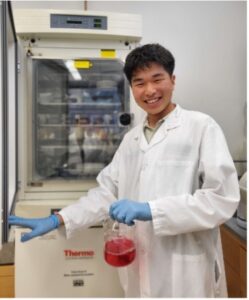 Interning at RITMS allowed me to gain deep insights into research and various lab procedures. As part of the research team, I was actively involved in conducting experiments, collecting data, and analyzing results while closely working with the experienced faculty here. My daily experiences within the lab were so valuable to me, as they helped build my technical skills and taught me what an innovative environment was truly like. With so much to do and learn every day, RITMS solidified my passion for science and helped me appreciate the beauty of research and inquiry.
Interning at RITMS allowed me to gain deep insights into research and various lab procedures. As part of the research team, I was actively involved in conducting experiments, collecting data, and analyzing results while closely working with the experienced faculty here. My daily experiences within the lab were so valuable to me, as they helped build my technical skills and taught me what an innovative environment was truly like. With so much to do and learn every day, RITMS solidified my passion for science and helped me appreciate the beauty of research and inquiry.
Kacy Gao
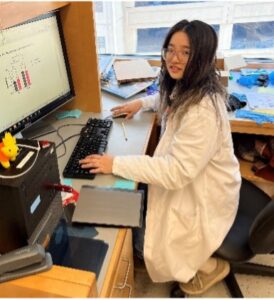 As an intern under Dr. Joseph Jude’s mentorship, I spent the majority of my time working on a largely independent project on HO-1’s role in asthma pathogenesis and its potential as a therapeutic target. I was able to explore directions I was interested in taking the project to, and was given the opportunity to see my project from start to needed steps for completion. For example, much of my later weeks were spent on identifying specific pathways HO-1 could work through. I was particularly curious about which of its downstream products were responsible for its effects on EC coupling. Coming to the lab and designing experiments based on the questions I wanted to ask, carrying out a variety of procedures, and analyzing and presenting my data was incredibly exciting and enjoyable. Help was always available and I often went to my coworkers to navigate the complexities of mechanistic research and brainstorm next steps for my project. Throughout my time at RITMS, I also contributed to pharmaceutical collaborations and joint projects with other research institutes.
As an intern under Dr. Joseph Jude’s mentorship, I spent the majority of my time working on a largely independent project on HO-1’s role in asthma pathogenesis and its potential as a therapeutic target. I was able to explore directions I was interested in taking the project to, and was given the opportunity to see my project from start to needed steps for completion. For example, much of my later weeks were spent on identifying specific pathways HO-1 could work through. I was particularly curious about which of its downstream products were responsible for its effects on EC coupling. Coming to the lab and designing experiments based on the questions I wanted to ask, carrying out a variety of procedures, and analyzing and presenting my data was incredibly exciting and enjoyable. Help was always available and I often went to my coworkers to navigate the complexities of mechanistic research and brainstorm next steps for my project. Throughout my time at RITMS, I also contributed to pharmaceutical collaborations and joint projects with other research institutes.
The best part of my experience was the people I had the opportunity to work with, who have been phenomenal mentors and even better company. I have a great deal of respect for their integrity and their commitment to helping others. Their guidance and infectious positivity were instrumental in my success in achieving my goals. I leave RITMS with a much greater understanding of science, and a much greater desire for future work in research.
Anthony Vivona
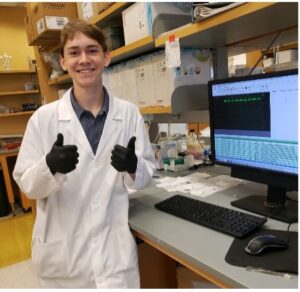 My summer experience at RITMS in the RAP lab under Dr. Cao has been incredibly educational and enjoyable. My research primarily focused on cAMP levels in human airway smooth muscles in order to study airway hyper responsiveness, beta-2 adrenergic receptor desensitization, and excitation-contraction coupling. Through this I learned cell signaling pathways, biostatistics, and laboratory techniques and procedures. I frequently changed cell media, split and treated cells, ran and analyzed western blots and presented my findings at the weekly laboratory meetings. The host of opportunities available to high school students was even greater than I could have anticipated. I loved the hands-on work and really enjoyed the nuance that is loading and transferring western blot gels (especially 3 to 8% TA gels!).
My summer experience at RITMS in the RAP lab under Dr. Cao has been incredibly educational and enjoyable. My research primarily focused on cAMP levels in human airway smooth muscles in order to study airway hyper responsiveness, beta-2 adrenergic receptor desensitization, and excitation-contraction coupling. Through this I learned cell signaling pathways, biostatistics, and laboratory techniques and procedures. I frequently changed cell media, split and treated cells, ran and analyzed western blots and presented my findings at the weekly laboratory meetings. The host of opportunities available to high school students was even greater than I could have anticipated. I loved the hands-on work and really enjoyed the nuance that is loading and transferring western blot gels (especially 3 to 8% TA gels!).
This amazing experience was made possible by the fantastic scientists I got to work with. Most notably, my PI Dr. Cao – whose personality can be aptly characterized by a powerpoint he presented that began with pictures of wild goats he saw on his trip to Spain the week prior during one of our weekly lab meetings – is a humorous, kind, and extremely experienced and knowledgeable scientist. Brian Deeney and Sarah Orfanos are also equally knowledgeable and kind. Their guidance ranged from detailing what certain components of the western blot master mix do, to providing medical advice to another student, Krisha Shah. Other scientists such as Eric Gebski, Cassandra Spector, Joseph Jude, Nikhil Karmacharya, and Cindy Koziol-White are all amazing, patient and passionate scientists who were always willing to explain, educate, and assist me if I ever asked. Special thanks to those that made weekly educational meetings possible that furthered my learning.
Divakaran Manimaran
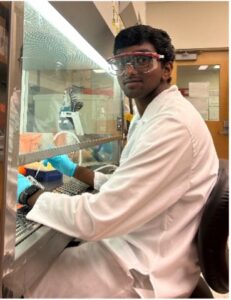 The RITMS experience has undoubtedly been one of the most enjoyable things I have ever participated in. Before starting the program, I expected that the program would be intensive, exhausting, and perhaps a hard work experience. However, while hard work has been a key component of this program, I severely underestimated the enjoyment I would get. Over the last month, my interactions with those who work here, as well as with fellow interns, have come to define my summer, as just genuinely enjoyable and filled with learning. The hands-on experience and independence-guidance balance have been an amazing part of my experience at RITMS, as well as, I have the chance to do the procedures all by myself while still being guided by my lab supervisor.
The RITMS experience has undoubtedly been one of the most enjoyable things I have ever participated in. Before starting the program, I expected that the program would be intensive, exhausting, and perhaps a hard work experience. However, while hard work has been a key component of this program, I severely underestimated the enjoyment I would get. Over the last month, my interactions with those who work here, as well as with fellow interns, have come to define my summer, as just genuinely enjoyable and filled with learning. The hands-on experience and independence-guidance balance have been an amazing part of my experience at RITMS, as well as, I have the chance to do the procedures all by myself while still being guided by my lab supervisor.
I have not only learned what to do, but I have also learned WHY we do it. I have had it explained to me how the primary and secondary antibodies work, how to grow and treat cells, as well as the logic behind the methods. Without a doubt, I have learned far more than I could have expected, and definitely in a more fun and enjoyable way as well. I have no regrets about applying and attending this program and enjoy every moment with the people around me in the lab.
Ethan Chong
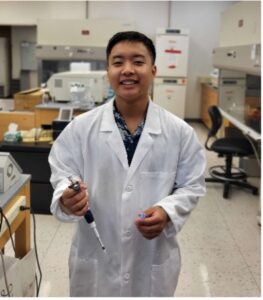 My experience at Rutgers has been an amazing time because I learned so much more about biology and the techniques used to research biology related subjects. When I first arrived, I had only done the most basic biology class in high school, so even basic concepts such as feeding cells and western blotting were huge advances in my knowledge. Furthermore, researching with the An lab has also taught me much more about lung biology and lung related diseases. My time at Rutgers has been a very rewarding and mind blowing experience.
My experience at Rutgers has been an amazing time because I learned so much more about biology and the techniques used to research biology related subjects. When I first arrived, I had only done the most basic biology class in high school, so even basic concepts such as feeding cells and western blotting were huge advances in my knowledge. Furthermore, researching with the An lab has also taught me much more about lung biology and lung related diseases. My time at Rutgers has been a very rewarding and mind blowing experience.
Grace Liu
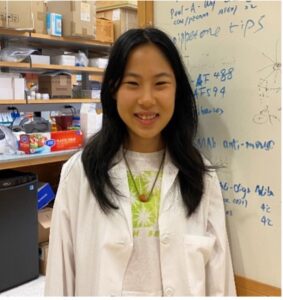 My experience at the Rutgers Institute for Translational Medicine and Science summer research program has been extremely rewarding. As a high school student, opportunities like this one to gain hands-on experience in a professional lab setting are extremely valuable and unique. Under the guidance of Professor Qi Yang and Yuanyue Zhang, I have been able to learn much about the world of research, specifically immunology.
My experience at the Rutgers Institute for Translational Medicine and Science summer research program has been extremely rewarding. As a high school student, opportunities like this one to gain hands-on experience in a professional lab setting are extremely valuable and unique. Under the guidance of Professor Qi Yang and Yuanyue Zhang, I have been able to learn much about the world of research, specifically immunology.
Throughout this program, I was given the opportunity to understand and utilize ideas and techniques that I had previously only known in theory. Despite not having had prior lab experience, the support and patience of everyone in the lab meant that I was able to not only watch and assist but also conduct my own experiments. I was able to explore both neuroimmunology, specifically dementia and how MAIT, and the processes involved including genotyping, antibody staining, and fluorescence imaging. I was even able to cultivate my own cell culture as part of the lab’s work on asthma, specifically ILC2 cells.
Everyone at the lab has been so patient and supportive of me and all the other students, and I am so grateful for this opportunity and the mentors that have opened my eyes to the collaborative and inspiring nature of scientific research.
Lindsay Chong
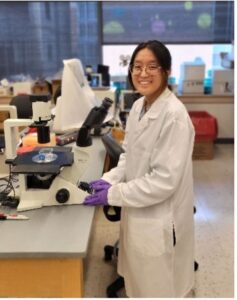 The opportunity of working at RITMS has demonstrated to me how to tackle the undiscovered, what it means to learn, and why it is vital to connect with others within my respective field. Despite entering the lab as an undergraduate computer science major with no prior lab experience, under the guidance of Dr. An, I was shown not only actions necessary for research, such as gathering and analyzing related background information, techniques within the lab, and how to handle data, but also how to improve from errors and how to progress from an experiment’s results. My wet lab experience was focused on cell culture and the role of airway smooth muscle cell biophysics through magnetic twisting cytometry (MTC) experiments. Furthermore, to fit my interests, I conducted an independent study of possible causation between certain lung diseases and hearing loss through Mendelian randomization and R. These two different explorations of research have provided me with a diverse perspective on research and how it can be utilized to fit a variety of topics. Additionally, through my observations at lab meetings and various projects, I realized how collaboration functions as the backbone of research: every team has specialized skills that have the potential to enhance others’ investigations of the unknown. This program has inspired me to contemplate and examine my personal approaches to learning and discovery as well as encourage me to build connections with my peers. I strongly believe that the skills and methods of thinking I have picked up from this program will be amazing assets to my current studies, potential research opportunities, and any other future work on my career path.
The opportunity of working at RITMS has demonstrated to me how to tackle the undiscovered, what it means to learn, and why it is vital to connect with others within my respective field. Despite entering the lab as an undergraduate computer science major with no prior lab experience, under the guidance of Dr. An, I was shown not only actions necessary for research, such as gathering and analyzing related background information, techniques within the lab, and how to handle data, but also how to improve from errors and how to progress from an experiment’s results. My wet lab experience was focused on cell culture and the role of airway smooth muscle cell biophysics through magnetic twisting cytometry (MTC) experiments. Furthermore, to fit my interests, I conducted an independent study of possible causation between certain lung diseases and hearing loss through Mendelian randomization and R. These two different explorations of research have provided me with a diverse perspective on research and how it can be utilized to fit a variety of topics. Additionally, through my observations at lab meetings and various projects, I realized how collaboration functions as the backbone of research: every team has specialized skills that have the potential to enhance others’ investigations of the unknown. This program has inspired me to contemplate and examine my personal approaches to learning and discovery as well as encourage me to build connections with my peers. I strongly believe that the skills and methods of thinking I have picked up from this program will be amazing assets to my current studies, potential research opportunities, and any other future work on my career path.
Krisha Shah
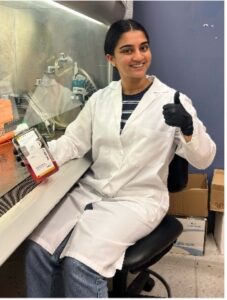 My time at the Rutgers Institute for Translational Medicine has been very rewarding and impactful. I started in April 2023, working full time as an intern from Drexel University. Throughout my time here, I have learned a variety of scientific and professional skills that have fostered my growth as a young scientist. I am incredibly grateful for the supportive staff, collaborative environment, and fascinating research that I have experienced in the Panettieri lab.
My time at the Rutgers Institute for Translational Medicine has been very rewarding and impactful. I started in April 2023, working full time as an intern from Drexel University. Throughout my time here, I have learned a variety of scientific and professional skills that have fostered my growth as a young scientist. I am incredibly grateful for the supportive staff, collaborative environment, and fascinating research that I have experienced in the Panettieri lab.
Dylan Gray
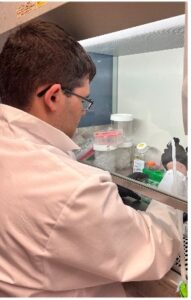 The RITMS summer research program has been an eye opener and a game changer. Working under Dr. Cynthia Koziol-White and Eric Gebski I have been able to refine and advance my lab technique, through performing serum deprivation aseptically, running western blots, and analyzing data from experiments. While I made a number of mistakes along the way, I learned every time I made one, and was able to use that experience to work faster and more precisely as the weeks went by.
The RITMS summer research program has been an eye opener and a game changer. Working under Dr. Cynthia Koziol-White and Eric Gebski I have been able to refine and advance my lab technique, through performing serum deprivation aseptically, running western blots, and analyzing data from experiments. While I made a number of mistakes along the way, I learned every time I made one, and was able to use that experience to work faster and more precisely as the weeks went by.
The weekly lectures and lab meetings have been rewarding learning experiences. The lectures covered important aspects of science: from learning about how the scientific method is applied in practice, to how various statistical tools are commonly misused in science. They also helped contextualize the complicated information presented at lab meetings by giving us background in certain pathways widely used in the lab. I also analyzed scientific articles, some that were given to me and some I found myself, to help me further my understanding of what was discussed. In the lab meetings, I could see the passion people presented their results with, and had the opportunity to be exposed to how labs really work. I was also able to present my data to the lab, and had to try to analyze it and make conclusions, which served as a good introduction to science communication.
Overall, my experience in the Panettieri lab has been an amazing one that I am so fortunate to have been able to experience. From seeing how research is really done, to learning proper techniques for procedures, I’ve gained so much from attending this program and I’m excited to use what I have learned in future research. I would highly recommend this program for students passionate about science.
Hyerim Son
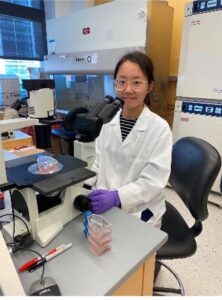 This summer program provided me a unique and meaningful experience. Working with my advisor and other lab members, allowed me to watch what studies were going on in the lab and actually participate in them too. I was not just left to read research articles but I was able to work at the lab bench and be a part of some of the ongoing projects. Through this program, I was able to apply the molecular biology knowledge I had learned in the classroom to the experiments I was actually performing. I would highly recommend this program to anyone interested in science and that is looking for rewarding and meaningful hands on experience.
This summer program provided me a unique and meaningful experience. Working with my advisor and other lab members, allowed me to watch what studies were going on in the lab and actually participate in them too. I was not just left to read research articles but I was able to work at the lab bench and be a part of some of the ongoing projects. Through this program, I was able to apply the molecular biology knowledge I had learned in the classroom to the experiments I was actually performing. I would highly recommend this program to anyone interested in science and that is looking for rewarding and meaningful hands on experience.
Jared Featherston
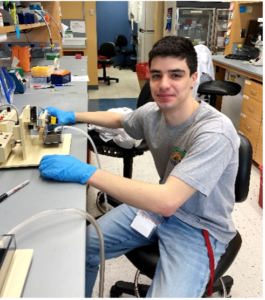 My experience at Rutgers Institute for Translational Medicine and Science (RITMS) has been one unlike any other. Having little experience upon joining the team, I have grown an enormous amount during my time at the institute. Never before have I had the opportunity or resources to autonomously design and execute experiments with real scientific significance, discuss my finding with a group of highly educated and motivated individuals, and develop follow-up research questions and goals following positive or negative results; I could not be more grateful to RITMS for providing me with an opportunity to do so. The collaborative environment in the lab not only facilitates but also accelerates the learning process. Through concrete experience, reflective observation, abstract conceptualization, and active experimentation I have personally cultivated an augmented sense for critical thinking and scientific inspiration—none of which could have been realized without the faculty and resources of RITMS.
My experience at Rutgers Institute for Translational Medicine and Science (RITMS) has been one unlike any other. Having little experience upon joining the team, I have grown an enormous amount during my time at the institute. Never before have I had the opportunity or resources to autonomously design and execute experiments with real scientific significance, discuss my finding with a group of highly educated and motivated individuals, and develop follow-up research questions and goals following positive or negative results; I could not be more grateful to RITMS for providing me with an opportunity to do so. The collaborative environment in the lab not only facilitates but also accelerates the learning process. Through concrete experience, reflective observation, abstract conceptualization, and active experimentation I have personally cultivated an augmented sense for critical thinking and scientific inspiration—none of which could have been realized without the faculty and resources of RITMS.
While I am less than enthused to see my time at the institute end, I am eager to apply my newly acquired skills and knowledge to my college courses and experiences. I am certain that the laboratory techniques, critical thinking, experimental strategy, and overall scientific knowledge I have acquired as a co-op will prove to be critical as I finish my time as an undergraduate.
Adam Tseng
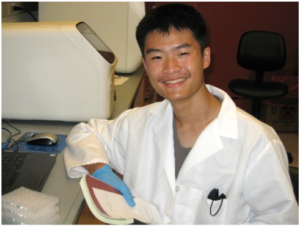 Conducting asthma research through the Rutgers Institute for Translational Medicine and Science (RITMS) Summer Research Program was a transformative experience. Throughout the summer, I investigated the differences in post-transcriptional regulation of PFKFB3, a gene more highly expressed in obese asthma patients as compared to their non-obese counterparts. To study this gene and what factors influence its expression levels, I ran Western blots and PCRs to evaluate the effects of different treatments on the PFFKB3 levels of obese and non-obese patients. I also cultured cells and acquired slices of lung tissue for my experiments. Under the mentorship of the principal investigator, Dr. Joseph Jude, I was able to run my own experiments and pursue my own research project with greater independence. Part of this independence also meant taking accountability for my research by documenting it in regular write-ups. During weekly lab meetings, I was able to present my experiments to the rest of the lab and then learn about the different exciting projects that were being pursued by other researchers. Even when I was not running an experiment, my mentor encouraged me to review the literature pertaining to my research area and understand the conceptual significance of my work and underlying mechanisms of laboratory procedures. I also received opportunities to learn from the other students in the lab by observing their experiments, which ranged from siRNA transfections to calcium assays. For these reasons and more, I believe that RITMS has provided me with the skills, knowledge, and confidence to realize my future academic and career aspirations in science and medicine.
Conducting asthma research through the Rutgers Institute for Translational Medicine and Science (RITMS) Summer Research Program was a transformative experience. Throughout the summer, I investigated the differences in post-transcriptional regulation of PFKFB3, a gene more highly expressed in obese asthma patients as compared to their non-obese counterparts. To study this gene and what factors influence its expression levels, I ran Western blots and PCRs to evaluate the effects of different treatments on the PFFKB3 levels of obese and non-obese patients. I also cultured cells and acquired slices of lung tissue for my experiments. Under the mentorship of the principal investigator, Dr. Joseph Jude, I was able to run my own experiments and pursue my own research project with greater independence. Part of this independence also meant taking accountability for my research by documenting it in regular write-ups. During weekly lab meetings, I was able to present my experiments to the rest of the lab and then learn about the different exciting projects that were being pursued by other researchers. Even when I was not running an experiment, my mentor encouraged me to review the literature pertaining to my research area and understand the conceptual significance of my work and underlying mechanisms of laboratory procedures. I also received opportunities to learn from the other students in the lab by observing their experiments, which ranged from siRNA transfections to calcium assays. For these reasons and more, I believe that RITMS has provided me with the skills, knowledge, and confidence to realize my future academic and career aspirations in science and medicine.
Anastasia Ibrahim
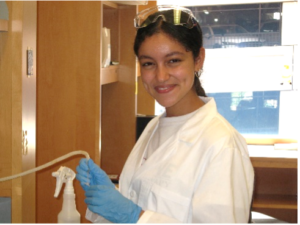 My experience at Rutgers Institute for Translational Medicine and Science (RITMS) was nothing short of phenomenal. From performing online experiments in my Biology class at the height of COVID-19 to creating and analyzing western blots within my first two weeks at the RITMS Summer Research Program, I went from learning about complex molecular structures and bodily functions to performing my own experiments and learning various techniques within the laboratory. I learned how to make western blots, perform calcium assays, treat cells, and along the way, learned about pathways involved in asthma. In my time at RITMS, under the mentorship of Dr. Joseph Jude, I looked at cellular responses in both obese and non-obese Human Asthmatic Smooth Muscle cells in producing proteins, such as HIF-1a, Tubulin, pMLC, MLC, GPR91, PFKB3 etc., in response to various treatments. In weekly lab meetings, I was given the opportunity to present my research findings to Dr. Panettieri and gained supportive feedback and encouragement for further research.
My experience at Rutgers Institute for Translational Medicine and Science (RITMS) was nothing short of phenomenal. From performing online experiments in my Biology class at the height of COVID-19 to creating and analyzing western blots within my first two weeks at the RITMS Summer Research Program, I went from learning about complex molecular structures and bodily functions to performing my own experiments and learning various techniques within the laboratory. I learned how to make western blots, perform calcium assays, treat cells, and along the way, learned about pathways involved in asthma. In my time at RITMS, under the mentorship of Dr. Joseph Jude, I looked at cellular responses in both obese and non-obese Human Asthmatic Smooth Muscle cells in producing proteins, such as HIF-1a, Tubulin, pMLC, MLC, GPR91, PFKB3 etc., in response to various treatments. In weekly lab meetings, I was given the opportunity to present my research findings to Dr. Panettieri and gained supportive feedback and encouragement for further research.
Under Dr. Jude and the team here at RITMS, I was able to expand my knowledge, furthering my interest in research. Previously, in my former science classes, I was not exposed to the different techniques involved in biomedical research; however, this lab offered me the opportunity to further my comprehension in both research and the pathophysiology of asthma. My experience at RITMS was very rewarding and this invaluable experience will most definitely resonate in my future career.
Tyler Wu
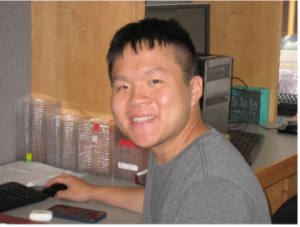 My Rutgers Institute for Translational Medicine and Science (RITMS) experience was a very educational experience that largely enhanced my understanding of both biochemistry and what it means to work in a lab. I learned a great deal about cell signaling pathways and the biochemical procedures that researchers use to investigate them. From learning the process of subculturing and maintaining cell lines to performing Western Blots and cAMP assays, I have become much more knowledgeable in the techniques and equipment used in the lab, which I know will help me in any other lab I may work in later on. Aside from wet lab techniques, I have also learned the importance of organization and presentation. Because there are so many procedures and materials to keep track of, I had to work on keeping everything organized and keeping track of exactly what I had done, in case my experiments were to be replicated in the future. The weekly lab meetings were also helpful in teaching me how to present my data to others in a concise and informative way.
My Rutgers Institute for Translational Medicine and Science (RITMS) experience was a very educational experience that largely enhanced my understanding of both biochemistry and what it means to work in a lab. I learned a great deal about cell signaling pathways and the biochemical procedures that researchers use to investigate them. From learning the process of subculturing and maintaining cell lines to performing Western Blots and cAMP assays, I have become much more knowledgeable in the techniques and equipment used in the lab, which I know will help me in any other lab I may work in later on. Aside from wet lab techniques, I have also learned the importance of organization and presentation. Because there are so many procedures and materials to keep track of, I had to work on keeping everything organized and keeping track of exactly what I had done, in case my experiments were to be replicated in the future. The weekly lab meetings were also helpful in teaching me how to present my data to others in a concise and informative way.
The people I have met throughout my RITMS experience were also incredibly nice and welcoming people. My mentor, Dr. Sarah Orfanos, was very knowledgeable about her research topic and was a very understanding person, walking me step-by-step through all of the experimental procedures and encouraging me despite mistakes I made. The other researchers also helped show me around and helped answer questions I had regarding my experiments. The other summer interns were also friendly and driven people that shared many of the same interests I have. Overall, I really enjoyed my time at RITMS and meeting new people there.
Akhil Patel
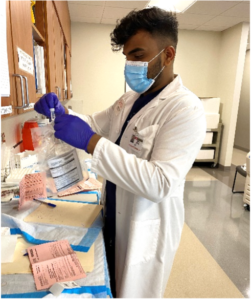 RITMS has been of the best experiences of my professional career. Working for Rutgers Institute for Translational Medicine and Science (RITMS) and the Rutgers Clinical Research Center (CRC) showed me a different side of medicine and science in general. RITMS granted me the opportunity to take research into my own hands allowing me to learn, apply, and perform experiments using different techniques and methods. The Rutgers CRC showed me an alternative side to medicine besides working in a hospital setting. It was a great way to become familiar with a new side of medicine and learn how clinical trials for new vaccinations and medications work. It is an amazing opportunity to learn how the different trials and phases progress. Since I started here in March, I have seen tremendous growth within myself. I started taking on more challenging tasks and accepting any opportunity, they have offered me here. I would not trade this experience and growth for anything.
RITMS has been of the best experiences of my professional career. Working for Rutgers Institute for Translational Medicine and Science (RITMS) and the Rutgers Clinical Research Center (CRC) showed me a different side of medicine and science in general. RITMS granted me the opportunity to take research into my own hands allowing me to learn, apply, and perform experiments using different techniques and methods. The Rutgers CRC showed me an alternative side to medicine besides working in a hospital setting. It was a great way to become familiar with a new side of medicine and learn how clinical trials for new vaccinations and medications work. It is an amazing opportunity to learn how the different trials and phases progress. Since I started here in March, I have seen tremendous growth within myself. I started taking on more challenging tasks and accepting any opportunity, they have offered me here. I would not trade this experience and growth for anything.
Andrew Cho
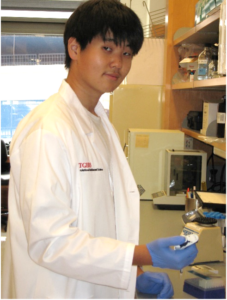 The summer research program at Rutgers Institute for Translational Medicine and Science was nothing short of incredible. Under Dr. An, I was able to learn and use many lab techniques and procedures. From assisting others to being able to run my own experience, I was able to grow my understanding on this field of research. I learned and ran not only common techniques such as running a western blot and protein assays, but also techniques specific to this field such as magnetic twisting cytometry (MTC). I was also able to work with my colleagues as a team, which allowed us to share our opinions and help one another to produce better results. This experience not only grew my understanding and excitement towards this study but it also allowed me to grow as a person. I look forward to working in this lab again.
The summer research program at Rutgers Institute for Translational Medicine and Science was nothing short of incredible. Under Dr. An, I was able to learn and use many lab techniques and procedures. From assisting others to being able to run my own experience, I was able to grow my understanding on this field of research. I learned and ran not only common techniques such as running a western blot and protein assays, but also techniques specific to this field such as magnetic twisting cytometry (MTC). I was also able to work with my colleagues as a team, which allowed us to share our opinions and help one another to produce better results. This experience not only grew my understanding and excitement towards this study but it also allowed me to grow as a person. I look forward to working in this lab again.
Jessica Moore
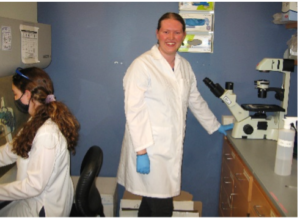 The Rutgers Institute for Translational Medicine and Science Summer Program has been an immersive and enriching experience into the world of translational research. Since my first day, everyone at the lab has been welcoming and willing to offer instruction and advice. After a few weeks of shadowing and learning the steps for various assays, I was given more independence to complete tasks on my own. I have added to my skill set by learning how to culture cells, slice lungs, treat cells, run Western blots, and more. Alongside learning wet lab techniques, I have gained critical analysis skills by using statistical measures to understand the experimental data.
The Rutgers Institute for Translational Medicine and Science Summer Program has been an immersive and enriching experience into the world of translational research. Since my first day, everyone at the lab has been welcoming and willing to offer instruction and advice. After a few weeks of shadowing and learning the steps for various assays, I was given more independence to complete tasks on my own. I have added to my skill set by learning how to culture cells, slice lungs, treat cells, run Western blots, and more. Alongside learning wet lab techniques, I have gained critical analysis skills by using statistical measures to understand the experimental data.
In addition to gaining invaluable skills, I have been given the opportunity to explore my passion for medical research. I have been provided with the tools to learn in depth about cell signaling pathways involved with various pulmonary diseases, and how different agonists affect them. Accompanying that, every week I complete an experiment testing drugs to learn about their impacts on pathways, and then I present on the results I have analyzed. This has increased my confidence while presenting and deepened my understanding of the topic. Overall, the experiences I have had throughout the RITMS summer program have given me a unique insight into potential career paths and have allowed me to make meaningful connections with experts in the health science field.
Alexis Czerhoniak
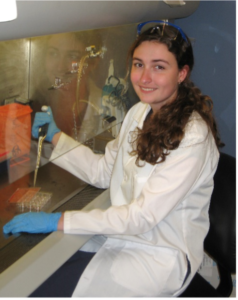 This spring/summer I was given the opportunity to work at the Rutgers University Panettieri lab. A part of the Rutgers Institute for Translational Medicine and Science, this lab specializes in asthma and other pulmonary disease research, in the hopes of generating scientific discoveries that can create new therapeutics and a better understanding of molecular pathways. I worked closely with other researchers and learned a lot in terms of cell culture, immunological assays, and lab maintenance.
This spring/summer I was given the opportunity to work at the Rutgers University Panettieri lab. A part of the Rutgers Institute for Translational Medicine and Science, this lab specializes in asthma and other pulmonary disease research, in the hopes of generating scientific discoveries that can create new therapeutics and a better understanding of molecular pathways. I worked closely with other researchers and learned a lot in terms of cell culture, immunological assays, and lab maintenance.
Under the guidance of Dr. Joseph Jude, I was able to perform my own exploratory research experiments focusing on the metabolomic differences found between asthmatic and non-asthmatic lung donors. Succinate was our primary metabolite, and we observed its effect with IL-13 and IL-4 cytokines on pSTAT3, pMLC, and the succinate receptor itself (GPR91). The data was presented at the beginning of each week during lab meetings and was subject to feedback on what to do moving forward. I cannot emphasize more than enough how grateful I am for the support and welcoming environment. Being able to converse with other researchers in and out of meetings made my efforts and my curiosity truly feel appreciated.
It can be intimidating at first coming into this lab but the amount you learn compared to a classroom is invaluable. I can now confidently perform and analyze Western blots, split and culture cells, and perform other molecular biology techniques.
Akhil Patel
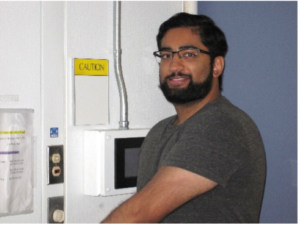 My experience at Rutgers Institute for Translational Medicine and Science (RITMS) this summer was very enjoyable. As a current medical student, I believe that performing meaningful research is an integral aspect of a medical education. In addition to helping me learn to perform common bench techniques such as Western Blots and PCRs, working at RITMS also allowed me to develop my ability to identify any issues encountered in an experiment and troubleshoot them by finding information in various online databases and textbooks. Additionally, spending hours in the company of the experienced and distinguished faculty at RITMS allowed me to learn valuable information about the administrative side of conducting research. I am certain that my experience at RITMS will benefit me in my future career as a physician.
My experience at Rutgers Institute for Translational Medicine and Science (RITMS) this summer was very enjoyable. As a current medical student, I believe that performing meaningful research is an integral aspect of a medical education. In addition to helping me learn to perform common bench techniques such as Western Blots and PCRs, working at RITMS also allowed me to develop my ability to identify any issues encountered in an experiment and troubleshoot them by finding information in various online databases and textbooks. Additionally, spending hours in the company of the experienced and distinguished faculty at RITMS allowed me to learn valuable information about the administrative side of conducting research. I am certain that my experience at RITMS will benefit me in my future career as a physician.
Alexandra Heck
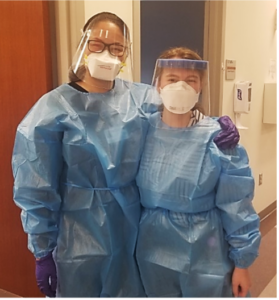 Working in clinical research at Rutgers Institute for Translational Medicine and Science has been an enriching experience. I have learned so much about this sector of healthcare that I would have otherwise been oblivious to. I have been able to work on the most current and cutting-edge research, such as the J&J Covid-19 Vaccine and the Pediatric Pfizer Covid-19 Vaccine. We were able to experience the successes but also the failures of research both of which helps facilitate knowledge. The Clinical Research Center is a supportive environment that allows for independence and growth for all employees. I have been able to foster skills like teamwork and communication, working with our patients as well as our doctors, nurses, coordinators, and other research assistants on the floor. Clinical research is a wonderful balance of new science with existing healthcare that has been a joy to work in. I have enjoyed the job so much that I came back for a second time!
Working in clinical research at Rutgers Institute for Translational Medicine and Science has been an enriching experience. I have learned so much about this sector of healthcare that I would have otherwise been oblivious to. I have been able to work on the most current and cutting-edge research, such as the J&J Covid-19 Vaccine and the Pediatric Pfizer Covid-19 Vaccine. We were able to experience the successes but also the failures of research both of which helps facilitate knowledge. The Clinical Research Center is a supportive environment that allows for independence and growth for all employees. I have been able to foster skills like teamwork and communication, working with our patients as well as our doctors, nurses, coordinators, and other research assistants on the floor. Clinical research is a wonderful balance of new science with existing healthcare that has been a joy to work in. I have enjoyed the job so much that I came back for a second time!
Noah Goodman
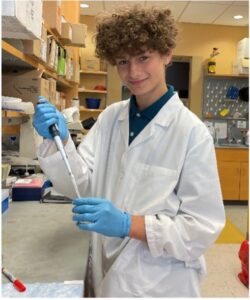 At Rutgers Institute for Translational Medicine and Science (RITMS), I have been given the opportunity to learn and use so many lab procedures. For example, by the end of my first month here I had already watched, learned how to run, and completed a Western Blot. I was also assigned my own cell lines for which I changed culture media weekly before treating. From being able to run my own experiments, I learned important laboratory skills such as liquid pipetting, treatment buffering, cell scraping, and solution aspirating. I also learned how to use a microcentrifuge, PCR machine, and a vortex machine.
At Rutgers Institute for Translational Medicine and Science (RITMS), I have been given the opportunity to learn and use so many lab procedures. For example, by the end of my first month here I had already watched, learned how to run, and completed a Western Blot. I was also assigned my own cell lines for which I changed culture media weekly before treating. From being able to run my own experiments, I learned important laboratory skills such as liquid pipetting, treatment buffering, cell scraping, and solution aspirating. I also learned how to use a microcentrifuge, PCR machine, and a vortex machine.
I not only learned how to perform experiments like a researcher but also how to think like one. Studying under Professor Gaoyuan Cao has allowed me to understand why each step of the experimental procedure that we use is performed in the manner that it is and how the way in which each step is completed will affect the overall results of the experiment. Overall, at RITMS I was given the perfect balance of instruction and freedom, which allowed me to learn how to feel comfortable in the lab environment and be prepared for lab work in the future.
Alexander Vallarta
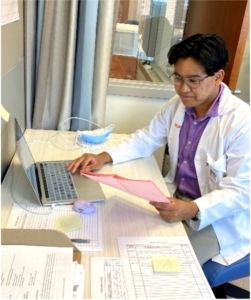 My work is a little different from others’ in the Panettieri lab. I am a Clinical Research Assistant, so I work primarily out of the Rutgers Clinical Research Center (CRC) under the supervision of Bill Russell, Rutgers Institute for Translational Medicine and Science (RITMS) clinical research director. In the CRC, we work on clinical trials that contribute to the future of medicine. Notably, I have been working on the Janssen ENSEMBLE COVID-19 Vaccine Trial, which tests the efficacy of the J&J COVID-19 Vaccine. I work extensively with trial participants and their samples, such as their blood, collected nasal swabs, or saliva. In addition, I am responsible for many types of data entry, including participant visits, COVID test outcomes, and participant payment/compensation. Besides my work in clinical studies, it is also my responsibility to keep the CRC running smoothly, filing charts, and general maintenance is a very important part of my job. My experience at RITMS and the CRC has been of immense value. Seeing the back end of clinical research and how everyone contributes to it has been fulfilling and helped me illuminate my goals further.
My work is a little different from others’ in the Panettieri lab. I am a Clinical Research Assistant, so I work primarily out of the Rutgers Clinical Research Center (CRC) under the supervision of Bill Russell, Rutgers Institute for Translational Medicine and Science (RITMS) clinical research director. In the CRC, we work on clinical trials that contribute to the future of medicine. Notably, I have been working on the Janssen ENSEMBLE COVID-19 Vaccine Trial, which tests the efficacy of the J&J COVID-19 Vaccine. I work extensively with trial participants and their samples, such as their blood, collected nasal swabs, or saliva. In addition, I am responsible for many types of data entry, including participant visits, COVID test outcomes, and participant payment/compensation. Besides my work in clinical studies, it is also my responsibility to keep the CRC running smoothly, filing charts, and general maintenance is a very important part of my job. My experience at RITMS and the CRC has been of immense value. Seeing the back end of clinical research and how everyone contributes to it has been fulfilling and helped me illuminate my goals further.
Siheun Lee
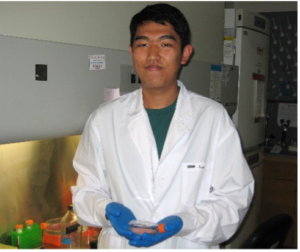 I am a month into my student intern program at Rutgers Institute for Translational Medicine and Science. Even though I am currently halfway through the program, it has already been an immensely valuable experience. Working in Dr. An’s lab has been very informative as the lab equipment used is quite uncommon and a unique way to measure cell motions and stiffness. Dr. An also assigned intern students to specific projects so that we could take a more active role in the research. I was able to carry out various experiments that were related to clinical research such as siRNA transfection, drug treatments, and treatment optimization. It was a great hands-on learning experience since the experiments had procedures I had only seen done in textbooks. In addition, many of the basic lab procedures I regularly did; cell culture, passaging cells, making Western blots, and cell counting are fundamental processes of any biological lab. Practicing them will benefit me in the future, as I plan to pursue a career in research.
I am a month into my student intern program at Rutgers Institute for Translational Medicine and Science. Even though I am currently halfway through the program, it has already been an immensely valuable experience. Working in Dr. An’s lab has been very informative as the lab equipment used is quite uncommon and a unique way to measure cell motions and stiffness. Dr. An also assigned intern students to specific projects so that we could take a more active role in the research. I was able to carry out various experiments that were related to clinical research such as siRNA transfection, drug treatments, and treatment optimization. It was a great hands-on learning experience since the experiments had procedures I had only seen done in textbooks. In addition, many of the basic lab procedures I regularly did; cell culture, passaging cells, making Western blots, and cell counting are fundamental processes of any biological lab. Practicing them will benefit me in the future, as I plan to pursue a career in research.
Outside of the lab, the past month has been great for leisure and travel as well. New Jersey is only about an hour away from New York, and I have been making the most of my weekends while staying in New Brunswick. I went on trips to Philadelphia and Manhattan, both of which were greatly entertaining. I plan to make the most of my stay by eating good food, experiencing the culture, and visiting other places like Newark and Brooklyn. Overall, my summer experience at Rutgers has been a remarkable one, both inside and outside of the lab.
Jinsun Lee
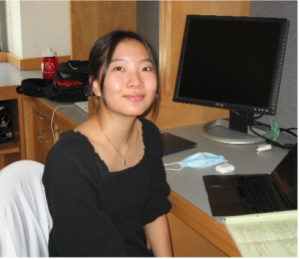 Everyone’s passion for his or her research was really inspiring! It was fascinating to observe other labs present their current progress on their research during the weekly lab meetings. Through the Rutgers Institute for Translational Medicine and Science Summer Research program, I also gained invaluable insight on how laboratories work and operate. As a rising senior in high school, this program was extremely helpful in deciding what major I want to pursue in the coming years and which colleges to apply to this upcoming fall.
Everyone’s passion for his or her research was really inspiring! It was fascinating to observe other labs present their current progress on their research during the weekly lab meetings. Through the Rutgers Institute for Translational Medicine and Science Summer Research program, I also gained invaluable insight on how laboratories work and operate. As a rising senior in high school, this program was extremely helpful in deciding what major I want to pursue in the coming years and which colleges to apply to this upcoming fall.
Timothy Cho
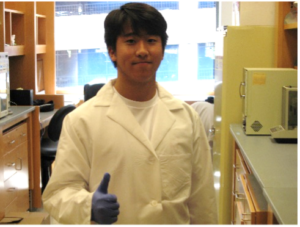 Prior to joining the program, I was quite unsure about my interest in the biology/medicine field. I came from an engineering background, but since I wanted to explore my options, I applied. After a month of meeting new people and working with them within hands-on cell culture lab experiences, my eyes have opened up to the different careers I would like to pursue. Through this program, I have already made good memories and learned various communicative skills while interacting with the other lab members. I am very thankful to Rutgers Institute for Translational Medicine and Science for giving me this opportunity to grow in great ways.
Prior to joining the program, I was quite unsure about my interest in the biology/medicine field. I came from an engineering background, but since I wanted to explore my options, I applied. After a month of meeting new people and working with them within hands-on cell culture lab experiences, my eyes have opened up to the different careers I would like to pursue. Through this program, I have already made good memories and learned various communicative skills while interacting with the other lab members. I am very thankful to Rutgers Institute for Translational Medicine and Science for giving me this opportunity to grow in great ways.
Marisa Reed
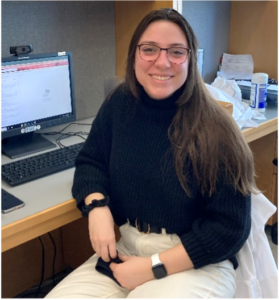 During my time working at the Rutgers Institute for Translational Medicine and Science (RITMS), I had the chance to learn a lot and grow as a scientist. I had the chance to learn and observe different experimental techniques, understand the process of designing an experiment and got the chance to carry it out, had the chance to expand on my critical thinking, problem-solving, and public speaking skills, and deeply understand the array of topics and concepts from my own studies as well as others’ projects in the lab.
During my time working at the Rutgers Institute for Translational Medicine and Science (RITMS), I had the chance to learn a lot and grow as a scientist. I had the chance to learn and observe different experimental techniques, understand the process of designing an experiment and got the chance to carry it out, had the chance to expand on my critical thinking, problem-solving, and public speaking skills, and deeply understand the array of topics and concepts from my own studies as well as others’ projects in the lab.
It was an honor to work with so many amazing scientists during this experience and to help produce scientifically significant results alongside them. I really enjoyed my experience at the RITMS and will miss going in every week. However, I am also excited to see how my time at the RITMS will translate into my academic career.
Carlie Relyea
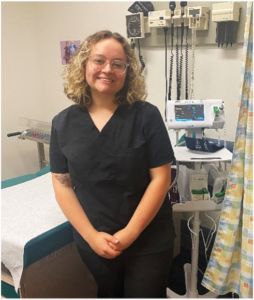 I have greatly enjoyed my time at the Rutgers Institute for Translational Medicine and Science as a clinical research assistant. I have done two spring-summer co-ops with the department, and I have gained valuable experience for my future career. Working in the RITMS provides you with excellent mentors that are constantly challenging you to grow personally and professionally. I have loved my time in the Pediatric Clinical Research center, and this co-op has shown me that I want to incorporate clinical research into my career.
I have greatly enjoyed my time at the Rutgers Institute for Translational Medicine and Science as a clinical research assistant. I have done two spring-summer co-ops with the department, and I have gained valuable experience for my future career. Working in the RITMS provides you with excellent mentors that are constantly challenging you to grow personally and professionally. I have loved my time in the Pediatric Clinical Research center, and this co-op has shown me that I want to incorporate clinical research into my career.
You Jin Lee
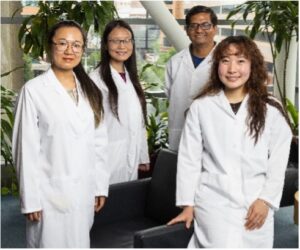 This summer research program was an experience that provided insight into what laboratory environments can look like. Not only was I able to observe how my own lab group operated, I was also able to gain insight into the other various lab groups and their research focuses during weekly lab meetings. It was interesting to see how lab groups could operate in so many different yet similar ways. I was able to spend time learning how to read research papers effectively and efficiently. I also spent the majority of my time during the program studying how to use R, a programming language for statistical computing and graphics. It was definitely difficult trying to pick up a programming language that I had no prior knowledge in, but I believe that I was able to get as much out of the program as the effort I put in. It would have been nice if I was able to split my time between studying R programming and participating in performing experiments so that I could have gotten wet lab experience as well, but R programming was still a very valuable skill I have learned. I believe that if I had background knowledge in statistics or programming, I could have understood my project better. My time here has encouraged me to take classes in statistical programming once the fall semester resumes.
This summer research program was an experience that provided insight into what laboratory environments can look like. Not only was I able to observe how my own lab group operated, I was also able to gain insight into the other various lab groups and their research focuses during weekly lab meetings. It was interesting to see how lab groups could operate in so many different yet similar ways. I was able to spend time learning how to read research papers effectively and efficiently. I also spent the majority of my time during the program studying how to use R, a programming language for statistical computing and graphics. It was definitely difficult trying to pick up a programming language that I had no prior knowledge in, but I believe that I was able to get as much out of the program as the effort I put in. It would have been nice if I was able to split my time between studying R programming and participating in performing experiments so that I could have gotten wet lab experience as well, but R programming was still a very valuable skill I have learned. I believe that if I had background knowledge in statistics or programming, I could have understood my project better. My time here has encouraged me to take classes in statistical programming once the fall semester resumes.
Anisha Tyagi
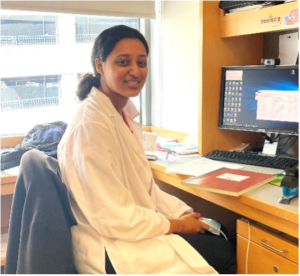 Getting hands on exposure in research is something that can be difficult to access at any point in a student’s career. Thus, I was incredibly grateful for Dr. Panettieri and Dr. Koziol-White for allowing me the opportunity of performing protocols and running experiments at Rutgers Institute for Translational Medicine and Science (RITMS). Throughout the summer, I was able to conduct various protocols, learn basic science skills, and present in weekly lab meetings, all skills that will come in handy as I continue to pursue various research projects. By interacting with other students, post-docs, and professors at the lab, I was able to learn far more about pulmonology and translational science from the abundance of ongoing projects at the lab. I am truly grateful for this experience and hope other students continue to apply to work at RITMS!
Getting hands on exposure in research is something that can be difficult to access at any point in a student’s career. Thus, I was incredibly grateful for Dr. Panettieri and Dr. Koziol-White for allowing me the opportunity of performing protocols and running experiments at Rutgers Institute for Translational Medicine and Science (RITMS). Throughout the summer, I was able to conduct various protocols, learn basic science skills, and present in weekly lab meetings, all skills that will come in handy as I continue to pursue various research projects. By interacting with other students, post-docs, and professors at the lab, I was able to learn far more about pulmonology and translational science from the abundance of ongoing projects at the lab. I am truly grateful for this experience and hope other students continue to apply to work at RITMS!
Geunhui Shin
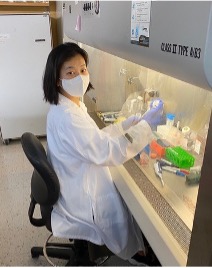 Working as an intern at Dr. An’s lab this summer was a precious experience. Not only did people at his lab teach me a lot about technical skills, but Dr. An also allowed me to drive my own project. This experience, in particular, taught me how to think, plan, and troubleshoot like a scientist. After learning protocols, I did the experiments and presented data to the entire department lab meeting. As I received comments after the presentation from many people who have been studying in this field for a long time, I could have a chance to grow my insight when interpreting the data. Overall, I can confidently say that this internship experience became a milestone for my future career path.
Working as an intern at Dr. An’s lab this summer was a precious experience. Not only did people at his lab teach me a lot about technical skills, but Dr. An also allowed me to drive my own project. This experience, in particular, taught me how to think, plan, and troubleshoot like a scientist. After learning protocols, I did the experiments and presented data to the entire department lab meeting. As I received comments after the presentation from many people who have been studying in this field for a long time, I could have a chance to grow my insight when interpreting the data. Overall, I can confidently say that this internship experience became a milestone for my future career path.
Tracy Lu
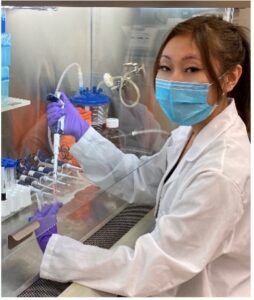 Working at RITMS has been an unmatched opportunity that offers top-tier lab experiences, as well as exceptional mentorship. I arrived to this lab with only college lab experience under my belt, but was then introduced to cellular mechanics and the field of biophysics through the technology of Magnetic Twisting Cytometry (MTC). Despite my inexperience, the RITMS community, notably Dr. Steven An, Hong Lam and Nicholas Kim, helped me through everything without judgement. With every mistake that I made, I was given a chance to correct them. With every challenge I had, I was given guidance on how to solve them.
Working at RITMS has been an unmatched opportunity that offers top-tier lab experiences, as well as exceptional mentorship. I arrived to this lab with only college lab experience under my belt, but was then introduced to cellular mechanics and the field of biophysics through the technology of Magnetic Twisting Cytometry (MTC). Despite my inexperience, the RITMS community, notably Dr. Steven An, Hong Lam and Nicholas Kim, helped me through everything without judgement. With every mistake that I made, I was given a chance to correct them. With every challenge I had, I was given guidance on how to solve them.
While working under Dr. An’s supervision, I was given independence to plan and run my own experiments pertaining to a project involving Alzheimer’s Disease and mouse vascular smooth muscle cells. In this project, I was able to perform and shadow various experiments such as traction, MTC, cell proliferation measurement, etc. During the weekly lab meetings, I am given a chance to present my project findings and am always met by encouragement, notably by Dr. Reynold Panettieri.
Being at the lab has not only taught me the experiment protocols, but has also taught me time management, organization, and hard work. These important life skills have transferred over to my personal life and given me a new sense of confidence.
Anjani Ravi
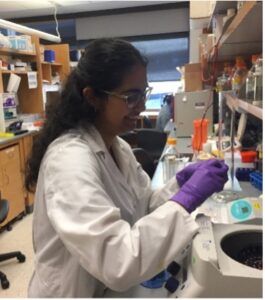 My time as a student at RITMS has been nothing short of excellent. I have learned new skills and concepts every day, and the environment is such that I look forward to coming in the next day. Whether it is to be with the people again or to see if my experiment yielded interesting results, there is always excitement waiting at the lab. Being able to present at weekly lab meetings also taught me to share data with clarity and incorporate feedback to plan future directives. Aside from gaining a great amount of knowledge about efficient scientific practice and lung cell signaling, there is also much to learn from each person here. The lab is full of brilliant scientists with unique backgrounds. They are experts in their disciplines and motivated by niche interests; despite their many accomplishments, everyone is very approachable and always willing to help. With three teams working in the lab, there are constantly collaborative, as well as, independent ongoing projects, and thus never-ending opportunities to learn.
My time as a student at RITMS has been nothing short of excellent. I have learned new skills and concepts every day, and the environment is such that I look forward to coming in the next day. Whether it is to be with the people again or to see if my experiment yielded interesting results, there is always excitement waiting at the lab. Being able to present at weekly lab meetings also taught me to share data with clarity and incorporate feedback to plan future directives. Aside from gaining a great amount of knowledge about efficient scientific practice and lung cell signaling, there is also much to learn from each person here. The lab is full of brilliant scientists with unique backgrounds. They are experts in their disciplines and motivated by niche interests; despite their many accomplishments, everyone is very approachable and always willing to help. With three teams working in the lab, there are constantly collaborative, as well as, independent ongoing projects, and thus never-ending opportunities to learn.
Working with Dr. Gaoyuan Cao has been a highlight of my experience. Dr. Cao encourages thorough understanding of every step and is always happy to entertain my inquisitive questions. His love for science and his constant flow of ideas to explore are truly inspiring. Brian Deeney has also been a wonderful mentor to me, with everything from teaching me streamlined ways to perform routine calculations to walking through his process for isolating lung cells from the human trachea. Dr. Cao and Brian continuously encourage curiosity, as well as, autonomy which have taught me to take initiative and think critically. I am so grateful for all of the opportunities I gained through this opportunity. Working at the Panettieri Lab has been such an incredible experience and has helped me cement my passion for research.
Carlie Relyea
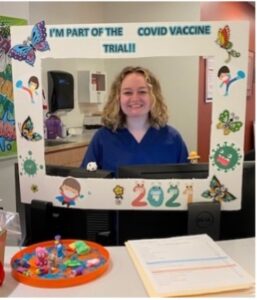 My time spent at the Institute for Translational Medicine and Science has been extremely rewarding, leaving me with new knowledge and skills to carry into future ambitions. In my position, I had the honor to work on both the Johnson & Johnson Adult and Pfizer Adolescent COVID-19 vaccine trials. Being a part of these trials not only taught me how clinical research is conducted, but allowed me to be a contributor to ending the COVID-19 pandemic.
My time spent at the Institute for Translational Medicine and Science has been extremely rewarding, leaving me with new knowledge and skills to carry into future ambitions. In my position, I had the honor to work on both the Johnson & Johnson Adult and Pfizer Adolescent COVID-19 vaccine trials. Being a part of these trials not only taught me how clinical research is conducted, but allowed me to be a contributor to ending the COVID-19 pandemic.
I spent a majority of my time in the Pediatric Clinical Research Center assisting with the Pfizer vaccine trial. My duties consisted of assisting with visits however needed, interacting with parents and their children, maintaining accurate charts, and many other small tasks to improve day-to-day functions. Working in the clinical setting affirmed my future career goals, as I got to interact with study participants and gain firsthand experience working on clinical research trials. While I was a clinical staff member, I also was able to visit the lab on slower clinic days. This allowed me to observe experiments and learn how to micro-slice lung samples.
My experience at RITMS was very beneficial to my personal and professional growth, and has left me with a newfound passion for translational medicine and clinical research. I would encourage other students who are interested in clinical or research careers to pursue the opportunities that RITMS has to offer.
Griffin White
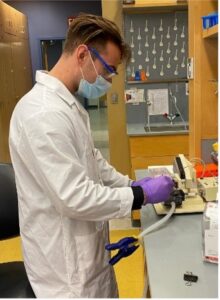 My time at Rutgers Institute of Translational Medicine and Science has brought me so many incredible opportunities to learn. From my first day, I was treated like a member of the research community that has been so successful in the past. Working with so many talented individuals, I have had the chance to conduct my own research, assist in Dr. Jude’s projects, and contribute to the discussions that take place each week during our lab meetings with Dr. Panettieri. I have had extensive practice western blotting and analyzing results to draw conclusions to direct future research.
My time at Rutgers Institute of Translational Medicine and Science has brought me so many incredible opportunities to learn. From my first day, I was treated like a member of the research community that has been so successful in the past. Working with so many talented individuals, I have had the chance to conduct my own research, assist in Dr. Jude’s projects, and contribute to the discussions that take place each week during our lab meetings with Dr. Panettieri. I have had extensive practice western blotting and analyzing results to draw conclusions to direct future research.
I am so thankful for everyone in the Panettieri lab who have made this experience unforgettable. I have had the support of faculty members, lab technicians, and graduate students every day, guiding me and teaching effective lab practices, as well as, how to conduct detailed research. Every project starts with an idea, background review of previous literature, and carefully designing experiments with an apparent purpose in mind. I have also gained extensive practice working with human airway smooth muscle cells as the main tissue for my research. One of my favorite aspects of this role has been the first-hand experience working with live lung tissue, assisting with the slicing of airways for future experimentation.
Throughout the course of the program, I have been exposed to the many activities that contribute to successful scientific research and I am so appreciative of the relationships that I have developed along the way. The experiences that I had have developed my skills as a student, researcher, and scientist and I hope to carry these lessons on to my future endeavors. I would like to thank everyone in the Panettieri lab for pushing me, inspiring me, and sharing their passion for scientific discovery. It has been a true pleasure to learn from such a talented group, and I wish everyone the best of luck as they continue to develop future projects.
Shreyansh Pradhan
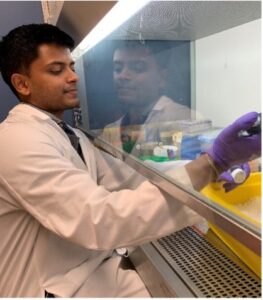 My time conducting research at the Rutgers Institute for Translational Medicine and Science under the guidance of Dr. Cynthia Koziol-White and Dr. Reynold Panettieri has been nothing short of amazing. I joined the lab as a rising senior at Drexel. My curiosity to learn more about the intricate pathways and mechanisms behind the pathophysiology of disease was a significant factor in joining the lab. From my first day, I met many accomplished and intelligent researchers who served as both a mentor and friend during my time at RITMS. One of the very first protocols I learned and mastered was the Western Blot procedure. Although the Western Blot protocol was a complex and multifaceted series of steps performed over 3-4 days, the technicians and researchers were always ready to help the undergraduates by answering questions, optimizing our lab technique, and explaining the reasoning behind each step. Although my experiments did not always yield perfect results and sometimes-even results I could not explain, each experiment was a learning opportunity. For example, I learned that dosages of certain bronchodilators need to be reduced or a different target needs to be stained to obtain the most optimal results. Rather than telling me what to do, Dr. Koziol-White and Dr. Panettieri inspired me to think critically about my results and derive solutions on my own–a skill that will be invaluable to me as I embark in my career as a future physician-scientist.
My time conducting research at the Rutgers Institute for Translational Medicine and Science under the guidance of Dr. Cynthia Koziol-White and Dr. Reynold Panettieri has been nothing short of amazing. I joined the lab as a rising senior at Drexel. My curiosity to learn more about the intricate pathways and mechanisms behind the pathophysiology of disease was a significant factor in joining the lab. From my first day, I met many accomplished and intelligent researchers who served as both a mentor and friend during my time at RITMS. One of the very first protocols I learned and mastered was the Western Blot procedure. Although the Western Blot protocol was a complex and multifaceted series of steps performed over 3-4 days, the technicians and researchers were always ready to help the undergraduates by answering questions, optimizing our lab technique, and explaining the reasoning behind each step. Although my experiments did not always yield perfect results and sometimes-even results I could not explain, each experiment was a learning opportunity. For example, I learned that dosages of certain bronchodilators need to be reduced or a different target needs to be stained to obtain the most optimal results. Rather than telling me what to do, Dr. Koziol-White and Dr. Panettieri inspired me to think critically about my results and derive solutions on my own–a skill that will be invaluable to me as I embark in my career as a future physician-scientist.
Another wonderful aspect of researching at RITMS were the weekly lab meetings.
Although there are many different levels of researchers based on experience and qualifications, ranging from summer students to Principal investigators, every researcher was given a platform to present their results each week. This created a positive collaborative environment and allowed each individual to understand the progress of the different research questions being explored within our lab. Additionally, it provided me with an opportunity to improve my public speaking skills and optimize how I communicate my scientific findings to other researchers. This research program instilled in me the joy of working together with other dedicated scientists to explore some of the most puzzling research questions in the translational science field today. I am excited by the prospect of using what I learned at RITMS in my future career as a physician-scientist!
Harsh Sharma
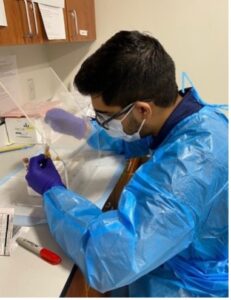 As a clinical research assistant, I have been given various responsibilities and had the opportunity experience many techniques. As a part of the clinic, I have primarily helped with the Johnson & Johnson COVID-19 Vaccine Adult trials. Within the trial, I have been tasked with doing both administrative and clinical tasks.
As a clinical research assistant, I have been given various responsibilities and had the opportunity experience many techniques. As a part of the clinic, I have primarily helped with the Johnson & Johnson COVID-19 Vaccine Adult trials. Within the trial, I have been tasked with doing both administrative and clinical tasks.
On the administrative side, I have worked with making sure all the information in a participant’s file is correctly filled out, entering patient data into the respective databases, and helping organize the patient files. A big part of the administrative side of clinical research, which I did not expect, is resolving queries which are discrepancies between the paperwork and the information entered the databases. These queries are caught and reported to us so that the researchers can clearly understand the data that has been uploaded. While I was aware that there were systems in place to make sure the data was collected thoroughly, I was surprised by how much time was invested into checking the data. I can easily say that more of my time has been spent resolving queries than with anything else.
On the more clinical side of my experience, I have had the opportunity to interact with the participants of the trial in person where I helped obtain nasal samples for the study. I have also helped in the clinical laboratory where I processed blood, saliva, and nasal samples before sending them off to a testing site to be checked for COVID-19 and its antibodies. Over the past 6 months, I have gotten to experience how meticulously these trials are planned and executed.
These are invaluable experiences for me, and I will carry them with me as I move forward in my career.
Soham Patel
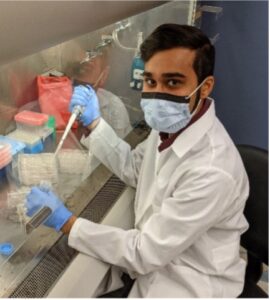 My experience at the Rutgers Institute of Translational Medicine and Science was undeniably a great opportunity and a perfect fit for me. Even with no prior lab experience, in just a few weeks I was able to learn lab procedures and gain independence with completing my own experiments due to the phenomenal faculty here. Dr. Cao and Mr. Deeney had been paramount in my learning experience, whether it was teaching me lab techniques or guiding me when I had questions. This experience has been very hands on, and I had been able to witness and participate in many lab techniques, such as the western blot, cell splitting, and SiRNA transfection.
My experience at the Rutgers Institute of Translational Medicine and Science was undeniably a great opportunity and a perfect fit for me. Even with no prior lab experience, in just a few weeks I was able to learn lab procedures and gain independence with completing my own experiments due to the phenomenal faculty here. Dr. Cao and Mr. Deeney had been paramount in my learning experience, whether it was teaching me lab techniques or guiding me when I had questions. This experience has been very hands on, and I had been able to witness and participate in many lab techniques, such as the western blot, cell splitting, and SiRNA transfection.
I had learned much about biology and cell signaling through this experience. I worked with the Stat6 and Stat3 pathways and observed how cytokines can affect those pathways. I was given the opportunity to present my own data at lab meetings to Dr. Panettieri and the other faculty, which had been very exciting and rewarding. I enjoyed learning about all the different projects going on in the lab and how they related to each other. The best part of this experience is the institute’s goal to foster growth and learning in this lab, which translated into a lot of personal and technical skill growth for me.
Sam Schonwald
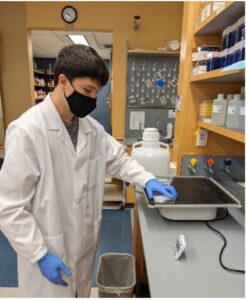 I worked under Dr. Cindy Koziol-White, whom I was able to learn more about Biology from than I had before in most of my classes. I was able to get a very well balanced and diverse experience of different lab techniques from her. She had me running my own experiments on Human Airway Smooth Muscle Cells and Precision Cut Lung Slices to learn more about the compound MG149 and how it affects lung cells. After running and analyzing my experiments, I was able to present my findings to everyone and received feedback on what possible steps I could take next and how to improve my protocols. As someone who is deathly afraid of public speaking, this helped me to get over that fear. Overall, I found myself excited to go into the lab each morning and would not trade this experience for anything. I would highly recommend this position to anyone else given the opportunity.
I worked under Dr. Cindy Koziol-White, whom I was able to learn more about Biology from than I had before in most of my classes. I was able to get a very well balanced and diverse experience of different lab techniques from her. She had me running my own experiments on Human Airway Smooth Muscle Cells and Precision Cut Lung Slices to learn more about the compound MG149 and how it affects lung cells. After running and analyzing my experiments, I was able to present my findings to everyone and received feedback on what possible steps I could take next and how to improve my protocols. As someone who is deathly afraid of public speaking, this helped me to get over that fear. Overall, I found myself excited to go into the lab each morning and would not trade this experience for anything. I would highly recommend this position to anyone else given the opportunity.
Emily Wolfe
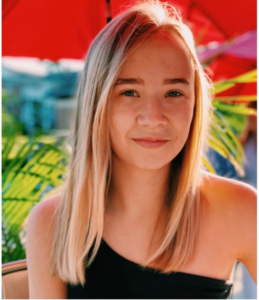 Over the course of the summer, I have not only expanded upon my laboratory techniques, but more importantly, also the knowledge base required understanding what the skills themselves yield in pertinence to data.
Over the course of the summer, I have not only expanded upon my laboratory techniques, but more importantly, also the knowledge base required understanding what the skills themselves yield in pertinence to data.
For the majority of my time, I have been working on collaborations with Thomas Jefferson University. The first, an exploration into GS-biased agonists and their effects on cell relaxation, taught me biophysical assays I would not find anywhere else. This unique skill set allowed me to prove a high-degree of drug efficacy within multiple cell lines, and even placed me in a position to be in a published manuscript in the coming months.
Next, with the guidance of Dr. An, as well as, people in other departments of the lab, I started looking into the Hippo-signaling pathway mechanism present in ASM cell relaxation. This both taught me new molecular biology techniques and the importance of topic research and readings. Through my investigation into this pathway, I was able to draw conclusions about my data.
Overall, the collaboration and rigor of this position definitely provided me with the basis to my future biomaterial and tissue research. Previously, as a BMES student, I had not received the opportunity to dive into molecular biological techniques, and this lab gave me that and so much more. I appreciate all of the support and career guidance from those at the lab, especially Dr. An, who was more than willing to help on any occasion.
David Flynn
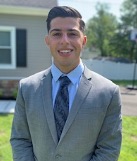 The RITMS has allowed me to personally grow as a student and a scientist, as well as, allowing me to immediately get involved and do significant work. In a matter of weeks, I went from walking into a translational lab for the first time to knowing how to run my own experiments through various lab techniques and understand the complex molecular biology that is being investigated. This would not be possible without the great mentorship and teaching environment the RITMS provides. I am currently working with Joseph Jude, PhD in studying the pathways involved in asthma, as well as, the phenotypic differences oh human airway smooth muscle cells in obese versus non-obese subjects.
The RITMS has allowed me to personally grow as a student and a scientist, as well as, allowing me to immediately get involved and do significant work. In a matter of weeks, I went from walking into a translational lab for the first time to knowing how to run my own experiments through various lab techniques and understand the complex molecular biology that is being investigated. This would not be possible without the great mentorship and teaching environment the RITMS provides. I am currently working with Joseph Jude, PhD in studying the pathways involved in asthma, as well as, the phenotypic differences oh human airway smooth muscle cells in obese versus non-obese subjects.
As a sophomore Biomedical Engineer with little to no prior research experience, I was an intimidated to jump right into the wet lab experience. However, everyone at the lab was extremely welcoming, helpful, and eager to bring me up to speed with what I needed to know. Within the first couple of weeks, I could confidently carry out and analyze Western Blots and Precision Cut Lung Slice Assays, and given more time, I learned about ELISA, Calcium Assays, and Transfections as well. This experience taught me a lot about the laboratory setting and broadened my horizons to scientific fields I had not even considered before.
Rohan Sanghani
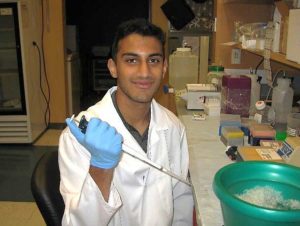 My time here at RITMS this summer has been one of the most fulfilling and enriching experiences I have had. Being given the opportunity to step into a professional environment for the first time and contribute to scientific research is far different from anything I have been a part of before. I had for quite some time been seeking to gain exposure to the realm of scientific research and data analysis and I could not have asked for a more perfect match. The people I have had the pleasure of working with at RITMS have truly made the experience worthwhile for me. Dr. Koziol-White and Vishal Parikh have been incredibly dedicated and patient mentors, and not a single member of the team has hesitated to take time out from their work to help me. The variety of lab techniques, as well as, data analysis tools, which have been ingrained into my memory, will prove useful in any future scientific research I intend to pursue. Simply observing and being a part of the entire process, from cell splitting and collection to excel analysis has been invaluable. I will have left the program with an enhanced understanding of how lab research is conducted, as well as, an entirely new set of skills in my arsenal that will help me regardless of what I choose to pursue in the future. For more information about Rohan’s experience.
My time here at RITMS this summer has been one of the most fulfilling and enriching experiences I have had. Being given the opportunity to step into a professional environment for the first time and contribute to scientific research is far different from anything I have been a part of before. I had for quite some time been seeking to gain exposure to the realm of scientific research and data analysis and I could not have asked for a more perfect match. The people I have had the pleasure of working with at RITMS have truly made the experience worthwhile for me. Dr. Koziol-White and Vishal Parikh have been incredibly dedicated and patient mentors, and not a single member of the team has hesitated to take time out from their work to help me. The variety of lab techniques, as well as, data analysis tools, which have been ingrained into my memory, will prove useful in any future scientific research I intend to pursue. Simply observing and being a part of the entire process, from cell splitting and collection to excel analysis has been invaluable. I will have left the program with an enhanced understanding of how lab research is conducted, as well as, an entirely new set of skills in my arsenal that will help me regardless of what I choose to pursue in the future. For more information about Rohan’s experience.
Grant Shim
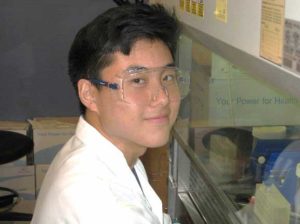 The summer research program at RITMS was one of the most foundational experiences for me. Under Dr. Jude and Dr. An, I not only learned laboratory procedures but also the process of scientific experimentation. In the Panettieri Lab, I was able to expand my personal interest in science to a level that would not have been attainable in a school setting. Following and learning from the lab faculty, as well as, other interns has helped shed some light on the research experience, which was extremely important considering what a possible medical future entails.
The summer research program at RITMS was one of the most foundational experiences for me. Under Dr. Jude and Dr. An, I not only learned laboratory procedures but also the process of scientific experimentation. In the Panettieri Lab, I was able to expand my personal interest in science to a level that would not have been attainable in a school setting. Following and learning from the lab faculty, as well as, other interns has helped shed some light on the research experience, which was extremely important considering what a possible medical future entails.
More specifically, I was able to develop a wide array of skills such as sterile technique, western blot analysis, and magnetic twisting cytometry (MTC). Prior to this experience, I did not have any considerable knowledge about the subject at hand. However, through the knowledge of my mentors and everyone’s willingness to help I was able to somewhat replicate a professional lab. The format of lab meetings and feedback from the most experienced researchers also helped to formulate what research presentations would entail. Overall, this program not only gave me a more in-depth perspective on research, but also gave me the chance to explore my personal interests in a learning-friendly environment.
Sandra Paz
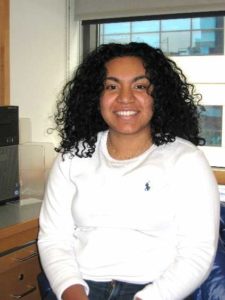 I came into this lab with very limited basic lab and clinical research exposure and experience. I was looking for an immersive experience that would allow me to see and learn as many different things as I could. The lab was everything I was looking for and more. The open and friendly lab staff and faculty creates the foundation for an ideal learning environment. Whether you are simply observing or performing an experiment yourself, you are constantly learning something new. I was very grateful for the opportunity to shadow Dr. Bill Russell during his clinical trials in the Clinical Research Center, as I saw tests done with patients suffering from diseases including asthma and scleroderma. Aiding Dr. Joseph Jude’s teams in basic lab research gave me hindsight into the years of experiments that occur prior to a drug even being considered for a clinical trial.
I came into this lab with very limited basic lab and clinical research exposure and experience. I was looking for an immersive experience that would allow me to see and learn as many different things as I could. The lab was everything I was looking for and more. The open and friendly lab staff and faculty creates the foundation for an ideal learning environment. Whether you are simply observing or performing an experiment yourself, you are constantly learning something new. I was very grateful for the opportunity to shadow Dr. Bill Russell during his clinical trials in the Clinical Research Center, as I saw tests done with patients suffering from diseases including asthma and scleroderma. Aiding Dr. Joseph Jude’s teams in basic lab research gave me hindsight into the years of experiments that occur prior to a drug even being considered for a clinical trial.
This lab is unique in its broad span of work in translational medicine; it deals with different airway diseases, and includes the environmental, as well as, the immunological factors that affect them. From watching the airways of collected lung slices contract, to seeing the progress of a patient on their dosed medications, I saw the pathways discussed come to life. The exceptional resources and equipment the lab has access to, as well as, the amazing faculty and staff has truly made this an experience to remember. My appreciation and knowledge for the field of scientific research has grown exponentially, and I believe that an experience like this one would benefit absolutely anyone interested in the field of science and medicine (whether it be research related or not).
Christian Noggle
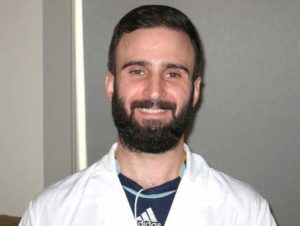 Prior to attending Drexel University to study biomedical engineering, I was in the Marine Corps for 5 years working as a Korean linguist. This presented quite the significant career change for me when I would come to leave the military and one concern that I had was that I lacked any related work experience, especially given my age. It had been the better part of a decade since I had last taken classes in any kind of academic setting so I would be rusty to say the least. My coop experience at the Rutgers Institute for Translational Medicine and Science proved to be an excellent crash course in research procedures and techniques and was just what I needed. I was exposed to a variety of different types of experiments ranging from Western Blot techniques analyzing various proteins to calcium assays probing one of the main contraction pathways for human airway smooth muscle cells alongside cyclic AMP assays responsible for an opposing relaxation pathway.
Prior to attending Drexel University to study biomedical engineering, I was in the Marine Corps for 5 years working as a Korean linguist. This presented quite the significant career change for me when I would come to leave the military and one concern that I had was that I lacked any related work experience, especially given my age. It had been the better part of a decade since I had last taken classes in any kind of academic setting so I would be rusty to say the least. My coop experience at the Rutgers Institute for Translational Medicine and Science proved to be an excellent crash course in research procedures and techniques and was just what I needed. I was exposed to a variety of different types of experiments ranging from Western Blot techniques analyzing various proteins to calcium assays probing one of the main contraction pathways for human airway smooth muscle cells alongside cyclic AMP assays responsible for an opposing relaxation pathway.
This hands-on lab experience proved to be a fantastic analog for the key to learning a foreign language: immersion. While lectures and recitations are usually adequate for familiarizing oneself with the theories and core principles learned in a classroom, it is the raw, first hand experience in a lab that truly engages a student and helps them learn the finer details of what they’ve read about in books. Without this key experience, the source material never really sticks with the student; it remains at arm’s reach and can be rudimentarily conceptualized but never truly understood or, more importantly, applied to real world situations. I’ve found my lab experiences in class to be less than satisfactory and it was this that first drew me to RITMS. After spending six months working alongside PhD doctors and grad students pushing the boundaries of their respective fields, I can only say that I’m anything but disappointed. I truly felt that I contributed in a measurable way and that what I was doing had a real impact on the world; it was not just a hollow recreation of past experiments for the sake of learning something already known. I was helping discover something new; not just for the lab and their publications but also for me, what I was capable of, and what goals I would ultimately want to focus my new career efforts on. For more information about Christian’s experience.
Lily Kwak
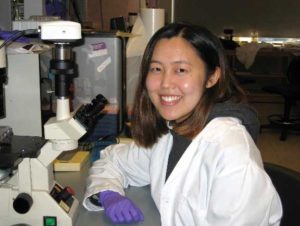 I started working at RITMS as an Aresty Undergraduate Research Assistant last year. During the school year, I was able to learn many lab techniques under the guidance of Dr. Cindy Koziol-White and Vishal Parikh. This past summer, I had the opportunity to put these skills into action by running my own experiments. I also worked in teams with other students and presented results at weekly lab meetings. I have taken part in various projects involving human airway smooth muscle cells and slices, including histone modifications, siRNA transfections, and IgE cross-linking. Everyone in the Panettieri lab is extremely passionate about their work and have been more than willing to help. I am grateful to be a member of this lab, and I look forward to continuing my research here as a senior at Rutgers.
I started working at RITMS as an Aresty Undergraduate Research Assistant last year. During the school year, I was able to learn many lab techniques under the guidance of Dr. Cindy Koziol-White and Vishal Parikh. This past summer, I had the opportunity to put these skills into action by running my own experiments. I also worked in teams with other students and presented results at weekly lab meetings. I have taken part in various projects involving human airway smooth muscle cells and slices, including histone modifications, siRNA transfections, and IgE cross-linking. Everyone in the Panettieri lab is extremely passionate about their work and have been more than willing to help. I am grateful to be a member of this lab, and I look forward to continuing my research here as a senior at Rutgers.
Frank Pellegrino
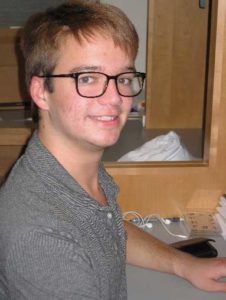 This summer, I have had an unbelievable experience working in the lab with the RITMS Summer Program. During the first few weeks, I learned a lot about both basic research techniques and techniques specific to studying smooth muscle airway cells in the lungs. I also was able to study a great deal of information regarding the lungs by reading publications and learning from other scientists in the lab, which was fascinating because I was experiencing how new scientific knowledge is discovered first-hand. Once I learned all of the research techniques required to perform in the lab, I was able to conduct my own experiments, get results independently, and present them. This was definitely the most rewarding part because I was able to assist in finding out novel information regarding how the lung works on a cellular level. Another unique aspect of this program was the friendliness of the other people in the lab. Every day we ate lunch together and always had great conversations; throughout the day when there was downtime, everyone was very personable and we all became good friends as the summer progressed. Many people, including myself, are amazed by how much interaction everyone has rather than just coming to the lab every day, doing research, and leaving. Overall, this summer was a great experience and I would recommend it to any student who is interested in pursuing a career in science. For more information about Frank’s experience.
This summer, I have had an unbelievable experience working in the lab with the RITMS Summer Program. During the first few weeks, I learned a lot about both basic research techniques and techniques specific to studying smooth muscle airway cells in the lungs. I also was able to study a great deal of information regarding the lungs by reading publications and learning from other scientists in the lab, which was fascinating because I was experiencing how new scientific knowledge is discovered first-hand. Once I learned all of the research techniques required to perform in the lab, I was able to conduct my own experiments, get results independently, and present them. This was definitely the most rewarding part because I was able to assist in finding out novel information regarding how the lung works on a cellular level. Another unique aspect of this program was the friendliness of the other people in the lab. Every day we ate lunch together and always had great conversations; throughout the day when there was downtime, everyone was very personable and we all became good friends as the summer progressed. Many people, including myself, are amazed by how much interaction everyone has rather than just coming to the lab every day, doing research, and leaving. Overall, this summer was a great experience and I would recommend it to any student who is interested in pursuing a career in science. For more information about Frank’s experience.
Swetha Chengalvala
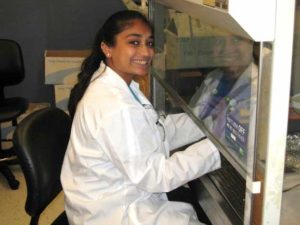 I came into the Rutgers Institute of Translational medicine as an undergrad student. At Drexel University, I am pursuing a degree in Biological sciences with a minor in Health Service Administration. I began my six month journey here trying to get accustomed to the fast pace nature of the research world. There was an inherent learning curve when I started here, but the entire team used their valuable time to help me out when I needed it. I was treated as an equal with the other scientists and given the responsibility to conduct my own experiments. During our weekly lab meetings, I was able to present my work to my mentors and fellow lab staff and faculty. This is where I could practice my public speaking skills and learn how to properly communicate my thoughts. The lab meetings also allowed me to hear real-time feedback on my work and make the necessary improvements for the following week.
I came into the Rutgers Institute of Translational medicine as an undergrad student. At Drexel University, I am pursuing a degree in Biological sciences with a minor in Health Service Administration. I began my six month journey here trying to get accustomed to the fast pace nature of the research world. There was an inherent learning curve when I started here, but the entire team used their valuable time to help me out when I needed it. I was treated as an equal with the other scientists and given the responsibility to conduct my own experiments. During our weekly lab meetings, I was able to present my work to my mentors and fellow lab staff and faculty. This is where I could practice my public speaking skills and learn how to properly communicate my thoughts. The lab meetings also allowed me to hear real-time feedback on my work and make the necessary improvements for the following week.
Working here has strengthened my passion to pursue the field of medicine. Dr. Panettieri’s work has helped me understand the importance of bringing bench research to bedside problems. He has become a real idol for me and I hope to become a physician who deeply cares about research as he does. I hope to continue the work I am doing here in the future and create solutions for those in need. My experience has more than surpassed my expectations of a typical research lab. Not only was I able to gain invaluable knowledge about the research being done, but I also made some unforgettable friends and connections. For more information about Swetha’s experience.
Nirali Patel
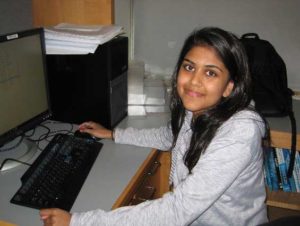 This spring/summer I had the incredible opportunity of working in Dr. Panettieri’s lab. I am a student at Drexel University. My experience in this lab was unique in that I was able to partake in both clinical and laboratory aspects of research. As a clinical research assistant, I often went to the Clinical Research Center (CRC) where I was able to observe the effects of lung diseases, such as Cystic Fibrosis and scleroderma, on patients of all ages and backgrounds. Seeing the participants of these clinical trials react to the various treatments being tested really puts into perspective the need for more effective drugs on the market.
This spring/summer I had the incredible opportunity of working in Dr. Panettieri’s lab. I am a student at Drexel University. My experience in this lab was unique in that I was able to partake in both clinical and laboratory aspects of research. As a clinical research assistant, I often went to the Clinical Research Center (CRC) where I was able to observe the effects of lung diseases, such as Cystic Fibrosis and scleroderma, on patients of all ages and backgrounds. Seeing the participants of these clinical trials react to the various treatments being tested really puts into perspective the need for more effective drugs on the market.
For the laboratory part, I learned more about Human Airway Smooth Muscle (HASM) cell culture techniques, experimental design, and data analysis. There are also weekly lab meetings, which have helped improve my public speaking and kept me in the loop with what others in the lab were testing. In the beginning, the meetings were daunting, but I eventually grew to like them because they were informative and good for getting feedback on the experiments. The lab fosters a very positive, collaborative environment, which I personally have not seen anywhere else. Overall, it was a transformative experience that confirmed my interest in pursuing a career in health care. For more information about Nirali’s experience.
Olivia Mayfryer
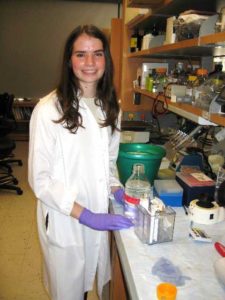 Working in Dr. Panettieri’s lab has given me invaluable research experience to pursue a career in medicine; one of the most valuable things I learned was the importance of asking questions. While I knew that others were always willing to help out and answer my questions, I was given the freedom to run my own experiments as well. Others in the lab, ranging from college students to professors, explained the reasoning behind working with airway smooth muscle, as well as the mechanisms for procedures such as cell culture, Western blotting, and single-cell calcium imaging. I was able to participate in precision-cut lung slicing, and used the obtained slices to determine how environmental toxicants influenced patients with and without asthma. Unlike high school labs with limited equipment and predetermined procedures, I constantly tackled new challenges and gained much more knowledge about equipment that a researcher uses every day. Presenting at weekly lab meetings allowed me to gain much more confidence in public speaking, and learn about other areas of translational research being explored. I strongly recommend this program for anyone interested in the advancement of medicine through a researcher’s perspective! For more information about Olivia’s experience.
Working in Dr. Panettieri’s lab has given me invaluable research experience to pursue a career in medicine; one of the most valuable things I learned was the importance of asking questions. While I knew that others were always willing to help out and answer my questions, I was given the freedom to run my own experiments as well. Others in the lab, ranging from college students to professors, explained the reasoning behind working with airway smooth muscle, as well as the mechanisms for procedures such as cell culture, Western blotting, and single-cell calcium imaging. I was able to participate in precision-cut lung slicing, and used the obtained slices to determine how environmental toxicants influenced patients with and without asthma. Unlike high school labs with limited equipment and predetermined procedures, I constantly tackled new challenges and gained much more knowledge about equipment that a researcher uses every day. Presenting at weekly lab meetings allowed me to gain much more confidence in public speaking, and learn about other areas of translational research being explored. I strongly recommend this program for anyone interested in the advancement of medicine through a researcher’s perspective! For more information about Olivia’s experience.
Ankita Prasad
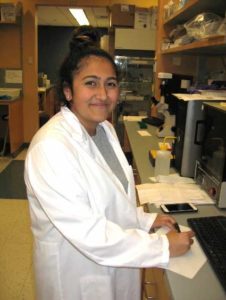 My summer experience at the Panettieri Lab has truly been one of a kind. This lab helped me refine my wet lab skills and connect aspects of science that I had previously learned in classes I have taken at Rutgers. From cell culture to slicing lungs to Western blots, there was not one task that was not explained with a why and how. Furthermore, due to the social atmosphere of the lab, I was able to form many friendships with the staff and other summer students that were here. The exposure I have had at this lab does not compare to anything else, and the skills I have acquired will continue on to anything I do in the future. For more information about Ankita’s experience.
My summer experience at the Panettieri Lab has truly been one of a kind. This lab helped me refine my wet lab skills and connect aspects of science that I had previously learned in classes I have taken at Rutgers. From cell culture to slicing lungs to Western blots, there was not one task that was not explained with a why and how. Furthermore, due to the social atmosphere of the lab, I was able to form many friendships with the staff and other summer students that were here. The exposure I have had at this lab does not compare to anything else, and the skills I have acquired will continue on to anything I do in the future. For more information about Ankita’s experience.
Serena Wang
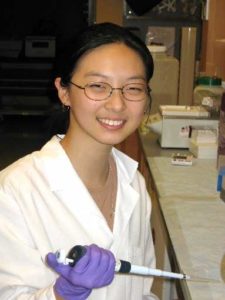 The summer program at RITMS was an enjoyable experience. Not only did I meet students from all over who were just like me preparing for college, I also was able to encounter great scientists who were doing incredible research. During my time in the lab, I learned things that I was not exposed to in high school such as cell culture, calcium assay, qPCR and western blots. This experience also taught me more lifelong personal skills such as time management as I had to balance this program with other activities that I had planned over the summer. Most importantly, while the program was extremely informative, I also had a great time. In between experiments and out of the lab, I have had hilarious conversations and great experiences with the people here. This program offers a great introduction to what working in a lab is like for high school students. For more information about Serena’s experience.
The summer program at RITMS was an enjoyable experience. Not only did I meet students from all over who were just like me preparing for college, I also was able to encounter great scientists who were doing incredible research. During my time in the lab, I learned things that I was not exposed to in high school such as cell culture, calcium assay, qPCR and western blots. This experience also taught me more lifelong personal skills such as time management as I had to balance this program with other activities that I had planned over the summer. Most importantly, while the program was extremely informative, I also had a great time. In between experiments and out of the lab, I have had hilarious conversations and great experiences with the people here. This program offers a great introduction to what working in a lab is like for high school students. For more information about Serena’s experience.
Jeff Yung
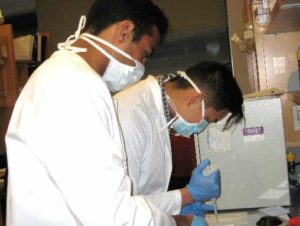 I had a great experience in Dr. Panettieri’s lab! There is an amazing culture here. People are fun and super helpful. I learned a ton here such as how to run a western blot, cAMP assay, calcium assay, and lung slice experiment. I highly recommend this lab for anyone looking for a translational lab research experience.
I had a great experience in Dr. Panettieri’s lab! There is an amazing culture here. People are fun and super helpful. I learned a ton here such as how to run a western blot, cAMP assay, calcium assay, and lung slice experiment. I highly recommend this lab for anyone looking for a translational lab research experience.
Noah Hartwick
 Through the Summer Research Program at Rutgers Institute for Translational Medicine and Science (RITMS), I was able to not only experience working in an actual laboratory environment but also witness novel research being conducted right before my eyes. As a rising high school senior, I had never worked in a professional laboratory setting before; in fact, I was a little unsure of what to expect. However, after working in the RITMS lab under the guidance of my mentors, Dr. Gaoyuan Cao and Brian Deeney, in addition to others in the lab, I quickly learned that it is a truly supportive learning environment. The members of the lab were always willing to teach us protocol, about what they were studying, and about what we would be studying, which they seemed to genuinely enjoy as well. That is what I believe has helped me to greatly increase my knowledge and interest in molecular biology and translational research.
Through the Summer Research Program at Rutgers Institute for Translational Medicine and Science (RITMS), I was able to not only experience working in an actual laboratory environment but also witness novel research being conducted right before my eyes. As a rising high school senior, I had never worked in a professional laboratory setting before; in fact, I was a little unsure of what to expect. However, after working in the RITMS lab under the guidance of my mentors, Dr. Gaoyuan Cao and Brian Deeney, in addition to others in the lab, I quickly learned that it is a truly supportive learning environment. The members of the lab were always willing to teach us protocol, about what they were studying, and about what we would be studying, which they seemed to genuinely enjoy as well. That is what I believe has helped me to greatly increase my knowledge and interest in molecular biology and translational research.
In my high school science classes, we perform experiments, but there is often an expected result or a predetermined procedure. However, during this program, I was challenged to think critically about designing my own experiments to investigate a relatively new and unknown topic. In fact, I quickly realized that at laboratories such as that at RITMS, doing research into unknown mechanisms or pathways in cellular function and beyond is the norm.
With the help of my mentors, I learned Airway Smooth Muscle (ASM) cell culture techniques, Western Blot procedure, precision cut lung slicing, and experimental design, in addition to observing tissue extraction from donor lungs. Additionally, I learned about the mechanisms of ASM cell contraction and relaxation, the receptors present on these cells, and how they relate to the research being conducted at the lab. Dr. Cao gave me the opportunity to work on a project that investigated the effect of blue light exposure on myosin light chain (MLC) phosphorylation in ASM cells. I utilized Western Blot techniques in order to measure the phosphorylated MLC (pMLC) levels in the cells after they were exposed to varying durations of blue light. After learning the Western Blot procedure and receiving some guidance from Dr. Cao and Brian Deeney, I was soon able to plan and execute experiments of my own, which I would have never been able to do had it not been for this program. For this reason, I am deeply grateful to have had this amazing opportunity and for such an enriching experience working at Dr. Panettieri’s lab at RITMS. For more information about Noah’s experience.
Sanjiv Sunderram
 Working in the Panetierri Lab has been an amazing experience for me. Coming into the lab I had very minor experience from school, but it was nowhere near as professional as this lab. Even though I am a high school student, this lab never treated me as such, they treated me like I was a part of the team and they trusted me to work on their projects. They made me feel valued even though I did not know nearly as much as them in this field. In the lab, I worked on single cell calcium, Cyclic-AMP assay, western blots, and lung slicing. This opportunity is a great experience for anyone who is interested in science and the Panetierri lab is the best place to get this kind of exposure. I have enjoyed my time thoroughly here and look forward to doing research in the future. For more information about Sanjiv’s experience.
Working in the Panetierri Lab has been an amazing experience for me. Coming into the lab I had very minor experience from school, but it was nowhere near as professional as this lab. Even though I am a high school student, this lab never treated me as such, they treated me like I was a part of the team and they trusted me to work on their projects. They made me feel valued even though I did not know nearly as much as them in this field. In the lab, I worked on single cell calcium, Cyclic-AMP assay, western blots, and lung slicing. This opportunity is a great experience for anyone who is interested in science and the Panetierri lab is the best place to get this kind of exposure. I have enjoyed my time thoroughly here and look forward to doing research in the future. For more information about Sanjiv’s experience.
Sahana Kannan
 As a rising senior in high school, I was keen on expanding my interest in science by gaining exposure to a real-world setting. Learning about notions and techniques in biology class is one thing, but applying them facilitates a deeper understanding. My time at the RITMS laboratory was an incredibly rewarding experience as it provided me with a way to practice hands-on biomedical research. Under the guidance of Dr. Cynthia Koziol-White, I was able to conduct a study centered on the histone modifications in asthmatic cells.
As a rising senior in high school, I was keen on expanding my interest in science by gaining exposure to a real-world setting. Learning about notions and techniques in biology class is one thing, but applying them facilitates a deeper understanding. My time at the RITMS laboratory was an incredibly rewarding experience as it provided me with a way to practice hands-on biomedical research. Under the guidance of Dr. Cynthia Koziol-White, I was able to conduct a study centered on the histone modifications in asthmatic cells.
Alongside these experiments, I continuously collected a multitude of skills such as the proper way to plate cells, to run a western blot, and to conduct a calcium assay. The lab meetings offered a way for me to get feedback on my studies while allowing me to gain an insight as to what my coworkers were working on. This collaboration formed an extremely supportive environment within the lab. At the beginning of the program, I was slightly intimidated by the numerous amount of accomplished students and mentors whom I would be working with. Even though I had little knowledge of the research that was conducted specifically at this lab, the lab techs and research investigators seldom hesitated to explain the ideas and mechanisms behind a study. Overall, this program provided a unique experience with long-lasting impacts in and outside the realm of research. For more information about Sahana’s experience.
Shreyas Hebbal
 A few words to describe my experience in Dr. Panettieri’s lab are astonishing, supportive, and breathe taking. From the moment I started, the lab has been more than welcoming and has understood the learning curve that is present coming from classes to real life application. Within the first couple of days, I had observed how donor lungs are processed and how to grow human airway smooth muscle cell cultures. Shadowing the other members in the lab helped me learn more about the techniques used to test and analyze reactions found in both human airway smooth muscle cells and lung slices.
A few words to describe my experience in Dr. Panettieri’s lab are astonishing, supportive, and breathe taking. From the moment I started, the lab has been more than welcoming and has understood the learning curve that is present coming from classes to real life application. Within the first couple of days, I had observed how donor lungs are processed and how to grow human airway smooth muscle cell cultures. Shadowing the other members in the lab helped me learn more about the techniques used to test and analyze reactions found in both human airway smooth muscle cells and lung slices.
With a little more time and practice, I was conducting my own experiments, analyzing data, and presenting the results I found weekly in lab meetings. Along with the laboratory portion of my time in Dr. Panettieri’s lab, I have had the pleasure of working in the Clinical Research Center (CRC) by helping run tests for clinical trials. Working in the CRC has allowed me to understand the complete process of initiating and concluding clinical trials while having the opportunity to interact with patients diagnosed with asthma, COPD, cystic fibrosis, and more. The exposure I have had in both the laboratory and clinical setting have reassured my interest in the medical field and have given me experience and skills I hope to refine in the coming years. For more information about Shreyas’ experience.
Virginia Tanner
 I am about to start my fifth and final year at Drexel University majoring in biomedical engineering with a concentration in biomaterials and tissue engineering. I am working in Dr. Panettieri’s lab for my third and last co-op and I have learned so much in my time here. Everyone here is very willing to teach and help out in any way they can. This lab and the people here have shown me what it takes to be a researcher and talking with people from different educational backgrounds has helped me plan for a future in research. Working on Dr. Koziol-White’s team has given me the chance refine my lab skills and learn new techniques that will make me a better scientist and engineer in the future. This has been the best co-op experience I have had and I can’t thank the lab enough for the great opportunity. For more information about Virginia’s experience.
I am about to start my fifth and final year at Drexel University majoring in biomedical engineering with a concentration in biomaterials and tissue engineering. I am working in Dr. Panettieri’s lab for my third and last co-op and I have learned so much in my time here. Everyone here is very willing to teach and help out in any way they can. This lab and the people here have shown me what it takes to be a researcher and talking with people from different educational backgrounds has helped me plan for a future in research. Working on Dr. Koziol-White’s team has given me the chance refine my lab skills and learn new techniques that will make me a better scientist and engineer in the future. This has been the best co-op experience I have had and I can’t thank the lab enough for the great opportunity. For more information about Virginia’s experience.
Varun Gongireddy
 The summer research program at RITMS has truly been one of a kind for me. The Panettieri Lab has offered me an in depth perspective on laboratory procedures and different methods of experimentation. Under the clinical research division, I received the opportunity to observe the effects of various lung diseases and a diverse group of patients which were part of different studies. Through the program I started to grasp how pharmaceutical companies conduct studies to examine the effects of medications we take in our daily lives. I began to realize just how intricate the process is for companies to conduct studies, verify results, and sell their product. And within these studies, each patient was very different from the previous with each having a unique disorder or the same disorder but with a differing severity.
The summer research program at RITMS has truly been one of a kind for me. The Panettieri Lab has offered me an in depth perspective on laboratory procedures and different methods of experimentation. Under the clinical research division, I received the opportunity to observe the effects of various lung diseases and a diverse group of patients which were part of different studies. Through the program I started to grasp how pharmaceutical companies conduct studies to examine the effects of medications we take in our daily lives. I began to realize just how intricate the process is for companies to conduct studies, verify results, and sell their product. And within these studies, each patient was very different from the previous with each having a unique disorder or the same disorder but with a differing severity.
The Panettieri Lab consists of a great group of dedicated doctors, researchers, co-ops, and interns who work together. Weekly lab presentations served to be a great learning experience for future lab write ups, and procedures like Western Blots not only made me simply follow the steps but explained why each step and chemical was necessary. From examining patients to organs such as lungs and to smooth muscle cells, the program has definitely extended my perception of biology and modern day health care. For more information about Varun’s experience.
Alina Lou
 This lab helped me learn molecular biology techniques related to my field of study. I was able to connect concepts and methods from class to protocols. Furthermore, I have a better sense of what translational research is. Although there’s a lot of patience involved, everything is very interesting. With this lab, seeing the connection between your work and its impact on human lives is very easy. For more information about Alina’s experience.
This lab helped me learn molecular biology techniques related to my field of study. I was able to connect concepts and methods from class to protocols. Furthermore, I have a better sense of what translational research is. Although there’s a lot of patience involved, everything is very interesting. With this lab, seeing the connection between your work and its impact on human lives is very easy. For more information about Alina’s experience.
Jennifer Ben Nathan
 I discovered my love for science in high school biology class, when I was first exposed to the science behind life. Reading the textbook and listening to class lectures was only part of what sparked my interest; performing lab experiments was an interactive way to incorporate what I had learned. We performed simple experiments in the course of an hour, like extracting the DNA from a strawberry or dissecting a frog. Little did I know I would soon be spending my summer in a research lab working with live human lung cells. Taking part in research at the Rutgers Institute for Translational Medicine and Science was truly a one of a kind experience. Coming into the program, I could have never imagined that I would learn so much. Treating cells, changing media, running Immunoblots, and preparing human precision cut lung slices became part of a normal day in the lab.
I discovered my love for science in high school biology class, when I was first exposed to the science behind life. Reading the textbook and listening to class lectures was only part of what sparked my interest; performing lab experiments was an interactive way to incorporate what I had learned. We performed simple experiments in the course of an hour, like extracting the DNA from a strawberry or dissecting a frog. Little did I know I would soon be spending my summer in a research lab working with live human lung cells. Taking part in research at the Rutgers Institute for Translational Medicine and Science was truly a one of a kind experience. Coming into the program, I could have never imagined that I would learn so much. Treating cells, changing media, running Immunoblots, and preparing human precision cut lung slices became part of a normal day in the lab.
When I first walked into the lab, I was slightly overwhelmed. There were massive freezers lining the hallway, rows and rows of shelves housing countless bottles, and equipment I had never knew existed. It was hard to believe that anyone could easily find their way around. But my perspective was quickly changed when I met the people who worked there. Everyone was always willing to help if I had questions, and they made sure I understood the task at hand; they were the true reason I was able to absorb so much knowledge. By the end of a few weeks, I was capable of running my own experiments, which involved making dilutions, treating cells, running Western Blots, and collecting data. My experience at RITMS has altered my entire outlook on science. I felt as though I was part of the research community, and I look forward to making real contributions in the near future.
Pierre Saad
 I thoroughly enjoyed my time researching at the Rutgers Institute for Translational Medicine and Science under Dr. Panettieri, alongside a group of very talented and intelligent researchers. Beginning my experience this summer, I was very impressed by the structural organization of the lab, which although having many investigators studying different projects, works together as a coherent unit. The incorporation of new student researchers is very seamless, and this efficient immersement facilitates our growth as future investigators. Strong mentorship and collaboration are the basis for the progress of this lab. When I first began, after gaining a background on the research being done, I was quickly taught the various techniques and protocols that this lab uses under the mentorship of Dr. Gaoyuan Cao, Brian Deeney and others in the lab. I learned by observing them, then being watched performing the procedures, and then I was left to perform the experiments on my own, as they made themselves always available to answer any questions I had. I believe this is an excellent way to teach. Through this, I learned how to perform this lab’s methods for cell culture and passaging of airway smooth muscle cells and epithelial cells, western blotting and analysis, bicinchoninic acid assays (BCA), precision cut lung slicing, and PCLS assays.
I thoroughly enjoyed my time researching at the Rutgers Institute for Translational Medicine and Science under Dr. Panettieri, alongside a group of very talented and intelligent researchers. Beginning my experience this summer, I was very impressed by the structural organization of the lab, which although having many investigators studying different projects, works together as a coherent unit. The incorporation of new student researchers is very seamless, and this efficient immersement facilitates our growth as future investigators. Strong mentorship and collaboration are the basis for the progress of this lab. When I first began, after gaining a background on the research being done, I was quickly taught the various techniques and protocols that this lab uses under the mentorship of Dr. Gaoyuan Cao, Brian Deeney and others in the lab. I learned by observing them, then being watched performing the procedures, and then I was left to perform the experiments on my own, as they made themselves always available to answer any questions I had. I believe this is an excellent way to teach. Through this, I learned how to perform this lab’s methods for cell culture and passaging of airway smooth muscle cells and epithelial cells, western blotting and analysis, bicinchoninic acid assays (BCA), precision cut lung slicing, and PCLS assays.
Furthermore, the collaboration between the different researchers is very evident; every week we have a lab meeting where each member of the lab presents the progress of their research to the rest of the team. After each presentation, there’s a brief discussion led by Dr. Panettieri, giving the opportunity to receive feedback from experienced investigators, and getting ideas for future experiments. Such meetings are vital to the progress of the research—they give the chance to see different perspectives, providing potential to see your own research in a different light, both by hearing other’s comments about your research and by listening to the progress of other projects that may have similar elements. These presentations have afforded me an excellent opportunity to practice my presentational skills, as each week I prepare and present my research with a background, methods, results, and conclusions section as I would a poster presentation.
During my time at the lab, I have been studying the effects of Vitamin D and Dexamethasone on Gα12 expression at the protein level, seeking to determine whether this treatment is able to decrease the expression of Gα12. We further assayed the phosphorylation of myosin light chain under varying concentrations of treatment, a process downstream to Gα12 and the last committed step to smooth muscle contraction, directly linking the potential effects of Vitamin D to asthma pathophysiology. We finally wanted to determine if Vitamin D and Dexamethasone treatment is able to reverse the inflammatory effects of TGF-B.
What I’ve most appreciated from my experience, was the opportunity afforded to me to independently design my own experiments. After choosing my project from a few options available, and receiving excellent mentorship from Dr. Cao, I was given free license to plan out the experimental designs of the study. After designing the different experiments, I’d consult with Dr. Cao for any further suggestions he would have and then I would proceed with the experiments. This form of mentorship has really allowed me to grow, and encouraged me to continue this research into my second year of med school. Moreover, it continues to encourage me to pursue both a clinical and academic career in medicine, incorporating research in my future practice.
Julian Rana
 When I became interested in biological sciences in high school, I found myself intrigued in the molecular mechanisms that govern life processes. Considering the vast nature of life science, I knew there would always be areas left to explore. When I started college at Drexel University and had my major and area of interest established, I was prepared to dive deeper into the research aspect that the field offered. Rutgers Institute for Translational Medicine and Science has offered everything I wanted out of my co-op experience, solidifying my interests and aspirations in both biological research as well as clinical medicine.
When I became interested in biological sciences in high school, I found myself intrigued in the molecular mechanisms that govern life processes. Considering the vast nature of life science, I knew there would always be areas left to explore. When I started college at Drexel University and had my major and area of interest established, I was prepared to dive deeper into the research aspect that the field offered. Rutgers Institute for Translational Medicine and Science has offered everything I wanted out of my co-op experience, solidifying my interests and aspirations in both biological research as well as clinical medicine.
RITMS is a place to learn and develop skills in the sciences, and the PhDs, MDs, and research assistants make the experience one to value. When selecting a co-op it is important to find one that fits your interests and will help facilitate your growth into the profession. Throughout my time at RITMS I have not only dwelled deeper into the mechanisms surrounding the exacerbations of airway diseases, but I have also been able to fine tune skills imperative to working in research. While working here has helped prepare me for medical research, I think one of the most valuable lessons I have learned is to enjoy the place you work and value the applications it has in the real world. For more on Julian’s experience.
Nila Kirupaharan
 It has always intrigued me that human processes could be attributed to actions at a cellular level. With this interest in mind, I pursued laboratory research in hopes of expanding my knowledge with some hands-on experience. As a rising high school senior, it was such an incredible opportunity to work with the Panettieri Lab at the Rutgers Institute for Translational Medicine and Science. A focus on asthma pathology and the mechanisms of airway exacerbations by environmental pollutants under the guidance of Dr. Joseph Jude has furthered my interest and understanding of biomedical research.
It has always intrigued me that human processes could be attributed to actions at a cellular level. With this interest in mind, I pursued laboratory research in hopes of expanding my knowledge with some hands-on experience. As a rising high school senior, it was such an incredible opportunity to work with the Panettieri Lab at the Rutgers Institute for Translational Medicine and Science. A focus on asthma pathology and the mechanisms of airway exacerbations by environmental pollutants under the guidance of Dr. Joseph Jude has furthered my interest and understanding of biomedical research.
Prior to the start of my research experience, I wasn’t expecting great involvement in experiments as I was only a high school student. However, much to my delight, I truly had the full experience of working in laboratory research as I was treated as an equal and responsible for conducting my own experiments. While I was still working independently, I could always find a helping hand in my mentors and other lab faculty. The entire lab comes together for weekly lab meetings, at which I can present my findings to Dr. Panettieri and other researchers and in turn receive valuable feedback for my future experiments. I also listened to other presentations which gave me further insight into research outside the realm of my experiments. The perfect balance between independence and collaboration in the lab makes for an enjoyable and efficient work place.
While I enjoyed learning lab techniques like cell plating, treating cells, and Western Blotting, my summer was truly made enjoyable by the friendly and supportive lab atmosphere. It is rare to find such a setting like this one that provides invaluable experience in cutting edge scientific research while still creating a lively and enjoyable environment for the summer. The program truly provides an authentic research experience, which carries a long-lasting impact in and out of the lab.
Caroline Ben Nathan
 The first time I stepped into the lab, I was unsure how well I would transition from a science classroom environment to an advanced research lab. At the Rutgers Institute for Translational Medicine and Science, the transition could not have been easier or more enjoyable. After taking classes like biology and chemistry in school, I knew that science would be a major part of my future; taking advantage of the opportunity to work in a research lab would help me pursue my interests in science and gain hands-on experience. The skills I developed and the researchers I worked with exceeded the expectations I had about spending my summer in a lab. Being immersed in the lab environment at Rutgers and picking up skills was quickly accomplished with the help of my mentors, lab technicians, college students, and other summer students. Everyone in the lab was eager to help when it came to teaching me basic skills, like pipetting, and later learning advanced skills, such as western blotting, changing the media of cells, and countless more.
The first time I stepped into the lab, I was unsure how well I would transition from a science classroom environment to an advanced research lab. At the Rutgers Institute for Translational Medicine and Science, the transition could not have been easier or more enjoyable. After taking classes like biology and chemistry in school, I knew that science would be a major part of my future; taking advantage of the opportunity to work in a research lab would help me pursue my interests in science and gain hands-on experience. The skills I developed and the researchers I worked with exceeded the expectations I had about spending my summer in a lab. Being immersed in the lab environment at Rutgers and picking up skills was quickly accomplished with the help of my mentors, lab technicians, college students, and other summer students. Everyone in the lab was eager to help when it came to teaching me basic skills, like pipetting, and later learning advanced skills, such as western blotting, changing the media of cells, and countless more.
Before this summer, I never imagined getting the opportunity to work with human tissue every day. From working with an entire lung down to the cells of that lung, there were always experiments to do and new information to learn. In any situation, whether it is at school or at work, I believe the most important part is to enjoy what you are doing and who you are doing it with. My experience at RITMS combined receiving valuable research knowledge in an engaging environment with researchers who made every day more exciting than the last.
Keerthana Akkisetty
 This summer, I had the privilege of being part of the of Rutgers Institute of Translational Medicine and Science (RITMS) research program. I initially accepted the position with a little bit of trepidation: I did not have any previous research experience. In fact, despite being a rising sophomore attending a university literally called the University of the Sciences, due to my interest in pursuing a pharmaceutical industrial fellowship and a Doctor of Pharmacy, I never considered research in my future. However, on a whim to explore the ins and outs of research, I decided to join the RITMS research team. After spending almost two and a half months at RITMS, I can say with great confidence that I could not have a better research experience than this one.
This summer, I had the privilege of being part of the of Rutgers Institute of Translational Medicine and Science (RITMS) research program. I initially accepted the position with a little bit of trepidation: I did not have any previous research experience. In fact, despite being a rising sophomore attending a university literally called the University of the Sciences, due to my interest in pursuing a pharmaceutical industrial fellowship and a Doctor of Pharmacy, I never considered research in my future. However, on a whim to explore the ins and outs of research, I decided to join the RITMS research team. After spending almost two and a half months at RITMS, I can say with great confidence that I could not have a better research experience than this one.
From doing research, whether through Pub-Med or just a simple google search, it’s very apparent that the lab is distinguished and recognized; the faculty all have various papers, studies, and titles under their belt and after their names. But it is truly after meeting these amazing people that you understand that aside from their intelligence, the faculty also have an amazing capacity to teach and mentor others in research. I personally worked under Dr. Joseph Jude, a Ph.D. who specializes in the effects of environmental pollutants in Human airway smooth muscle cells. Under his direction, I learned a lot, not only about lab technique and running experiments, but also about the rationale and reasons behind many of the lab procedures and experiment behavior. Amid the Western Blots and human airway cells I plated, Dr. Jude made sure to always follow up on what I was doing and be available so that I could ask questions and learn about asthma pathology. However, though I spent a majority of my time working under Dr. Jude, I also learned a lot from the other faculty, students, and researchers at the Panettieri lab. In any spare time I had between running gel electrophoresis and treating cells with ozone, I would wander around the lab, shadowing other faculty and learning about their experiments as well. Everyone I encountered would take the time to explain their procedure with patience. In addition, I also had the opportunity to present and learn about other experiments in the lab during weekly lab meetings. During these meetings, we would gather together as an entire lab and discuss the experiments done by all members of the lab and advise each other on the future direction of the experiments.
As the summer internship ends, I feel both content with my time here and yet know that I will miss the lab. However, I am satisfied that I gained what I set out to do when I entered this lab; I have an understanding of research, lab technique, and asthma pathology that I did not previously have. In addition, due to my time here, I now seriously consider research as a part of my future career.
Eric Gage
 Spending the summer doing research at the Rutgers Institute for Translational Medicine and Science has been an enriching experience that I am tremendously thankful for. During the past few months, I worked in Dr. Panettieri’s laboratory which focuses on the mechanisms in human airway smooth muscle cell regulation with the goal of developing new therapeutic treatments for those suffering from asthma and other respiratory diseases. Personally, I researched the potential use of Vitamin D to reduce airway smooth muscle contraction in cells affected by asthma. Over the course of the summer, I learned a variety of techniques including how to perform Western Blots, maintaining and treating cell lines, and taking part in Human Precision-Cut Lung Slicing of donor lungs.
Spending the summer doing research at the Rutgers Institute for Translational Medicine and Science has been an enriching experience that I am tremendously thankful for. During the past few months, I worked in Dr. Panettieri’s laboratory which focuses on the mechanisms in human airway smooth muscle cell regulation with the goal of developing new therapeutic treatments for those suffering from asthma and other respiratory diseases. Personally, I researched the potential use of Vitamin D to reduce airway smooth muscle contraction in cells affected by asthma. Over the course of the summer, I learned a variety of techniques including how to perform Western Blots, maintaining and treating cell lines, and taking part in Human Precision-Cut Lung Slicing of donor lungs.
My main goal this summer was to continue improving my laboratory skills along with gaining further experience in conducting research and how to approach the research process. I am part of a lab during the school year, but devoting the whole day to research, as opposed to going when you can between classes, has allowed me to truly devote myself to a project. Being at the lab every day has taught me not only how to carry out new techniques and procedures, but also why they are done and understand how everything relates to the lab’s research. The staff and other students in the lab have also made it a very comfortable and fun experience. The lab techs and research investigators are more than willing to help you when needed and made me look forward to coming to research every day. These experiences will undoubtedly help me in my future endeavors and have provided additional skills to help accomplish my career goals.
Jazmean Williams
 Working under Dr. Panettieri has been a wonderful experience. As a clinical researcher, I not only saw the “behind the scenes” of clinical research (such as the approval process, how it is conducted, and how collaborative it can be at times), but I was also fortunate enough to work in the lab and help run experiments, and even run some of my own. Coming in with limited clinical knowledge and lab techniques, I was very nervous that I would get lost and fall behind. However, because this lab fosters such a friendly, supportive, and cooperative atmosphere, I have learn so many valuable clinical and lab skills that will stick with me as a continue on with my schooling and other future endeavors. Being introduced into the complicated world of respiratory diseases like asthma has taught me that there is a tremendous amount of dedication and labor that goes into discovering what causes the disease to occur and the measures that can be taken to cure it. Working in a lab like Dr. Panettieri’s gives you more of an appreciation of the blood, sweat, and tears scientists put in to help improve the conditions of everyone’s lives.
Working under Dr. Panettieri has been a wonderful experience. As a clinical researcher, I not only saw the “behind the scenes” of clinical research (such as the approval process, how it is conducted, and how collaborative it can be at times), but I was also fortunate enough to work in the lab and help run experiments, and even run some of my own. Coming in with limited clinical knowledge and lab techniques, I was very nervous that I would get lost and fall behind. However, because this lab fosters such a friendly, supportive, and cooperative atmosphere, I have learn so many valuable clinical and lab skills that will stick with me as a continue on with my schooling and other future endeavors. Being introduced into the complicated world of respiratory diseases like asthma has taught me that there is a tremendous amount of dedication and labor that goes into discovering what causes the disease to occur and the measures that can be taken to cure it. Working in a lab like Dr. Panettieri’s gives you more of an appreciation of the blood, sweat, and tears scientists put in to help improve the conditions of everyone’s lives.
Whenever you embark on a new journey, you cannot help but to be nervous. You want to make all the right moves. You wonder if the people you meet along the way will at least stand you, let alone like you. You want to come out of the journey with wisdom, a newfound appreciation of hard work, and a renewed sense of accomplishment. You just want to do well. That nervous energy you feel spreads to all parts of your body and in some way, energizes you; it feeds your drive. And as you go forth in your journey, that nervous energy turns into confidence. You become more comfortable walking that path. You forge new friendships, new memories, and new skills. You learn so much. And as you take your final steps and reflect on that experience, you begin to wonder why you even felt nervous in the first place.
I want to thank Dr. Panettieri and everyone in his lab for giving me the opportunity to transform my nervous energy into confidence. And if you are thinking about joining this lab, do it. You will not regret it! For more on Jazmean’s experience.
Sabina London
 I really enjoyed my summer at the Rutgers Translational Institute of Medicine and Science. I studied the guanylaye cyclase pathway in asthma and learned about different pharmacological mechanisms. We focused on an alternate path that could be potentially used as to develop drug therapies. To do so, I investigated the subunits of the enzyme by measuring their gene expression. We found that it seems the enzyme is impaired in asthma compared to normal patients.
I really enjoyed my summer at the Rutgers Translational Institute of Medicine and Science. I studied the guanylaye cyclase pathway in asthma and learned about different pharmacological mechanisms. We focused on an alternate path that could be potentially used as to develop drug therapies. To do so, I investigated the subunits of the enzyme by measuring their gene expression. We found that it seems the enzyme is impaired in asthma compared to normal patients.
I performed techniques ranging from cell culture to western blotting. I also gained more insight when attending lab meetings about the main pathways being investigated in asthma. I really enjoyed performing new experiments, and constantly thinking of new ways to optimize project methods.
Corinne Corbi
 I’m Corinne and I’m currently a senior majoring in Biochemistry with a minor in Nutrition at Rutgers. I started doing research in the Panettieri lab with Dr. Koziol-White in Fall 2016 through the Aresty program which continued through the summer. Working in this lab has been such a great opportunity for me as a student. Not only have I been able to be a part of research that is changing the future of science and medicine, but I’ve also been able to meet and learn from many passionate people with similar goals as me.
I’m Corinne and I’m currently a senior majoring in Biochemistry with a minor in Nutrition at Rutgers. I started doing research in the Panettieri lab with Dr. Koziol-White in Fall 2016 through the Aresty program which continued through the summer. Working in this lab has been such a great opportunity for me as a student. Not only have I been able to be a part of research that is changing the future of science and medicine, but I’ve also been able to meet and learn from many passionate people with similar goals as me.
Ana Lucia Fuentes
 This summer I had the opportunity to work in the Panettieri lab and I absolutely loved it. As a medical student, we learn a lot about different procedures, but never actually do them. In the lab, my mentor taught me how to do several of these and I was finally able to fully understand them. One of my favorite parts of this experience was working with everyone in the lab. They were all so open to helping me learn and they were also a ton of fun. This was a great way to spend my summer and it has motivated me to continue to do research throughout my future career. For more on Ana Lucia’s experience.
This summer I had the opportunity to work in the Panettieri lab and I absolutely loved it. As a medical student, we learn a lot about different procedures, but never actually do them. In the lab, my mentor taught me how to do several of these and I was finally able to fully understand them. One of my favorite parts of this experience was working with everyone in the lab. They were all so open to helping me learn and they were also a ton of fun. This was a great way to spend my summer and it has motivated me to continue to do research throughout my future career. For more on Ana Lucia’s experience.
Riva Patel
 The summer of 2016 has been the best summer since I started college. I am so grateful to have this opportunity of working with researchers who are experts in their fields. I was introduced to the Panettieri lab through a Rutgers research program. This was my first research opportunity after I started college. Consequently, I was not sure what I was expecting. Even after I was interviewed and shown around the lab I did not know what it would be like to work in that environment. However, I knew that working in this lab would be a memorable experience.
The summer of 2016 has been the best summer since I started college. I am so grateful to have this opportunity of working with researchers who are experts in their fields. I was introduced to the Panettieri lab through a Rutgers research program. This was my first research opportunity after I started college. Consequently, I was not sure what I was expecting. Even after I was interviewed and shown around the lab I did not know what it would be like to work in that environment. However, I knew that working in this lab would be a memorable experience.
I gradually learned common lab techniques and the importance of research under the guidance of Dr. Cindy Koziol-White and Nathan Neavling. Specifically, I learned lab techniques such as, Western Blotting, ELISA, cell culture, calcium assays, and more. I was given the responsibility of running my own experiments, but my mentor was always available to answer all of my questions. If at any time my mentor was not in the lab, I could easily ask a graduate student or a senior researcher for help. Aside from running my own experiments, I was able to observe other investigators perform different experiments. To add, the best part of working in Panettieri lab was that I was never treated as an inexperienced student. I was given the opportunity to express my ideas and receive constructive criticism.
My summer experience overall has surpassed all my expectations. It was a truly memorable experience and it has strengthened my desire to pursue a career in medical research. The translational nature of this lab has allowed me to understand the direct impact of research on society. At first, the idea of working with experienced researchers was overwhelmingly intimidating, but the open, friendly, and helping environment of the lab, motivated me to learn and participate. My experience has been extremely enriching and I am grateful for the opportunity to be a part of this lab.
Krishna Sunder
 This summer, I returned to the RITMS summer program as a rising senior in high school to continue working under the guidance of Edwin Yoo in Dr. Panettieri’s lab. As a high school student, I often lacked the extensive depth of knowledge to take part in the research experience; however, other members within the lab were always kind and willing to help me whenever I needed it. I greatly appreciated this opportunity to be treated as an equal member of the research team. Whether I was at the bench performing procedures such as Western Blotting or siRNA-induced gene knockdown, or in the conference room presenting the work I had done over the past week, I was always given the chance to speak my mind and receive helpful feedback about future directions to pursue.
This summer, I returned to the RITMS summer program as a rising senior in high school to continue working under the guidance of Edwin Yoo in Dr. Panettieri’s lab. As a high school student, I often lacked the extensive depth of knowledge to take part in the research experience; however, other members within the lab were always kind and willing to help me whenever I needed it. I greatly appreciated this opportunity to be treated as an equal member of the research team. Whether I was at the bench performing procedures such as Western Blotting or siRNA-induced gene knockdown, or in the conference room presenting the work I had done over the past week, I was always given the chance to speak my mind and receive helpful feedback about future directions to pursue.
I strongly encourage any high school student interested in medicine to apply to RITMS. This program is the closest representation you can get of a “real” research experience. Regardless of your prior experience, the environment is extremely independent yet encourages cooperation and mentorship to quickly bring you to the “cutting edge” of our current understanding of the field. The amount of independence, respect, and creative freedom I was given at RITMS was insurmountable by any other research program, and has inspired me to pursue a career in medical research. For more on Krishna’s experience.
Fady Soliman
 My experience in Dr. Panetteri’s Lab this summer has definitely been one of the most influential experiences in my undergraduate studies. I was working in the lab as a research assistant with Professor Joseph Jude, and as an RITMS Summer Program Student. Everyone in the lab has been very supportive and helpful which has set a perfect atmosphere for learning and prospering. In the few months I spent in the lab, I became familiar with most of the research methods and techniques, as well as many of the pieces of equipment in the laboratory. Also, I have built a clear idea of many of the known mechanisms that bring about airway contraction. What I enjoyed and learned most from, were the lab meetings we had in the lab every Tuesday. Now, thanks to the efforts and support of everyone in the lab, I can know confidently pursue my interests in the medical research field with confidence, knowing that I have built a strong knowledge base that I can rely on.
My experience in Dr. Panetteri’s Lab this summer has definitely been one of the most influential experiences in my undergraduate studies. I was working in the lab as a research assistant with Professor Joseph Jude, and as an RITMS Summer Program Student. Everyone in the lab has been very supportive and helpful which has set a perfect atmosphere for learning and prospering. In the few months I spent in the lab, I became familiar with most of the research methods and techniques, as well as many of the pieces of equipment in the laboratory. Also, I have built a clear idea of many of the known mechanisms that bring about airway contraction. What I enjoyed and learned most from, were the lab meetings we had in the lab every Tuesday. Now, thanks to the efforts and support of everyone in the lab, I can know confidently pursue my interests in the medical research field with confidence, knowing that I have built a strong knowledge base that I can rely on.
John Gow
 I entered into the Rutgers Institute of Translational Medicine and Science summer research program upon the conclusion of my sophomore year of college at Colgate University. I was looking for a way to fortify what I had learned in my course study and increase my knowledge in the realm of respiratory illness, a topic I might be interested in pursuing as a career. During the start of my work in the lab I came to realize what I was doing was very different from the rudiments of the classroom; instead of learning in theory I was discovering with hands on research, under the guidance of knowledgeable scientists. Throughout the summer I was under the supervision of Dr. Joseph Jude and researched Airway Smooth Muscle Cells [ASM] by performing numerous probing western blots, cultivating cells, and running a Calcium assays. My first research experience in a scientific laboratory has taught me a plethora of techniques that I would never have experienced otherwise. Going to the laboratory has shown me the way that science is done in the real world with constant trial and error and frequent repetition of experiments to strengthen conclusions about never before answered questions.
I entered into the Rutgers Institute of Translational Medicine and Science summer research program upon the conclusion of my sophomore year of college at Colgate University. I was looking for a way to fortify what I had learned in my course study and increase my knowledge in the realm of respiratory illness, a topic I might be interested in pursuing as a career. During the start of my work in the lab I came to realize what I was doing was very different from the rudiments of the classroom; instead of learning in theory I was discovering with hands on research, under the guidance of knowledgeable scientists. Throughout the summer I was under the supervision of Dr. Joseph Jude and researched Airway Smooth Muscle Cells [ASM] by performing numerous probing western blots, cultivating cells, and running a Calcium assays. My first research experience in a scientific laboratory has taught me a plethora of techniques that I would never have experienced otherwise. Going to the laboratory has shown me the way that science is done in the real world with constant trial and error and frequent repetition of experiments to strengthen conclusions about never before answered questions.
What makes RITMS unique is the open atmosphere in which they operate. The scientist are always willing to assist and mentor, but are also willing to step back and let you run your own experiments. Overall RITMS is the best thing that I could have done this summer, because it gave me distinctive and valuable experience in the researching field and all in a great atmosphere. I would recommend anyone who is looking to learn about research in the scientific community to take advantage of the remarkable opportunity at RITMS. For more on John’s experience.
Dennis Lo
 This summer, I have been honored to take part in the RITMS research program. A rising junior in high school, I saw an opportunity to participate in a lab at the forefront of asthma research. In school, I have been enrolled in AP Biology, although I didn’t have the chance to explore a particular field in depth. In Dr. Panettieri’s lab, however, I had the outstanding experience of delving into the myriad aspects involved in pathogenesis of asthma. Additionally, I have been exposed to the modern laboratory setting, learning about techniques such as ELISAs, Western blots, BCAs, calcium assays, as well as cell culture. I have been able to engage in several projects, applying my knowledge to understand the science under each experiment.
This summer, I have been honored to take part in the RITMS research program. A rising junior in high school, I saw an opportunity to participate in a lab at the forefront of asthma research. In school, I have been enrolled in AP Biology, although I didn’t have the chance to explore a particular field in depth. In Dr. Panettieri’s lab, however, I had the outstanding experience of delving into the myriad aspects involved in pathogenesis of asthma. Additionally, I have been exposed to the modern laboratory setting, learning about techniques such as ELISAs, Western blots, BCAs, calcium assays, as well as cell culture. I have been able to engage in several projects, applying my knowledge to understand the science under each experiment.
Overall, I really appreciate the experience of working with my peers and learning from seasoned researchers at RITMS. As an intern working out-of-state for the first time, I felt that everybody around me was very friendly and more than willing to share his/her experience. Especially helpful was my mentor Dr. Koziol-White, guiding me through the ins and outs of experiments. Collectively, all aspects of the lab contributed to the authenticity of the research experience. The degree of scientific inquiry at the Panettieri lab has encouraged me to continue exploring my area of research and extending the boundaries of current knowledge.
Athmika Vaseeharen
 My experience this summer at the Rutgers Institute for Translational Medicine and Science was absolutely fascinating. This was my first research internship as a high school student and I would like to thank the Panettieri Lab and my mentor, Dr. Jude, for giving me this opportunity. Not only was I able to gain a strong understanding of how the human body reacts and responds to various inflammatory diseases like asthma but also have a hand-on experience with science research.
My experience this summer at the Rutgers Institute for Translational Medicine and Science was absolutely fascinating. This was my first research internship as a high school student and I would like to thank the Panettieri Lab and my mentor, Dr. Jude, for giving me this opportunity. Not only was I able to gain a strong understanding of how the human body reacts and responds to various inflammatory diseases like asthma but also have a hand-on experience with science research.
I worked side by side with my mentor in order to study and analyze how different compounds could potentially induce an anti-oxidant effect on human airway smooth muscle cells. Most importantly, I was able to design experiments, grow cells, and perform western blots and calcium assays. I was even able to observe how lung slices were extracted from mice. I was constantly encouraged to analyze and interpret the results of my experiments and even present my findings to the other lab professionals. Overall, this delightful experience significantly strengthened my passion for science and medicine and has inspired me to pursue a career in medical research.
Krishna Sunder
 When I first came to the Airways Biology Initiative, I was worried – I was only a rising junior in high school and had no research experience whatsoever. At first, I thought my experience would be of little use to anyone, however, I quickly learned that this was untrue. I worked under the guidance of Edwin Yoo in Dr. Panettieri’s lab, and gained the experience of working on the “cutting edge” of medical research. Although I enjoyed learning to use modern lab techniques such as gel electrophoresis, Western Blotting, and siRNA-induced gene knockdown, my favorite part of the ABI program was the opportunity to perform authentic research. Over the summer, I was encouraged to pursue my own ideas, and design experiments to support these findings. Additionally, instead of being treated as an inexperienced high school student, I was given the independence to present my ideas to senior researchers and gain insightful feedback.
When I first came to the Airways Biology Initiative, I was worried – I was only a rising junior in high school and had no research experience whatsoever. At first, I thought my experience would be of little use to anyone, however, I quickly learned that this was untrue. I worked under the guidance of Edwin Yoo in Dr. Panettieri’s lab, and gained the experience of working on the “cutting edge” of medical research. Although I enjoyed learning to use modern lab techniques such as gel electrophoresis, Western Blotting, and siRNA-induced gene knockdown, my favorite part of the ABI program was the opportunity to perform authentic research. Over the summer, I was encouraged to pursue my own ideas, and design experiments to support these findings. Additionally, instead of being treated as an inexperienced high school student, I was given the independence to present my ideas to senior researchers and gain insightful feedback.
One amazing part of my experience was working alongside extremely helpful senior researchers who created an environment where I could learn as much as possible. My mentor made time to answer any questions I had, and helped guide me through the huge amount of information and activity at every step of the way. Other researchers in the lab were also excited to tell me about their research, and happy to help me with anything I needed. As an out of state student with no family nearby, the faculty at the ABI helped me get more comfortable with the environment and settle into the program.
In addition, the ABI offered experiences that were very rare for a high school student like me. I got to see dissections of real human lungs, listen to researchers from across the country present at the annual Respiratory Research Retreat, and attend seminars where I could speak with scientists from other facilities at UPenn. Most importantly, I got to experience what life as a researcher is really like. With the help of the internet, the answers to most questions are just a click away. The ABI introduced me to the edge of our current understanding of lung disease, and offered me a chance to expand it myself. Having the opportunity to ask (and answer) a question that no one has thought of before was an incredible experience, and has inspired me to pursue research past this program.
Ankit Shah
 I spent the summer of 2015 at ABI, and it was one of my favorite summers to date. Just finishing my junior year, I had already taken AP Biology but had never really gotten the physical experience of lab work I wanted. However, ABI definitely changed that for me. When I talked to older friends about their research experiences, many said that they had been given menial tasks like aliquoting solutions into 100 tubes and not really being involved in experiments. My experience at the Panettieri Lab under the guidance of Dr. Jude completely changed this perception. I was able to actively perform Western Blots, siRNA experiments, cell cultures, and more. I was given my own project to work on, and all experiments for that project would be my responsibility. However, whenever I needed help, my professor was always available to answer any questions I may have, both theoretical and practical. And if he was busy, I was easily able to talk to the other undergrads, PhDs, and professors in the lab. Aside from working on my own project, I was also able to watch mice lung extractions, lung slicing, and others working with actual human lungs. They were all more than happy to explain what they were doing and allow us to watch. But it is important to remember that the lab experience is not all experiments. I read a lot of papers in my time here, which helped me both when preparing for lab meeting presentations as well as increase my reading abilities. The lab meetings were definitely a new experience for me, but they ultimately made me a better speaker and critical thinker as I needed to anticipate questions about what I was presenting.
I spent the summer of 2015 at ABI, and it was one of my favorite summers to date. Just finishing my junior year, I had already taken AP Biology but had never really gotten the physical experience of lab work I wanted. However, ABI definitely changed that for me. When I talked to older friends about their research experiences, many said that they had been given menial tasks like aliquoting solutions into 100 tubes and not really being involved in experiments. My experience at the Panettieri Lab under the guidance of Dr. Jude completely changed this perception. I was able to actively perform Western Blots, siRNA experiments, cell cultures, and more. I was given my own project to work on, and all experiments for that project would be my responsibility. However, whenever I needed help, my professor was always available to answer any questions I may have, both theoretical and practical. And if he was busy, I was easily able to talk to the other undergrads, PhDs, and professors in the lab. Aside from working on my own project, I was also able to watch mice lung extractions, lung slicing, and others working with actual human lungs. They were all more than happy to explain what they were doing and allow us to watch. But it is important to remember that the lab experience is not all experiments. I read a lot of papers in my time here, which helped me both when preparing for lab meeting presentations as well as increase my reading abilities. The lab meetings were definitely a new experience for me, but they ultimately made me a better speaker and critical thinker as I needed to anticipate questions about what I was presenting.
I think the most memorable part of my experience was how friendly everyone was and how close we got given the short amount of time we got to know each other. From going out to Cucina Zapta for lunch or sitting around talking during experimental downtime, it was a very enjoyable experience. I would recommend this program to any student looking for significant lab experience but who also wants to enjoy their summer.
Damie Juat
 I am very proud to have been given the opportunity to work and learn at ABI during the Spring/Summer quarters of my junior year at Drexel University. In this lab, I was exposed to countless opportunities to help with experiments and have learned several different techniques including: Calcium, BCA, and LDH assays, Western blotting, ELISAs and cell culture. I also had the opportunity to work with human smooth muscle tissue which is unique and exciting for me because not many labs provide this opportunity to their students.
I am very proud to have been given the opportunity to work and learn at ABI during the Spring/Summer quarters of my junior year at Drexel University. In this lab, I was exposed to countless opportunities to help with experiments and have learned several different techniques including: Calcium, BCA, and LDH assays, Western blotting, ELISAs and cell culture. I also had the opportunity to work with human smooth muscle tissue which is unique and exciting for me because not many labs provide this opportunity to their students.
Additionally, ABI has many senior scientists that are very helpful and supportive of a positive learning environment. Every week, I showcase my analyzed results to everyone including Dr. Panettieri. Presenting data in front of people was not my strong point, especially in such a professional setting, but after a few weeks, I was able to become more comfortable with it. Aside from research, we are also invited to other fun activities such as lab picnics and volleyball tournaments. I love that we not only learn most of the techniques we would ever need for a career in research, but we also create great relationships with each other on the way. ABI has given me a very meaningful research experience that I will be proud to take with me into my future. I am very happy and thankful that I was able to be a part of the team.
Sofia Gomez
 Working at ABI has given me the opportunity to explore my interests in both research and medicine. Over the past two summers, I have had the opportunity to shadow other lab members and take part in their projects as well as run experiments more independently. In this way, I have been able to learn about a wide range of projects as well as delve into a more specific topic of interest to me. Additionally, the collaborative environment at ABI has made it easy for me to find answers to any questions I have had and to strengthen my understanding of the research being performed. Weekly lab meetings provide a platform for sharing ideas or experimental issues that arise. Others can then propose solutions to these issues or potential collaborations to reinforce results. These meetings have been helpful for improving both my technical lab skills as well as my communication skills, giving me the opportunity to practice presenting my findings and questions in a clear, timely manner.
Working at ABI has given me the opportunity to explore my interests in both research and medicine. Over the past two summers, I have had the opportunity to shadow other lab members and take part in their projects as well as run experiments more independently. In this way, I have been able to learn about a wide range of projects as well as delve into a more specific topic of interest to me. Additionally, the collaborative environment at ABI has made it easy for me to find answers to any questions I have had and to strengthen my understanding of the research being performed. Weekly lab meetings provide a platform for sharing ideas or experimental issues that arise. Others can then propose solutions to these issues or potential collaborations to reinforce results. These meetings have been helpful for improving both my technical lab skills as well as my communication skills, giving me the opportunity to practice presenting my findings and questions in a clear, timely manner.
My experience at ABI has strengthened my desire to enter the field of medicine, wherein I can continue to take important steps to positively impact the health of others. I have grown to love the type of questions asked by researchers in the lab, and the challenges of research that make valuable results so rewarding. The translational nature of ABI’s research has also allowed me to see the effects research can have on the wellbeing of individual patients. Being able to envision these effects while working in the lab has made my experience that much more satisfying. Sofia was accepted to the University of Pennsylvania’s Medical School.
Piyush Pillarisetti
 During the summer before my junior year of high school, I had the rewarding opportunity to work in the lab of Dr. Horace DeLisser under the tutelage of Dr. Valsa Abraham. I was interested in the academic research that was being done to elucidate the influences of cell adhesion molecules on angiogenesis and cancer metastasis, so the opportunity to perform and oversee such assays was certainly an invaluable experience. With the supervision and help of professional researchers, doctors and graduate students, I performed tissue culture of various REN cell transductants and tumor cell lines. I used several of the cultured cell lines to perform co-culture experiments in which I investigated the effects of conditioned media obtained from REN transductants on the proliferation of tumor cell lines through ELISA assays. I then studied the correlation between different REN transductants and the localization of paxillin through indirect immunofluorescence. This research is important to understand the adhesive interactions of endothelial cells that aid in angiogenesis; while performing these assays, I used the hemocytometer to count cells, froze many cell lines, was familiarized with confocal microscopy, and analyzed paxillin localization and length using various software.
During the summer before my junior year of high school, I had the rewarding opportunity to work in the lab of Dr. Horace DeLisser under the tutelage of Dr. Valsa Abraham. I was interested in the academic research that was being done to elucidate the influences of cell adhesion molecules on angiogenesis and cancer metastasis, so the opportunity to perform and oversee such assays was certainly an invaluable experience. With the supervision and help of professional researchers, doctors and graduate students, I performed tissue culture of various REN cell transductants and tumor cell lines. I used several of the cultured cell lines to perform co-culture experiments in which I investigated the effects of conditioned media obtained from REN transductants on the proliferation of tumor cell lines through ELISA assays. I then studied the correlation between different REN transductants and the localization of paxillin through indirect immunofluorescence. This research is important to understand the adhesive interactions of endothelial cells that aid in angiogenesis; while performing these assays, I used the hemocytometer to count cells, froze many cell lines, was familiarized with confocal microscopy, and analyzed paxillin localization and length using various software.
While working in Dr. DeLisser’s lab, I not only learned of the functional involvement of cell adhesion molecules in transendothelial migration and tumor progression, but the interactive and open atmosphere of the ABI lab made the summer research program far more enriching. The scientists and researchers were always encouraging and provided helpful advice and guidance when needed. Because all the lab members were encouraging and were open to discussion, my experience in the lab was augmented to a great degree. The conservations that I had with the professional researchers, graduate students and high school students broadened my knowledge about translational medicine and made me more inspired to pursue a field in medical research. The experience of working at the ABI lab was insightful and enriching, and I recommend it to anyone who is interested in the medical sciences.
Hollie Brown
 I have been privileged to spend my spring and summer actively participating in the research efforts of the Airways Biology Initiative in Dr. Panettieri’s lab. With this being my first and only co-op experience I was thrilled with how much I have learned. Throughout the experience, I was given the chance to learn and practice several lab skills such as cell culture techniques, western blotting analysis and calcium assays. I have enjoyed having the chance to be involved in several different projects throughout the lab.
I have been privileged to spend my spring and summer actively participating in the research efforts of the Airways Biology Initiative in Dr. Panettieri’s lab. With this being my first and only co-op experience I was thrilled with how much I have learned. Throughout the experience, I was given the chance to learn and practice several lab skills such as cell culture techniques, western blotting analysis and calcium assays. I have enjoyed having the chance to be involved in several different projects throughout the lab.
This position has also helped me grow into a more confident and conscientious researcher. I have learned that research takes time and careful consistent work. Although I worked for the most part independently, it was comforting to know that someone was always there (“watching me”) if I needed help. Having to present my own work in weekly lab meetings has given me a better understanding of the work that I was doing as well as the reality of research.
Although working in a lab seemed at first daunting, I soon learned that the ABI atmosphere is both uplifting and inspiring. This lab is the perfect place for any prospective scientist to learn, work and play. Although I have generated a lot of results, the friendships I have made at ABI were the most valuable and significant part of my summer. ABI TILL I DIE!! Hollie was accepted to Drexel University Medical College.
Ricki Levitus
 As a rising senior in high school, I had the opportunity to return to the Airways Biology Initiative for a second summer. I was able to take on all of the responsibilities I had last year, as well as add new things that I learned this year. Each day I was in awe of the opportunities available to me at the ABI. There was no such thing as a boring day in the Panettieri lab. If I was not doing my own research, I could always find someone who would allow me to assist them with their own experiment. I have simultaneously done my own project on an emerging contractile pathway and worked on a team tackling a gene expression contract from a pharmaceutical company, as well as assisting my mentor Christie Ojiaku with her TGF-b work. With the help of the ABI staff, I became comfortable performing RNA Extractions, Real Time PCR, Gel Electrophoresis, Western Blots, various cell assays, and cell culture independently. As well as training in lab procedures, my coworkers helped me learn how to research procedures, order materials, plan experiments, interpret results, write lab write-ups, and manage time. These skills are just as valuable as my hands on experience, because they provide the background knowledge and documentation necessary for each procedure, which are just as important as the results.
As a rising senior in high school, I had the opportunity to return to the Airways Biology Initiative for a second summer. I was able to take on all of the responsibilities I had last year, as well as add new things that I learned this year. Each day I was in awe of the opportunities available to me at the ABI. There was no such thing as a boring day in the Panettieri lab. If I was not doing my own research, I could always find someone who would allow me to assist them with their own experiment. I have simultaneously done my own project on an emerging contractile pathway and worked on a team tackling a gene expression contract from a pharmaceutical company, as well as assisting my mentor Christie Ojiaku with her TGF-b work. With the help of the ABI staff, I became comfortable performing RNA Extractions, Real Time PCR, Gel Electrophoresis, Western Blots, various cell assays, and cell culture independently. As well as training in lab procedures, my coworkers helped me learn how to research procedures, order materials, plan experiments, interpret results, write lab write-ups, and manage time. These skills are just as valuable as my hands on experience, because they provide the background knowledge and documentation necessary for each procedure, which are just as important as the results.
I am determined to pursue a career in medical research. I’m going to dedicate my life to finding new ways for sick children to recover and have a long life. I hope that in the future, I am lucky enough to work in a lab like the Airways Biology Initiative. My coworkers at the ABI make this lab unlike any other. The lab is really a learning environment, where it is okay if I make a mistake and I am encouraged to ask for help. My summers at the ABI have given me the confidence and experience I need to continue on in what I know is the right direction for me. The ABI staff is truly a family, from the lab bench to the lunch table. Rikki was accepted to Brandeis University.
Jossie Carreras-Tartak
 I came to the Airways Biology Initiative to conduct research for a rare and poorly understood condition called Castleman’s disease. During my time here, I have familiarized myself with laboratory techniques like isolating peripheral blood mononuclear cells and preparing reverse transcription polymerase chain reactions for genotyping. I am currently in the process of completing my training for flow cytometry and cell sorting analysis in order to be able to analyze blood samples from Castleman disease patients. The aim of my research is to characterize the type of immune cell that drives Castleman disease, which could in turn lead to finding potential treatments for this condition. Outside of the bench, I am also working on analyzing proteomics data from Castleman patients in the hopes of uncovering patterns of upregulated proteins during disease flares versus during remission. What I’ve enjoyed the most from my experience has been the mentorship and support I’ve obtained from investigators and colleagues, both inside and outside of the lab. Everyone is eager to teach you and let you participate in their experiments. As a medical student with virtually no lab experience, I’ve gained a lot of insight on how the basic science that serves as the foundation for subsequent clinical research is conducted. I’ve also had fun throughout the process!
I came to the Airways Biology Initiative to conduct research for a rare and poorly understood condition called Castleman’s disease. During my time here, I have familiarized myself with laboratory techniques like isolating peripheral blood mononuclear cells and preparing reverse transcription polymerase chain reactions for genotyping. I am currently in the process of completing my training for flow cytometry and cell sorting analysis in order to be able to analyze blood samples from Castleman disease patients. The aim of my research is to characterize the type of immune cell that drives Castleman disease, which could in turn lead to finding potential treatments for this condition. Outside of the bench, I am also working on analyzing proteomics data from Castleman patients in the hopes of uncovering patterns of upregulated proteins during disease flares versus during remission. What I’ve enjoyed the most from my experience has been the mentorship and support I’ve obtained from investigators and colleagues, both inside and outside of the lab. Everyone is eager to teach you and let you participate in their experiments. As a medical student with virtually no lab experience, I’ve gained a lot of insight on how the basic science that serves as the foundation for subsequent clinical research is conducted. I’ve also had fun throughout the process!
Ngan Nguyen
 Working in Dr. Panettieri’s lab is the most invaluable experience that I ever had. My mentors and co-workers taught me many things from lab techniques to communication skills. My research primarily focused on how different growth factors and cytokines enhanced hyperresponsiveness along with contractile agonists in both normal and asthmatic human airway smooth muscle cells (HASMC). After treating cells for one or two days, I collected cell lysates and performed western blots to determine the results. Doing this on a daily basis helped me to master these laboratory skills. At ABI, I also had the hands-on experience working with human tissue by maintaining cell lines and harvesting lung tissue whenever it became available.
Working in Dr. Panettieri’s lab is the most invaluable experience that I ever had. My mentors and co-workers taught me many things from lab techniques to communication skills. My research primarily focused on how different growth factors and cytokines enhanced hyperresponsiveness along with contractile agonists in both normal and asthmatic human airway smooth muscle cells (HASMC). After treating cells for one or two days, I collected cell lysates and performed western blots to determine the results. Doing this on a daily basis helped me to master these laboratory skills. At ABI, I also had the hands-on experience working with human tissue by maintaining cell lines and harvesting lung tissue whenever it became available.
In addition to lab skills, I also developed other skills, such as communicating in the scientific language to other professionals. The weekly lab meetings were a particularly rewarding experience to me because I had the opportunity to present my work as a real scientist. Receiving feedback from experts in the field and listening to other people’s projects helped me understand my projects better and helped to guide me in my own research. Working at ABI I received a lot of support and assistance with my research and this helped me to grow as a scientist. ABI also gave me the chance to work with the friendliest and kindest scientists I have ever met. This experience was extremely beneficial for me as I continue my studies of biology in the future.
Sayaka Ogawa
 The experience and knowledge I have gained from the internship in Dr. Panettieri’s lab is invaluable. I have learned an incredible amount about research, ranging from lab techniques to how to efficiently read a paper (and understand it!). Being in an environment with extremely intelligent people who genuinely cared about expanding your knowledge and experience is something I will carry with me forever.
The experience and knowledge I have gained from the internship in Dr. Panettieri’s lab is invaluable. I have learned an incredible amount about research, ranging from lab techniques to how to efficiently read a paper (and understand it!). Being in an environment with extremely intelligent people who genuinely cared about expanding your knowledge and experience is something I will carry with me forever.
In the lab, I mostly did experiments to test the effect BMI has on airways smooth muscle function. I ran numerous calcium assays, with various stimulants, to see if people who were obese had higher intracellular calcium release in their human airway smooth muscle cells. I was able to work alongside various researchers in order to learn other lab techniques, such as ELISA, RT-PCR, etc. I also learned how to culture cells, how to do takedowns, and how to analyze various types of data. Another important aspect of this lab was the weekly meetings, where everyone would show their results and discuss the next steps. This was something I found to be absolutely vital, in the sense of learning how to present data, as well as talk about results, and come to conclusions.
Alongside of being co-workers with the researchers in Dr. Panettieri’s lab, I have also found that outside of the working environment, I have a group of friends whom I am very grateful to have met and shared my time with. Not only was this lab professional, but there was a “family” atmosphere, and it was very apparent that everyone was there to help you better yourself, academically and personally. For this whole experience, I am indebted to Dr. Panettieri and his staff.
Akber Sheikh
 In the summer of 2015, I was blessed with the opportunity of working in the Airways Biology Initiative under Dr. Cynthia Koziol-White. Since she helped with everything in the lab, I was able to learn about various experiments conducted. I was blessed to have been alongside a group of exceptionally intelligent and impressive researchers. It has been a great experience in my life.
In the summer of 2015, I was blessed with the opportunity of working in the Airways Biology Initiative under Dr. Cynthia Koziol-White. Since she helped with everything in the lab, I was able to learn about various experiments conducted. I was blessed to have been alongside a group of exceptionally intelligent and impressive researchers. It has been a great experience in my life.
I gained a deeper understanding on many biological processes and the reasoning behind many experimental techniques. I gained experience in mediator release and contractile experiments. I was able to perform an experiment to measure and research the effects of different serotypes and microclades of human rhinovirus. No main difference between microclades has been proved because different RVs of the same microclade have been shown to display very distinct phenotypes and mediator release. I also ran experiments to see how various cytokines affect chemokine secretion such as Eotaxin 2 and IL-8 release. This is important because chemokines like IL-8 attract cells to sites of infection/inflammation.
The lab environment greatly surprised me. I was greeted by a very welcoming and friendly workplace. Everyone was very social. Under their guidance, I learned a great deal of laboratory and experimental techniques. I have experienced a great deal of human and mice lung tissue work. I sliced lung cores into precision cut lung slices. I worked with tissue cultures and passaged cells for future experimental work. I performed Enzyme-Linked Immunosorbent Assays (ELISAs), Protein Assays, and Western Blot Assays. It has been a great growing experience and has shaped my future medical aspirations. I highly recommend this opportunity to anyone who wants to explore research or medicine as a future career. It opens the doors to future opportunities and explores the possibility of a medical or research related career path.
Sara Hartenbaum
 This summer, I have had the opportunity to work at Airways Biology Initiative as part of the University of Pennsylvania’s Short Term Educational Experiences for Research in Environmental Science for Undergraduates (STEER) Program. Although this was my first time working in a research lab, my coworkers and mentors were very helpful in teaching me essential lab procedures and techniques. By working with researchers in both Dr. Krymskaya and Dr. Panettieri’s lab, I have gained valuable knowledge and experience in the field of asthma and rare lung diseases such as Lymphangioleiomyomatosis (LAM). Additionally, attending weekly lab meetings allowed me to learn about all of the research that is taking place at ABI as well as the discoveries that my peers and mentors are making.
This summer, I have had the opportunity to work at Airways Biology Initiative as part of the University of Pennsylvania’s Short Term Educational Experiences for Research in Environmental Science for Undergraduates (STEER) Program. Although this was my first time working in a research lab, my coworkers and mentors were very helpful in teaching me essential lab procedures and techniques. By working with researchers in both Dr. Krymskaya and Dr. Panettieri’s lab, I have gained valuable knowledge and experience in the field of asthma and rare lung diseases such as Lymphangioleiomyomatosis (LAM). Additionally, attending weekly lab meetings allowed me to learn about all of the research that is taking place at ABI as well as the discoveries that my peers and mentors are making.
With the STEER program, I attended weekly field trips and lectures that addressed various topics in Environmental Health. These experiences enhanced what I learned in the lab at ABI by allowing me to see first-hand how the research being conducted here applies to the real world. Overall, my experience at ABI has been extremely rewarding and I am very grateful for the opportunity I have been given to work here.
Sasha Vasserman
 During the summer of 2015 I was accepted into the ABI summer research program, and my time here has been an invaluable learning experience. During my ABI internship I worked under the supervision of Dr. Vera Krymskaya and Dr. Blanca Himes to study the role of TSC2 in LAM. My project focuses on analyzing RNA-Seq data using a designed computational algorithm to investigate whether or not the loss of TSC2 could affect the transcriptome. Under the guidance of both my mentors I have learnt how to analyze large RNA expression datasets. The ABI team, all of whom are experienced professionals in the field of pulmonary medicine, were all tremendously open and friendly, and have taught me a great deal about all aspects of scientific investigation, ranging from simple procedures, to in-depth explanations of cellular functions. In my time at the ABI I have learnt how to perform many procedures such as PCR, cell isolation, cell counting, gel electrophoresis and Western blotting. I have also had the chance to observe mouse takedowns and human lung dissection, both of which were incredible learning experiences.
During the summer of 2015 I was accepted into the ABI summer research program, and my time here has been an invaluable learning experience. During my ABI internship I worked under the supervision of Dr. Vera Krymskaya and Dr. Blanca Himes to study the role of TSC2 in LAM. My project focuses on analyzing RNA-Seq data using a designed computational algorithm to investigate whether or not the loss of TSC2 could affect the transcriptome. Under the guidance of both my mentors I have learnt how to analyze large RNA expression datasets. The ABI team, all of whom are experienced professionals in the field of pulmonary medicine, were all tremendously open and friendly, and have taught me a great deal about all aspects of scientific investigation, ranging from simple procedures, to in-depth explanations of cellular functions. In my time at the ABI I have learnt how to perform many procedures such as PCR, cell isolation, cell counting, gel electrophoresis and Western blotting. I have also had the chance to observe mouse takedowns and human lung dissection, both of which were incredible learning experiences.
Danielle Foltz
 I’m Danielle Foltz and I am a rising high school senior. This summer in ABI, I have had the wonderful opportunity to work under Dr. Vera Krymskaya and learn about the disease lymphangioleiomyomatosis (LAM), which she focuses on. In a partnership between the Gene Therapy program and ABI, I have learned more about the lung and the disease and how it could be targeted with gene therapy. In the lab I learned important techniques like cell culture and PCR, which I know I will be able to use again in the future. Specifically, I work with cells where the gene for tuberous sclerosis complex 2 (TSC2) has been knocked out. Mutations or loss of heterozygosity of the TSC2 gene is one of the trademarks for LAM, and so by infecting those cells with adeno-associated virus (AAV) of different types and in different concentrations, I hope to figure out what is the most effective and successful procedure in infecting the TSC2 null cells and also hopefully help this lab’s future research with gene therapy in the treatment of LAM.
I’m Danielle Foltz and I am a rising high school senior. This summer in ABI, I have had the wonderful opportunity to work under Dr. Vera Krymskaya and learn about the disease lymphangioleiomyomatosis (LAM), which she focuses on. In a partnership between the Gene Therapy program and ABI, I have learned more about the lung and the disease and how it could be targeted with gene therapy. In the lab I learned important techniques like cell culture and PCR, which I know I will be able to use again in the future. Specifically, I work with cells where the gene for tuberous sclerosis complex 2 (TSC2) has been knocked out. Mutations or loss of heterozygosity of the TSC2 gene is one of the trademarks for LAM, and so by infecting those cells with adeno-associated virus (AAV) of different types and in different concentrations, I hope to figure out what is the most effective and successful procedure in infecting the TSC2 null cells and also hopefully help this lab’s future research with gene therapy in the treatment of LAM.
ABI is a very welcoming lab with many people always willing and happy to answer questions and help you. I have never been in a work environment before where I felt so comfortable around everyone that I was working with. Working at ABI has been a great experience and I am extremely excited about having the opportunity to work here.
Christina Kim
 Working in Dr. DeLisser’s lab under Dr. Abraham at the ABI this past summer has been a truly rewarding experience. I was able to learn many new techniques, as well as understand experimental design and conduct a small project. Most of the time, I worked in tissue culture – keeping our cell lines actively growing to use in experiments. The project that I worked on was a continuation of elucidating the role that a molecule, PECAM-1, has on tumor metastasis. Hopefully, our research will be able to aid in treatment therapies for patients with advanced metastatic cancer. At the ABI, I have also been fortunate to meet many wonderful and welcoming people, from fellow students to researchers to managers and staff. My experiences at the lab have been enriching and beneficial, and I would recommend it to anyone interested in medical research.
Working in Dr. DeLisser’s lab under Dr. Abraham at the ABI this past summer has been a truly rewarding experience. I was able to learn many new techniques, as well as understand experimental design and conduct a small project. Most of the time, I worked in tissue culture – keeping our cell lines actively growing to use in experiments. The project that I worked on was a continuation of elucidating the role that a molecule, PECAM-1, has on tumor metastasis. Hopefully, our research will be able to aid in treatment therapies for patients with advanced metastatic cancer. At the ABI, I have also been fortunate to meet many wonderful and welcoming people, from fellow students to researchers to managers and staff. My experiences at the lab have been enriching and beneficial, and I would recommend it to anyone interested in medical research.
Ashley Nutt
 Working at ABI has given me the opportunity to explore cancer biology, as well as acquire training in lab techniques including cell culturing, primary endothelial cell isolation, ELISA, and FACS sorting. I have also gotten tons of practice analyzing scientific journal articles. During my time at ABI I have independently conducted my own experiments, as well as assisted others; sharing ideas and probing experiments with other students in the lab has been my favorite part of the experience.
Working at ABI has given me the opportunity to explore cancer biology, as well as acquire training in lab techniques including cell culturing, primary endothelial cell isolation, ELISA, and FACS sorting. I have also gotten tons of practice analyzing scientific journal articles. During my time at ABI I have independently conducted my own experiments, as well as assisted others; sharing ideas and probing experiments with other students in the lab has been my favorite part of the experience.
Weekly lab meetings at ABI have improved my communication skills by presenting opportunities to pose questions, propose solutions, and present data in a concise manner. I undertook a project at the airways biology initiative in the hopes of discerning whether or not I wanted to pursue an MD/PhD. The most satisfying part of being in the lab this summer is that I can now better envision what an MD/PhD would entail.
Michael Croglio
 This summer, as a part of my translational research position working with Dr. David Fajgenbaum through the Castleman Disease Collaborative Network, I was able to engage in basic science research in the Airways Biology Institute under the direction of Dr. Vera Krymskaya. Having a basic science background from college, I was excited to apply my prior experience to help advance Castleman disease research in the lab, which previously has not been done, and feel very fortunate to have had such a great experience working in this lab. Experiments that I performed included tissue culture of immune cells from Castleman disease patients and treatment of these cells with various immune system triggers. Ultimately, the objective of this type of experiment is to determine if there may be differences in immune-mediated reactions to various stimuli in Castleman patients versus healthy controls. Various methods of testing this are currently being carried out through gene expression analysis and examining what proteins the cells are secreting.
This summer, as a part of my translational research position working with Dr. David Fajgenbaum through the Castleman Disease Collaborative Network, I was able to engage in basic science research in the Airways Biology Institute under the direction of Dr. Vera Krymskaya. Having a basic science background from college, I was excited to apply my prior experience to help advance Castleman disease research in the lab, which previously has not been done, and feel very fortunate to have had such a great experience working in this lab. Experiments that I performed included tissue culture of immune cells from Castleman disease patients and treatment of these cells with various immune system triggers. Ultimately, the objective of this type of experiment is to determine if there may be differences in immune-mediated reactions to various stimuli in Castleman patients versus healthy controls. Various methods of testing this are currently being carried out through gene expression analysis and examining what proteins the cells are secreting.
This experience has been a great way for me to further understand and appreciate the research that happens behind the scenes of patient care. As a medical student, engaging in research such as this has allowed me to gain massive amounts of perspective into how much must be done in researching a disease before treatments are approved, and reminds me of how great of an impact this type of research can make. On top of how great the science has been, the lab community itself has been one of the best parts, as everyone from PIs to post-docs and other students are incredibly welcoming and helpful, intent on teaching and collaborating. It is a light-hearted and fun atmosphere; the type of lab environment that I think allows research and learning to thrive. I am extremely glad that working in the ABI lab became a part of my summer experience, and will be sad to leave at the end of the summer!
Yuxin Ouyang
 Working at the ABI is a truly immersive experience. From innovative experiments to dynamic wing bowl showdowns, it has been a fascinating journey every step of the way.
Working at the ABI is a truly immersive experience. From innovative experiments to dynamic wing bowl showdowns, it has been a fascinating journey every step of the way.
I joined as a rising junior studying at Drexel University. During my tenancy, I was fortunate enough to work alongside a number of exceptionally intelligent individuals. Under their guidance, I became well acquainted with several laboratory techniques, of which includes extracting DNA, mice work, culturing cells, and western blots.
One of the first things that drew me to this lab was its approachable environment. The close-knit staff is populated with professionals who are very good at what they do. They also happen to be quite friendly. From making career decisions to bantering about Breaking Bad, I’ve found their counsel to be invaluable. As the months rolled by, they have become good friends, colleagues, and mentors who’ve helped me evolve as a scientist.
While I’ve worked in research labs before, ABI is unique in the high level of involvement it affords its students. Each student is given the opportunity to take on the responsibilities of a research specialist and is encouraged to actively participate in high impact experiments. Once comfortable with the necessary techniques, students are even given their own projects to research. Perhaps most rewarding are the weekly meetings during which students and staff discuss and receive feedback on their findings. These not only helped me to better understand the projects I was working on, but also to learn about other colleague’s research as well.
As a Biology major with aspirations of one day practicing medicine, my experience at ABI has been a terrific practical supplement to my course studies. ABI has proven to be a pioneer on the world stage of pulmonary research, and I highly recommend it to all students interested in building a strong research background.
Alexa Carboni
 My time spent at Airways Biology Initiative (ABI) has been such a rewarding experience. I have learned so much about laboratory work and techniques that goes beyond a classroom practice. Prior to working at ABI, I had had little to no experience working in a laboratory besides the lab components of a few classes. The wonderful managers and supervisors were more than willing to give further detail and explanation on not only what we research, but also how we research. Through the weekly laboratory meetings, I have had the privilege to listen and participate in thorough conversations about all the research conducted. This opportunity also allowed me to present my work to the rest of the lab to receive feedback and future experiments to try.
My time spent at Airways Biology Initiative (ABI) has been such a rewarding experience. I have learned so much about laboratory work and techniques that goes beyond a classroom practice. Prior to working at ABI, I had had little to no experience working in a laboratory besides the lab components of a few classes. The wonderful managers and supervisors were more than willing to give further detail and explanation on not only what we research, but also how we research. Through the weekly laboratory meetings, I have had the privilege to listen and participate in thorough conversations about all the research conducted. This opportunity also allowed me to present my work to the rest of the lab to receive feedback and future experiments to try.
Of all the different techniques practiced, I enjoyed handling the human lung tissue. I learned how to inflate the lungs with low melting agarose, core sections of the lung containing airways, and slice the cores using Krumdieck tissue slicer to turn them into Precision Cut Lung Slices (PCLS). Then, we used the PCLS to test all sorts of ?2 adrenergic receptor agonists and steroids such as Carbachol, Budesonide, and Formoterol. I also had the opportunity to work with mouse lungs provided by collaborators to study the effects of other pretreatments correlating to human diseases. I was able to learn other basic laboratory techniques such as cell culturing, BCA assays, Western Blotting, and DNA extractions. It was beneficial that every day was different from the next because each day entailed pure learning. This experience was all around the best opportunity I could have asked for.
Stephen Zachariah
 I had the pleasure of working at ABI for my 2014 spring/summer co-op under the tutelage of Dr. Gaoyuan Cao. During my time here, I performed many different treatments on both normal and asthmatic cell lines followed by western blots on the corresponding lysates. Specifically, my experiments centered upon the role of PI3 kinase in regulating asthmatic airway smooth muscle (ASM) hyperresponsiveness and the short-term effects of interleukin (IL-13 and IL-17A) treatment on ASM cells. Whenever the lab received a human lung from a donor, I also aided in harvesting and storing the tissue and vessels.
I had the pleasure of working at ABI for my 2014 spring/summer co-op under the tutelage of Dr. Gaoyuan Cao. During my time here, I performed many different treatments on both normal and asthmatic cell lines followed by western blots on the corresponding lysates. Specifically, my experiments centered upon the role of PI3 kinase in regulating asthmatic airway smooth muscle (ASM) hyperresponsiveness and the short-term effects of interleukin (IL-13 and IL-17A) treatment on ASM cells. Whenever the lab received a human lung from a donor, I also aided in harvesting and storing the tissue and vessels.
My experience at the Airways Biology Initiative was insightful, challenging, and enjoyable. I benefited from the positive work environment, my coworkers, and the responsibilities that I had been given. When I presented my results in lab meetings, I did so alongside many of the senior staff members, very much treated as their equals. No less was expected of me than would be of the senior staff. I was also given a degree of independence to decide for myself which projects to pursue and what experiments to perform. My coworkers were individuals from whom I was constantly learning: medical doctors, PhD candidates, and medical students. As an aspiring medical student, I gained tremendous insight from the medical students regarding their premedical experiences as well as what I should expect in medical school and the changing face of medicine as a career. I also had the opportunity to attend various pulmonary research and clinical seminars. This really has given me a perspective of how the contents of biology textbooks are discovered. My work with the postmortem lungs that the lab received allowed me to observe firsthand the union of physiology and medicine. The time I spent here has further reinforced both my passion for biology and my desire to be involved with its translation to patient care. Steve was accepted to Thomas Jefferson University Medical School.
Jackie Scala
 I returned to work at Airwas Biology Initiative (ABI) during the summer before my second year of medical school. I had previously worked as both a summer student and full time employee after I graduated from college. It was a great experience to be back in Dr. Panettieri’s laboratory and to work alongside Dr. Koziol-White again. I quickly fell back into the swing of things and began working with human lung tissue. I dissected human lung tissue to create the 350µM thick precision cut lung slices (PCLS) I used for PCLS experiments. In the PCLS experiments, I examined the bronchoconstriction or bronchodilation of airways in response to certain drugs and compounds to look for new biomarkers and therapeutic targets for severe asthma. Additionally, I ran ELISA assays of the PCLS supernatants to investigate chemokine and cytokine secretion. Dr. Panettieri’s laboratory definitely promotes student learning and I was able to learn new techniques this summer, such as a cAMP assay with hPCLS, in order to expand my skill set.
I returned to work at Airwas Biology Initiative (ABI) during the summer before my second year of medical school. I had previously worked as both a summer student and full time employee after I graduated from college. It was a great experience to be back in Dr. Panettieri’s laboratory and to work alongside Dr. Koziol-White again. I quickly fell back into the swing of things and began working with human lung tissue. I dissected human lung tissue to create the 350µM thick precision cut lung slices (PCLS) I used for PCLS experiments. In the PCLS experiments, I examined the bronchoconstriction or bronchodilation of airways in response to certain drugs and compounds to look for new biomarkers and therapeutic targets for severe asthma. Additionally, I ran ELISA assays of the PCLS supernatants to investigate chemokine and cytokine secretion. Dr. Panettieri’s laboratory definitely promotes student learning and I was able to learn new techniques this summer, such as a cAMP assay with hPCLS, in order to expand my skill set.
I have always enjoyed my work at ABI, particularly the translational aspect of this research. It is awesome that the work that is completed at the bench is directly related to the clinic. I would definitely recommend this summer research experience for any medical student, graduate student, or undergraduate student that is looking for research experience. This is a fantastic opportunity to gain hands-on experience under the guidance of so many intelligent and talented MDs and PhDs. Jackie was accepted to Drexel University Medical College.
Hilary Yankey
 My time in the ABI lab has been by far the most rewarding experience I have had. Prior to working at ABI, I had very little experience working in any research lab but it didn’t matter, I still was given this opportunity to work in this prestigious laboratory.
My time in the ABI lab has been by far the most rewarding experience I have had. Prior to working at ABI, I had very little experience working in any research lab but it didn’t matter, I still was given this opportunity to work in this prestigious laboratory.
For someone interested in medicine, clinical research was something I was looking for before I committed to the profession of medicine and this lab afforded me great avenues to bolster my interest in medicine. I have learned a lot in my time here and it will only serve me better in the future.
During the internship, I worked under the tutelage of Dr. Vera Krymskaya and more directly with Alla Volgina. They encouraged me during my time here when I was overwhelmed with unfamiliar techniques in the lab. I worked mostly performing western blots, protein assays, cell counting and some data analysis during the internship. As I became more comfortable with the techniques in the lab, I was afforded the opportunity to investigate the expressions of vascular endothelial growth factor D (VEGF-D) and urokinase-type plasminogen activator (uPA) in relation to lymphangioleiomyomatosis (LAM). My experience here has given me insight into what I had learned in my cell biology classes and in a way bridged the gap between theory and practice. The weekly lab seminars, where people presented on their various researches, has given me firsthand knowledge to the dedication and effort people are putting into helping find cures for diseases.
My experience in ABI was enlightening, rewarding and gave me ample opportunity to better myself and also give back what I had learned.
Ricki Levitus
 I have been privileged with the opportunity to work in the Airways Biology Initiative (ABI) during this summer, and I could not imagine a better place to have spent my time off from school. As a rising junior in high school, I entered the lab on my first day with almost no lab experience except for what was provided by my high school science classes, and I am leaving capable of doing high level experiments independently. Some of these procedures include: cell culture, Real Time PCR, Western Blots, ROS Assays, LDH Assays, ELISAs, and using the Vitrocell smoke machine, Nano-Drop spectrophotometer, and the sterile tissue hoods. All of these experiments can be used to learn important things about cells, particularly Airway Smooth Muscle Cells (ASM cells), and how they respond to the treatments we give them. The practice I gained in the lab was more than I could have ever expected to have available at my age. Being able to participate in Dr. Panettieri’s lab meetings and giving my input on the various research projects that the lab was running was truly beyond any scientific discussion I could have ever hoped to have been a part of at my age. Also, I had the chance to work in an environment with so many helpful and fun people. The staff at the Airways Biology Initiative was always happy to help me when I needed it and always allowed me to observe what they were doing and teach me about it. The other summer interns gave me a lot of insight and advice concerning college and medical school, particularly the application processes. It was so beneficial for me to get to work with this diverse group of people and I could not have gained the experience or skill I did without their mentoring. Overall, my summer at the Airways Biology Initiative gave me an unheard of advantage for someone of my age and preliminary skill level.
I have been privileged with the opportunity to work in the Airways Biology Initiative (ABI) during this summer, and I could not imagine a better place to have spent my time off from school. As a rising junior in high school, I entered the lab on my first day with almost no lab experience except for what was provided by my high school science classes, and I am leaving capable of doing high level experiments independently. Some of these procedures include: cell culture, Real Time PCR, Western Blots, ROS Assays, LDH Assays, ELISAs, and using the Vitrocell smoke machine, Nano-Drop spectrophotometer, and the sterile tissue hoods. All of these experiments can be used to learn important things about cells, particularly Airway Smooth Muscle Cells (ASM cells), and how they respond to the treatments we give them. The practice I gained in the lab was more than I could have ever expected to have available at my age. Being able to participate in Dr. Panettieri’s lab meetings and giving my input on the various research projects that the lab was running was truly beyond any scientific discussion I could have ever hoped to have been a part of at my age. Also, I had the chance to work in an environment with so many helpful and fun people. The staff at the Airways Biology Initiative was always happy to help me when I needed it and always allowed me to observe what they were doing and teach me about it. The other summer interns gave me a lot of insight and advice concerning college and medical school, particularly the application processes. It was so beneficial for me to get to work with this diverse group of people and I could not have gained the experience or skill I did without their mentoring. Overall, my summer at the Airways Biology Initiative gave me an unheard of advantage for someone of my age and preliminary skill level.
I was given the chance to spend a summer as an intern doing the job I hope to make my career. It was surreal to be living in my own future, as I entered this experience determined to enter the cancer research field and leave it reassured in my decision. It’s rare to know what you want to dedicate your life to doing before it is time to choose, and even rarer to have the chance to experience that career in a realistic, day-to-day fashion. I cannot thank the staff of the ABI enough for allowing me to be a part of that rarity, and will not forget my summer here in the lab.
Kevin MacDonald
 I worked at ABI two years ago as a Drexel co-op student and have tried to keep in touch over the years. Attending events like the annual ABI picnic and the business person special Phillies game made this relatively easy for me. I was happy to come back and help with some data analysis this summer following the completion of my first year of medical school. This summer experience has definitely been a bit different, but the relationships have remained the same. I never feel uncomfortable asking or answering questions and actually feel much more involved now that I know a lot more about disease and medicine than I did in previous years. As usual, they wasted no time putting me back to work running ELISAs on day one and continuing the remainder of my summer grouping about a year and half’s worth of data together for statistical analysis. I am definitely looking forward to my future career in clinical medicine, but it’s also been nice to play a part in the process of discovery that leads to the continuously growing number of treatment options available for various illnesses. Kevin was accepted to Thomas Jefferson University Medical College.
I worked at ABI two years ago as a Drexel co-op student and have tried to keep in touch over the years. Attending events like the annual ABI picnic and the business person special Phillies game made this relatively easy for me. I was happy to come back and help with some data analysis this summer following the completion of my first year of medical school. This summer experience has definitely been a bit different, but the relationships have remained the same. I never feel uncomfortable asking or answering questions and actually feel much more involved now that I know a lot more about disease and medicine than I did in previous years. As usual, they wasted no time putting me back to work running ELISAs on day one and continuing the remainder of my summer grouping about a year and half’s worth of data together for statistical analysis. I am definitely looking forward to my future career in clinical medicine, but it’s also been nice to play a part in the process of discovery that leads to the continuously growing number of treatment options available for various illnesses. Kevin was accepted to Thomas Jefferson University Medical College.
Kim Nguyen
 As a medical student, I found this summer research experience to be a tremendous opportunity to see the link between research and health care. I was responsible for the project that explored the effect of vitamin D on the secretion of certain cytokines and the possible use of nanoparticles to therapeutically deliver vitamin D to asthma patients. For this project, I cultured and treated cells with various conditions and performed ELISAs.
As a medical student, I found this summer research experience to be a tremendous opportunity to see the link between research and health care. I was responsible for the project that explored the effect of vitamin D on the secretion of certain cytokines and the possible use of nanoparticles to therapeutically deliver vitamin D to asthma patients. For this project, I cultured and treated cells with various conditions and performed ELISAs.
I also worked on another project that looked into the relationship of obesity and asthma by comparing the calcium release of human airway smooth muscles by donors with healthy BMIs and donors with BMIs that are considered obese. This afford me the opportunity to learn a new lab technique, Fluo-8 calcium assay, which was very exciting.
While conducting research in Dr. Panettieri’s lab, I met individuals from various backgrounds who had a plethora of help and advice to give. Fellow lab members have become mentors and friends. The lab environment is welcoming and encouraging, which allowed me to have fun while learning a lot. My time in the lab has been truly enriching and will definitely have an influence on my future career.
Ryan Rue
 I started working at ABI in Dr. Vera Krymskaya’s lab, it was my second co-op experience, and has been extremely beneficial. I learned a great deal of new techniques and experiments in my time at ABI. My work was quite varied, and that is part of what made the job so beneficial. In one week I would work with mice, perform Western Blot analysis and immunohistochemistry, and those were just three of the most common tasks. The range and depth of the work was very satisfying and nothing was repetitive or boring. Not only was I able to develop many unique and different techniques at the bench, but I received great feedback and help in my presentation skills and even had the opportunity to teach some of the techniques I learned while working at the ABI.
I started working at ABI in Dr. Vera Krymskaya’s lab, it was my second co-op experience, and has been extremely beneficial. I learned a great deal of new techniques and experiments in my time at ABI. My work was quite varied, and that is part of what made the job so beneficial. In one week I would work with mice, perform Western Blot analysis and immunohistochemistry, and those were just three of the most common tasks. The range and depth of the work was very satisfying and nothing was repetitive or boring. Not only was I able to develop many unique and different techniques at the bench, but I received great feedback and help in my presentation skills and even had the opportunity to teach some of the techniques I learned while working at the ABI.
On top of all the great benefits I already mentioned, I was lucky enough to work with highly skilled scientists from different backgrounds. I was able to learn a great deal from many people, and was treated as a more than a student. My time with the lab was relatively short, but it was a great learning experience and will help me greatly in the future.
Sofia Gomez
 Over the past six weeks as a summer intern at the Airways Biology Initiative, working in Dr. Panettieri’s lab, I have had the opportunity to learn much about both the research process and specific studies being performed in the lab. Shadowing researchers in the lab and learning important techniques, such as cell culturing and ELISAs (Enzyme-Linked Immunosorbent Assays), have been central to my summer experience, allowing me to learn about the types of questions researchers ask and what methods are used to answer them. Attending weekly lab meetings has introduced me to the process of analyzing and presenting data in the most effective ways. Apart from this, I have spent much of the summer reading and asking questions about the papers published by Dr. Panettieri and his colleagues, which has helped improve my scientific writing and reading skills. My experiences this summer have been my first in a scientific laboratory, and have thus given me an extremely valuable introduction to biological research. Sofia was accepted to the University of Pennsylvania’s Medical School.
Over the past six weeks as a summer intern at the Airways Biology Initiative, working in Dr. Panettieri’s lab, I have had the opportunity to learn much about both the research process and specific studies being performed in the lab. Shadowing researchers in the lab and learning important techniques, such as cell culturing and ELISAs (Enzyme-Linked Immunosorbent Assays), have been central to my summer experience, allowing me to learn about the types of questions researchers ask and what methods are used to answer them. Attending weekly lab meetings has introduced me to the process of analyzing and presenting data in the most effective ways. Apart from this, I have spent much of the summer reading and asking questions about the papers published by Dr. Panettieri and his colleagues, which has helped improve my scientific writing and reading skills. My experiences this summer have been my first in a scientific laboratory, and have thus given me an extremely valuable introduction to biological research. Sofia was accepted to the University of Pennsylvania’s Medical School.
Tony Xia
 With only a short summer to spend at ABI, I hit the ground running with a project of my own working in Dr. Horace DeLisser’s lab. I was fortunate enough work closely under the mentorship of Dr. Valsa Abraham, carrying out novel studies researching tumor cell proliferation. As a medical student with previous research experience, I was given the autonomy to design and execute experiments independently. UPenn also provides an overwhelming amount of resources to draw from – I trained in and was allowed access to use state-of-the-art flow cytometry facilities, and was able to attend conferences and lectures from distinguished speakers.
With only a short summer to spend at ABI, I hit the ground running with a project of my own working in Dr. Horace DeLisser’s lab. I was fortunate enough work closely under the mentorship of Dr. Valsa Abraham, carrying out novel studies researching tumor cell proliferation. As a medical student with previous research experience, I was given the autonomy to design and execute experiments independently. UPenn also provides an overwhelming amount of resources to draw from – I trained in and was allowed access to use state-of-the-art flow cytometry facilities, and was able to attend conferences and lectures from distinguished speakers.
Being at ABI has been an incredibly rewarding experience. The people are diverse, in both background and experience, and the environment here is collaborative. Though my lab group is small, we work side by side with researchers from the high school level all the way up to the doctorate level. It has been great to learn about the various career paths that people have pursued, and to share my own experiences to open ears. Working at ABI has been a challenging and fulfilling experience that I would recommend for any student seeking to learn more about research, science, and medicine.
Sarah Orfanos
 As a medical student from the University of Marseille France, I was given the opportunity to study over the summer of 2014 in Dr. Panettieri’s lab. It was my first experience in basic research, despite my lack of experience after 2 weeks of intensive training in the different lab skills required for the project (ELISA, human airway smooth muscle cells culture, treatment of cells, reverse transcriptase polymerase chain reaction…), I was independent.
As a medical student from the University of Marseille France, I was given the opportunity to study over the summer of 2014 in Dr. Panettieri’s lab. It was my first experience in basic research, despite my lack of experience after 2 weeks of intensive training in the different lab skills required for the project (ELISA, human airway smooth muscle cells culture, treatment of cells, reverse transcriptase polymerase chain reaction…), I was independent.
I was given a project on Vitamin D nanoparticles, with some guidance and the reassurance that I could ask questions anytime I was able to work on the project with another med student. The fact that we were able to work on the project independently was an incredible opportunity and developed our scientific thinking. We looked up the literature that inspired our next course of action; of course we could seek advice from knowledgeable MD and PhD surrounding us. The lab meeting every week was an opportunity to share our results and doubts and obtain invaluable guidance, as well as keep in touch with the many projects going on in the lab. II became quite passionate about the subject of Vitamin D in asthma and evolving in a result driven environment within an enthusiastic team was stimulating. Everyone on the team was always willing to help, and a good team spirit was present.
This experience in the ABI lab has introduced me to basic research; the training was the best I could wish for in a limited 3 month time. This experience has also confirmed my wish to go into academic pulmonology and ally clinical medicine with research. Sarah is doing her residency at Robert Wood Johnson.
Martin Johnson
 Even though they tried to get rid of me, I still kept coming back to Dr. Reynold Panettieri’s laboratory at the Airways Biology Initiative (ABI). I first came to ABI during my sophomore year of undergrad, and I returned in my senior year. Coming back was very easy to pick up the technical and research skills as well as returning to the friendly ABI community. This summer, I worked with Post-Doctoral Fellow, Cynthia Kiozol-White. One of her many projects focuses to elucidate the effect of the Rhinovirus or one of the causative agents of the common cold on Airway Hyper-Responsiveness (AHR). A model we use to study the project is a co-culture of Airway Epithelial cells and Airway Smooth muscle cells known as Air Liquid Interface (ALI). Through this model we were able to study rhinovirus induced AHR through fluorescent microscopy, qtRT-PCR, ELISAs, Western blots, and other cellular or molecular assays.
Even though they tried to get rid of me, I still kept coming back to Dr. Reynold Panettieri’s laboratory at the Airways Biology Initiative (ABI). I first came to ABI during my sophomore year of undergrad, and I returned in my senior year. Coming back was very easy to pick up the technical and research skills as well as returning to the friendly ABI community. This summer, I worked with Post-Doctoral Fellow, Cynthia Kiozol-White. One of her many projects focuses to elucidate the effect of the Rhinovirus or one of the causative agents of the common cold on Airway Hyper-Responsiveness (AHR). A model we use to study the project is a co-culture of Airway Epithelial cells and Airway Smooth muscle cells known as Air Liquid Interface (ALI). Through this model we were able to study rhinovirus induced AHR through fluorescent microscopy, qtRT-PCR, ELISAs, Western blots, and other cellular or molecular assays.
Once again my time at ABI was a tremendous experience for me. It wasn’t just the introduced cellular and molecular techniques that was valuable, but more importantly it was the opportunity to think like a research scientist. ABI is a great place to do research! As an undergraduate student, doing research at a large and prestigious academic laboratory can be quite daunting. However, ABI has many senior scientists that are immensely helpful to students. ABI also has its students actively involved in the reasoning of the research. Actually, my time here had really persuaded me to pursue a career as a physician scientist, and right now I am applying to MD/PhD programs! Martin has been accepted to Penn State Hershey College of Medicine’s M.D./PhD. program.
Eleni Papanikolaou
 My experience at the Airways Biology Initiative (ABI) has been truly invaluable. I was very fortunate to be a part of exciting and innovating research in the field of asthma. I expanded my lab techniques and learned so much working in Dr. Panettieri’s lab. I worked with experienced and intellectual researchers of a wide diversity who were all very friendly and helpful with areas that I was unfamiliar with. I especially enjoyed our weekly lab meetings, where my coworkers and I would present our work, receive feedback and evaluation, but most importantly receive guidance on how to proceed next. I primarily ran calcium assays to measure intracellular calcium in airway smooth muscle and also performed western blots to study pathways that lead to contraction in human airway smooth muscle. I even had the opportunity to work with human lung tissue, making slices, harvesting tissue, and learning how each part of the lung can be isolated and used in the laboratory. I was also involved with cell line maintenance and preparation of samples for collaborators. Aside from the scientific aspect of the lab, the ABI hosts fun social events that bring everyone together and make for a very welcoming atmosphere. Altogether, I really enjoyed the challenge of working at the ABI and its pleasant environment. My experience at ABI was very rewarding and truly unique.
My experience at the Airways Biology Initiative (ABI) has been truly invaluable. I was very fortunate to be a part of exciting and innovating research in the field of asthma. I expanded my lab techniques and learned so much working in Dr. Panettieri’s lab. I worked with experienced and intellectual researchers of a wide diversity who were all very friendly and helpful with areas that I was unfamiliar with. I especially enjoyed our weekly lab meetings, where my coworkers and I would present our work, receive feedback and evaluation, but most importantly receive guidance on how to proceed next. I primarily ran calcium assays to measure intracellular calcium in airway smooth muscle and also performed western blots to study pathways that lead to contraction in human airway smooth muscle. I even had the opportunity to work with human lung tissue, making slices, harvesting tissue, and learning how each part of the lung can be isolated and used in the laboratory. I was also involved with cell line maintenance and preparation of samples for collaborators. Aside from the scientific aspect of the lab, the ABI hosts fun social events that bring everyone together and make for a very welcoming atmosphere. Altogether, I really enjoyed the challenge of working at the ABI and its pleasant environment. My experience at ABI was very rewarding and truly unique.
Brendan McEwen
 In the summer of 2014 I was fortunate enough to secure a position in the ABI program working under Dr. Vera Krymskaya. As my first formal research experience, it was extremely informative both in performing techniques in practice and developing a feel for how a lab truly operates. I was surrounded on a daily basis by both established professionals in the pulmonary field and highly driven students at the high school, undergrad, and medical level. My time was split between the animal facility and the bench. In the animal facility, I worked hands-on with the mice in tasks ranging from basic husbandry to anatomical procedures. In the lab, I performed various bench procedures such as DNA isolation, PCR, Electrophoresis, and Western Blot Analysis.
In the summer of 2014 I was fortunate enough to secure a position in the ABI program working under Dr. Vera Krymskaya. As my first formal research experience, it was extremely informative both in performing techniques in practice and developing a feel for how a lab truly operates. I was surrounded on a daily basis by both established professionals in the pulmonary field and highly driven students at the high school, undergrad, and medical level. My time was split between the animal facility and the bench. In the animal facility, I worked hands-on with the mice in tasks ranging from basic husbandry to anatomical procedures. In the lab, I performed various bench procedures such as DNA isolation, PCR, Electrophoresis, and Western Blot Analysis.
During my time here I was treated by my coworkers and managers as a peer, not a subordinate. The lab environment was extremely friendly and conducive to gaining knowledge through asking questions and being tasked with independent projects. The diverse body of work being performed in the lab opened my eyes to the different avenues of work I can pursue later in my career, and will surely assist me in any future scientific endeavors I undertake.
Sabrina Pogrebivsky
 Going into my second year working at ABI, I looked forward to getting lots of experience in the lab working under Dr. Elena Atochina-Vasserman, in the lab of Dr. Vera Krymskaya. Working with Drexel co-ops and undergraduates in the ABI summer program, I not only had the opportunity to work on my own project but also to watch and learn while the other students did their projects. I started out learning how to perform a BCA Protein Assay, using computer skills attained from my time at ABI last year to analyze the data I collected. Once I got enough practice pipetting by doing the protein assays, I moved on to Western Blots. These tests are much more complicated but after observing the other ABI students a few times I was able to do a full Western Blot by myself. I also attended scientific lectures, learning about the harmful effects of various forms of air pollution on people as well as the research of many professionals at Penn.
Going into my second year working at ABI, I looked forward to getting lots of experience in the lab working under Dr. Elena Atochina-Vasserman, in the lab of Dr. Vera Krymskaya. Working with Drexel co-ops and undergraduates in the ABI summer program, I not only had the opportunity to work on my own project but also to watch and learn while the other students did their projects. I started out learning how to perform a BCA Protein Assay, using computer skills attained from my time at ABI last year to analyze the data I collected. Once I got enough practice pipetting by doing the protein assays, I moved on to Western Blots. These tests are much more complicated but after observing the other ABI students a few times I was able to do a full Western Blot by myself. I also attended scientific lectures, learning about the harmful effects of various forms of air pollution on people as well as the research of many professionals at Penn.
All in all, I have really enjoyed my summer at ABI and I have learned so much in the lab. I am hoping to use my new knowledge in the years ahead doing research in college, and ABI has prepared me well. Every day at the lab was a new experience and everyone was so welcoming and willing to teach me. Sabrina was accepted to Duke University.
Kelci Holman
 I began working at the Airway Biology Initiative as a part of Drexel’s co-op program. Throughout my co-op, I have learned many new skills, as well as strengthened some familiar laboratory techniques. Currently, I am working under the guidance of Dr. Vera Krymskaya, whose research is dedicated to the study of a rare respiratory disease called Lymphangioleiomyomatosis (LAM). My work includes growing and splitting different cell types, preparing cell lysates, and analyzing expression of various proteins through the use of Western Blots. Additionally, I have had the opportunity to shadow other members of the Krymskaya lab as they carry out experiments on mice, such as lung inflation and extraction.
I began working at the Airway Biology Initiative as a part of Drexel’s co-op program. Throughout my co-op, I have learned many new skills, as well as strengthened some familiar laboratory techniques. Currently, I am working under the guidance of Dr. Vera Krymskaya, whose research is dedicated to the study of a rare respiratory disease called Lymphangioleiomyomatosis (LAM). My work includes growing and splitting different cell types, preparing cell lysates, and analyzing expression of various proteins through the use of Western Blots. Additionally, I have had the opportunity to shadow other members of the Krymskaya lab as they carry out experiments on mice, such as lung inflation and extraction.
Megan Levis
 One of the best aspects about this lab is that it is a very friendly and welcoming environment. Whenever Ihave a question about a procedure or how something works, I know that someone will always be willing to explain it to me. Overall, being a part of ABI has been an extremely valuable and enjoyable experience. Having completed an internship in ABI, I can say it is the perfect place for up and coming scientists, researchers, and doctors alike. I chose ABI because of the exposure it would afford me to different types of learning at various education levels. The ABI labs are full of the erudite; PhDs, MDs, graduate students, any and all combinations.
One of the best aspects about this lab is that it is a very friendly and welcoming environment. Whenever Ihave a question about a procedure or how something works, I know that someone will always be willing to explain it to me. Overall, being a part of ABI has been an extremely valuable and enjoyable experience. Having completed an internship in ABI, I can say it is the perfect place for up and coming scientists, researchers, and doctors alike. I chose ABI because of the exposure it would afford me to different types of learning at various education levels. The ABI labs are full of the erudite; PhDs, MDs, graduate students, any and all combinations.
Through my time here I have had the honor of working at the forefront of the pulmonology in the asthma field. My time here has been nothing short of an engaged academic experience. Through my studies of biomedical research I have gained a wealth of knowledge which I have been able to apply to my time here at ABI. I am grateful for the opportunity to gain context for my book studies. This opportunity has guided my interests though exposure and enabled me to determine my future in research. Working at ABI has given salient context for my future in research.
Kevin Truskowski
 I began working at ABI in the spring of 2013 as my first and only Drexel co-op. As someone who is interested in graduate school and in doing research as a career, I think my decision to work at ABI was the best decision I could have made. Here, I was treated like part of the lab, not just as a set of hands. I was encouraged to think like a scientist and was able to discuss my own ideas for experiments relating to what interested me. I think this is something very unique in a co-op. I was allowed to have my own ideas and those ideas were actually taken seriously. By about half way through my time here I was given my own project to look into. It was something our lab had not looked into yet, so I was able to really dive into the literature and learn what I needed to learn to design my own experiments, something I had never had the opportunity to do before. I think this is something quite unique; most labs will lay out experiments for an undergrad to carry out, but here (with some help of course) I was really encouraged to do my own thing.
I began working at ABI in the spring of 2013 as my first and only Drexel co-op. As someone who is interested in graduate school and in doing research as a career, I think my decision to work at ABI was the best decision I could have made. Here, I was treated like part of the lab, not just as a set of hands. I was encouraged to think like a scientist and was able to discuss my own ideas for experiments relating to what interested me. I think this is something very unique in a co-op. I was allowed to have my own ideas and those ideas were actually taken seriously. By about half way through my time here I was given my own project to look into. It was something our lab had not looked into yet, so I was able to really dive into the literature and learn what I needed to learn to design my own experiments, something I had never had the opportunity to do before. I think this is something quite unique; most labs will lay out experiments for an undergrad to carry out, but here (with some help of course) I was really encouraged to do my own thing.
In the lab I got the chance to work with incredibly intelligent, experienced scientists, both M.D.s and P.h.Ds, from many different backgrounds. They are all experts at what they do and I was fortunate to learn different assays and techniques from them that I wouldn’t have found anywhere else. I was able to see all of the different ways they think and go about trying to answer questions which definitely helped me to grow as a scientist. Despite their experience and intelligence, they were all super friendly and were always willing to discuss any questions I had. The experience and knowledge I’ve been able to gain here has far exceeded my expectations.
John Gow
 I entered into the Airways Biology Initiative’s summer research program upon the conclusion of my junior year of high school. I was looking for a way to fortify what I had learned in my AP Chemistry course and increase my knowledge in the realm of respiratory illness, a topic I might be interested in pursuing as a career. During the start of my work in the lab I came to realize what I was doing was very different from the rudiments of the classroom; instead of learning in theory I was discovering with hands on research, under the guidance of knowledgeable scientists. Throughout the summer I was under the supervision of Dr. Atochina-Vasserman, in the Krymskaya lab, and researched a rare respiratory illness called Lymphangioleiomyomatosis by performing SP-A and SP-D western blots, turning frozen lung into homogenate, counting cells, and preforming BCA protein and ELISA assays. My first research experience in a scientific laboratory has taught me a plethora of techniques that I would never have experienced in my high school and all from a friendly knowledgeable group of scientists. Going to the laboratory has shown me the way that science is done in the real world with constant trial and error and frequent repetition of experiments to strengthen conclusions about never before answered questions.
I entered into the Airways Biology Initiative’s summer research program upon the conclusion of my junior year of high school. I was looking for a way to fortify what I had learned in my AP Chemistry course and increase my knowledge in the realm of respiratory illness, a topic I might be interested in pursuing as a career. During the start of my work in the lab I came to realize what I was doing was very different from the rudiments of the classroom; instead of learning in theory I was discovering with hands on research, under the guidance of knowledgeable scientists. Throughout the summer I was under the supervision of Dr. Atochina-Vasserman, in the Krymskaya lab, and researched a rare respiratory illness called Lymphangioleiomyomatosis by performing SP-A and SP-D western blots, turning frozen lung into homogenate, counting cells, and preforming BCA protein and ELISA assays. My first research experience in a scientific laboratory has taught me a plethora of techniques that I would never have experienced in my high school and all from a friendly knowledgeable group of scientists. Going to the laboratory has shown me the way that science is done in the real world with constant trial and error and frequent repetition of experiments to strengthen conclusions about never before answered questions.
What makes ABI unique is the open atmosphere in which they operate. The scientist are always willing to assist and mentor, but are also willing to step back and let you run your own experiments. Overall ABI is the best thing that I could have done this summer, because it gave me distinctive and valuable experience in the researching field and all in a great atmosphere. I would recommend anyone who is looking to learn about research in the scientific community to take advantage of the remarkable opportunity at ABI. John was accepted to Colgate University.
John’s hard work during the summer was recognized nationally, as he was selected as, one of one hundred regional finalists to compete in the 2013 Siemens Competition in Math, Science & Technology.
Aakanksh Jaikumar
 In the summer before my senior year of high school, I was fortunate enough to participate in the Airways Biology Initiative’s Summer Research Program. This was my first experience working in a scientific laboratory. This amazing opportunity allowed me to learn a multitude of general yet necessary lab techniques from a very friendly, supportive and knowledgeable group of mentors. Unlike learning in a classroom, I was able to get hands-on experience by performing several procedures such as RNA extraction, ozone exposure, feeding and stock media preparation, western blotting, BCA protein assay, cell-counting and data analysis with Microsoft Excel. In addition, I was able to observe many other advanced techniques and procedures performed throughout the lab. This program is a great introduction to translational research for students interested in a career in science.
In the summer before my senior year of high school, I was fortunate enough to participate in the Airways Biology Initiative’s Summer Research Program. This was my first experience working in a scientific laboratory. This amazing opportunity allowed me to learn a multitude of general yet necessary lab techniques from a very friendly, supportive and knowledgeable group of mentors. Unlike learning in a classroom, I was able to get hands-on experience by performing several procedures such as RNA extraction, ozone exposure, feeding and stock media preparation, western blotting, BCA protein assay, cell-counting and data analysis with Microsoft Excel. In addition, I was able to observe many other advanced techniques and procedures performed throughout the lab. This program is a great introduction to translational research for students interested in a career in science.
Overall, I thoroughly enjoyed the program at ABI. The opportunity to work with such a great team of professionals while gaining a remarkable amount of knowledge and experience was definitely positive and worthwhile. Aakanksh was accepted to Temple University.
Guovanna Shoukri
 I entered ABI as part of the Drexel University cooperative education program under the guidance of Dr. Vera Krymskaya. During the start of my internship in the laboratory I was quite overwhelmed despite my previous experience with research. I learned that clinical research can be very different from academic research and that a good work ethic and dedication are two of the most important driving forces needed to achieve success. Within my first two weeks as a member of the laboratory, I was asked to study the project that I would be dedicated to for the summer and learned all of the techniques that would help me to do so. Much of my work included cell line maintenance and harvesting, as well as, measuring protein levels and expression through the use of Western blotting and ELISA. Additionally, I had the opportunity to participate in animal work with our mouse models. Through this experience I took part in experiments involving tail vein injections of the mice with tumorigenic cells, drug treatments and clinical trials, as well as, DNA extraction and genotyping of the mice. My work in the laboratory varied, but one thing remained consistent: there was always an opportunity to learn.
I entered ABI as part of the Drexel University cooperative education program under the guidance of Dr. Vera Krymskaya. During the start of my internship in the laboratory I was quite overwhelmed despite my previous experience with research. I learned that clinical research can be very different from academic research and that a good work ethic and dedication are two of the most important driving forces needed to achieve success. Within my first two weeks as a member of the laboratory, I was asked to study the project that I would be dedicated to for the summer and learned all of the techniques that would help me to do so. Much of my work included cell line maintenance and harvesting, as well as, measuring protein levels and expression through the use of Western blotting and ELISA. Additionally, I had the opportunity to participate in animal work with our mouse models. Through this experience I took part in experiments involving tail vein injections of the mice with tumorigenic cells, drug treatments and clinical trials, as well as, DNA extraction and genotyping of the mice. My work in the laboratory varied, but one thing remained consistent: there was always an opportunity to learn.
If there is one thing that I was able to take away from this experience is that with the ambition to learn and advance in the fields of science and research, many opportunities are possible. And with the mentorship and guidance I received I was afforded a unique and valuable experience. Guovanna was accepted to Drexel University Medical College.
Michael Phan
 My second summer at ABI was even more enjoyable than the first. A lot of the same people were still there which made coming back much easier. The best change I’ve noticed between my first and second time is how well they are interfacing with the summer students. This was great, because now they get each individual students up to speed at a much faster and more efficient manner and as a result they now have them doing research in no time. The time between orientation and beginning of actual learning and performing experiments was almost nonexistent.
My second summer at ABI was even more enjoyable than the first. A lot of the same people were still there which made coming back much easier. The best change I’ve noticed between my first and second time is how well they are interfacing with the summer students. This was great, because now they get each individual students up to speed at a much faster and more efficient manner and as a result they now have them doing research in no time. The time between orientation and beginning of actual learning and performing experiments was almost nonexistent.
Here at ABI they were very good with allowing me to explore techniques that fascinated me. You can approach any of the investigators about your interests and they will help guide you in the right direction and show you how to set up experiments utilizing the techniques that interested you. But the best part of ABI is how relevant the research that you perform is. I have had the opportunity to work on studies that have been applicable to the lab’s publications and grants.
Sabrina Pogrebivsky
 The summer after my sophomore year in high school I worked as an intern for the Airways Biology Initiative (ABI) at University of Pennsylvania. Under the supervision of Dr. Elena Atochina-Vasserman, from the Dr. Vera Krymskaya lab, I have learned a lot these past few months. Every day at ABI was a new experience. I focused on a rare genetic lung cancer called Lymphangioleiomyomatosis (LAM), which mainly affects young women by destroying their lung tissue. Two months ago I was not aware this disease existed, but today I know a lot about it. Dr. Atochina-Vasserman’s research involved tests of two different drugs on mice with LAM and whether or not they slow down the progression of lesion growth. I was responsible for calculating data collected in the lab using Excel, GraphPad Prism, and PowerPoint. I learned how to analyze the scientific results of a BCA Protein Assay, qRT PCR and ELISA, and statistical differences between the treatment groups and made graphs to be presented at lab meetings. I created a summary table for the entire experiment of 80 mice, which demonstrated the magnitude of all the data collected during the past 2 months. I learned how to do a search of scientific articles on the Internet and attended scientific lectures. Additionally I got a tour of the entire campus and visited other labs, including the Institute for Environmental Medicine with the historical hyperbaric chambers and laboratories in UPENN’s new Smilow Research Center. I had the opportunity to meet and speak to a lot of interesting scientific professionals who were happy to answer my questions and share their knowledge about research.
The summer after my sophomore year in high school I worked as an intern for the Airways Biology Initiative (ABI) at University of Pennsylvania. Under the supervision of Dr. Elena Atochina-Vasserman, from the Dr. Vera Krymskaya lab, I have learned a lot these past few months. Every day at ABI was a new experience. I focused on a rare genetic lung cancer called Lymphangioleiomyomatosis (LAM), which mainly affects young women by destroying their lung tissue. Two months ago I was not aware this disease existed, but today I know a lot about it. Dr. Atochina-Vasserman’s research involved tests of two different drugs on mice with LAM and whether or not they slow down the progression of lesion growth. I was responsible for calculating data collected in the lab using Excel, GraphPad Prism, and PowerPoint. I learned how to analyze the scientific results of a BCA Protein Assay, qRT PCR and ELISA, and statistical differences between the treatment groups and made graphs to be presented at lab meetings. I created a summary table for the entire experiment of 80 mice, which demonstrated the magnitude of all the data collected during the past 2 months. I learned how to do a search of scientific articles on the Internet and attended scientific lectures. Additionally I got a tour of the entire campus and visited other labs, including the Institute for Environmental Medicine with the historical hyperbaric chambers and laboratories in UPENN’s new Smilow Research Center. I had the opportunity to meet and speak to a lot of interesting scientific professionals who were happy to answer my questions and share their knowledge about research.
Now that the ABI summer research program is almost over, I have experience in biomedical engineering, which I have always been thinking of as my future career. I loved coming into the lab every day and being around very smart people who were all dedicated their time to find the cure for diseases. My experiences at ABI have taught me not only about biology, but also about having a career that can help others. I highly recommend it to anyone who is interested in gaining experience in the lab and pursuing a career in biology or medicine.
Andrew Parambath
 Before going into college, I had the opportunity to be an intern at ABI, Airway Biology Initiative, at the University of Pennsylvania. I was really fortunate because in high school you have limited exposure to the lab. However, at ABI you are able to learn and practice lab techniques that you would never have the opportunity to in high school. One of the most remarkable experiences I had at ABI was observing Dr. Koziol-White work with an actual human lung. In addition to observing, I had the opportunity to perform several different experiments such as exposing cell lines and lung samples to ozone, analyzing calcium data, and preparing media. Furthermore, as an intern, I was given the independence and responsibility to do things on my own, however, there was always someone with the knowledge and experience I could turn to if I needed help. On top of that, the staff at ABI was very friendly and approachable with any question or concern that I had.
Before going into college, I had the opportunity to be an intern at ABI, Airway Biology Initiative, at the University of Pennsylvania. I was really fortunate because in high school you have limited exposure to the lab. However, at ABI you are able to learn and practice lab techniques that you would never have the opportunity to in high school. One of the most remarkable experiences I had at ABI was observing Dr. Koziol-White work with an actual human lung. In addition to observing, I had the opportunity to perform several different experiments such as exposing cell lines and lung samples to ozone, analyzing calcium data, and preparing media. Furthermore, as an intern, I was given the independence and responsibility to do things on my own, however, there was always someone with the knowledge and experience I could turn to if I needed help. On top of that, the staff at ABI was very friendly and approachable with any question or concern that I had.
As a result of my experience at ABI, I have learned and implemented various lab techniques, gained valuable connections with the staff and students of ABI, and strengthened my decision to pursue a career in the field of medicine. I would recommend this program to any student interested in medicine or biomedical research. If a student is looking for a rewarding and enlightening experience during the summer then ABI is the place to be! Andrew was accepted to the University of Pennsylvania.
Monica Soni
 This past summer, I had the opportunity to intern at the Airways Biology Initiative as a summer researcher. This was my first experience conducting bench research, so my main goals for the summer were to learn several basic laboratory techniques and to gain a hands-on experience in order to gauge my interest in further pursuing bench research. And, after this internship, I can truly say that I have met these goals and more!
This past summer, I had the opportunity to intern at the Airways Biology Initiative as a summer researcher. This was my first experience conducting bench research, so my main goals for the summer were to learn several basic laboratory techniques and to gain a hands-on experience in order to gauge my interest in further pursuing bench research. And, after this internship, I can truly say that I have met these goals and more!
I had the privilege of being part of the Haczku lab and had some wonderful mentors who patiently taught me how to perform BCA protein assays, western blots, differential cells counts, cytospins, and cell cultures, as well as how to use a pipette properly. I have also learned how to use Excel effectively for analyzing and presenting data, which was necessary for weekly lab meetings. Additionally, I attended a hands-on mouse training class and, thus, was able to assist with experiments involving live mice, such as lung function tests and genotyping.
In addition to my lab experience, I participated in the Penn Undergraduate Environmental Health Scholars Program (STEER), which exposed me to many public and environmental health issues in Philadelphia through lectures and field trips. This was also a very valuable experience and culminated in a final summer research presentation. Overall, I had a wonderful research experience at the ABI and I am very thankful to all in the Haczku lab for their support and mentorship.
Stephane Guillou
 As a student from Drexel University, the Airways Biology Initiative (ABI) really stood out to me due to having friends whom had positive experiences at the laboratory and its close proximity to campus. Also, my previous co-ops were more geared towards engineering, so I knew ABI would provide me with a new and completely different experience, and it would be able to teach me important biological skills and techniques needed for working in a laboratory setting as biomedical engineer.
As a student from Drexel University, the Airways Biology Initiative (ABI) really stood out to me due to having friends whom had positive experiences at the laboratory and its close proximity to campus. Also, my previous co-ops were more geared towards engineering, so I knew ABI would provide me with a new and completely different experience, and it would be able to teach me important biological skills and techniques needed for working in a laboratory setting as biomedical engineer.
At ABI, I performed many experiments under Dr. Banerjee’s tutelage to ascertain the effects of Vitamin D and Trichostatin A on human airway smooth muscle cells. To do this, I was taught how to carry out ELISA experiments to determine chemokine and cytokine expression levels in human airway smooth muscle cells after they were stimulated with Tumor Necrosis Factor and/or Interferon; this began with the proper aliquoting of laboratory solutions and ended with operating the ELISA plate reader and analyzing the resulting data. Throughout the ELISA process, I was able to hone my skills in pipetting and work at decreasing cross-contamination when moving from project to project. Not only did Dr. Banerjee help me with my technique and provide me with academic guidance, but I also learned a lot from my other colleagues in the laboratory. I learned how to perform Western Blots and I used this assay to determine protein expression levels. I was also introduced to cell culture and the procedure for maintaining the cell lines used in the laboratory. In addition to these techniques, I was able to aid in the prepping of human fatal asthmatic and normal lung tissue, and I was taught how to perform precision cut lung slice experiments, which I used to generate preliminary in vivo data for several projects.
Overall, my experience at ABI was very enlightening. Having never worked in a laboratory before, I enjoyed the family-like atmosphere between my colleagues and myself. ABI also helped me augment my presentation skills by having weekly lab meetings where I was responsible for presenting the data that I generated. At lab meeting, there were knowledgeable experts who were able to critique, question, and examine what I had done and provide me with helpful comments to point me in the right direction and the next step that I needed to take. With the experience and knowledge that I have gained, I can say ABI has had a positive impact on me and provided me with the proper tools for my future endeavors. I would recommend ABI to anyone, beginner or expert, looking to gain meaningful laboratory research experience.
Mi Thant Mon Soe
 My co-op at the Airways Biology initiative (ABI) has been a great and invaluable experience. I was able to learn from a team of awesome researchers and be at the forefront of scientific innovation. One of the first things that I learned to do was performing Enzyme-linked immunosorbent assays (ELISA) to determine the amount of cytokines and chemokines released by the precision cut lung slices (PCLS) under the tutelage of Dr. Zhao and Dr. Koziol-White. I would then present the results at the weekly lab meetings where my results were evaluated and pieced together with the results from other ongoing experiments done by other researchers. Before my time at ABI, I had very little experience with cell culture and biological pathways and signaling. Under Dr. Cao’s guidance, I was able to have a hands-on experience with cell line maintenance, Western blots, and immunofluroscence staining. He would explain why I was doing every step of the procedure and how the procedure could be modified to optimize the usage of my time and resources. I love challenges and when I spoke to our lab manager about learning more techniques, I was trained to maintain transgenic mice colonies for Dr. Goncharova. This involved cross breeding different strains of mice and genotyping the pups to test for homozygosity and heterozygosity of the target genes.
My co-op at the Airways Biology initiative (ABI) has been a great and invaluable experience. I was able to learn from a team of awesome researchers and be at the forefront of scientific innovation. One of the first things that I learned to do was performing Enzyme-linked immunosorbent assays (ELISA) to determine the amount of cytokines and chemokines released by the precision cut lung slices (PCLS) under the tutelage of Dr. Zhao and Dr. Koziol-White. I would then present the results at the weekly lab meetings where my results were evaluated and pieced together with the results from other ongoing experiments done by other researchers. Before my time at ABI, I had very little experience with cell culture and biological pathways and signaling. Under Dr. Cao’s guidance, I was able to have a hands-on experience with cell line maintenance, Western blots, and immunofluroscence staining. He would explain why I was doing every step of the procedure and how the procedure could be modified to optimize the usage of my time and resources. I love challenges and when I spoke to our lab manager about learning more techniques, I was trained to maintain transgenic mice colonies for Dr. Goncharova. This involved cross breeding different strains of mice and genotyping the pups to test for homozygosity and heterozygosity of the target genes.
Since there were other interns and students in the lab, in between different steps in my experiments, I had the opportunity to learn from them about their projects and the experiments they were working on. To make this amazing experience complete, everyone in the lab was very helpful and we had amazing social events every now and then. It is truly a place of sharing not just of knowledge but of ideas and culture, too. I had a wonderful experience working at ABI and I strongly recommend it to any student looking for a wonderful learning experience. Thant was accepted into Drexel University PhD program.
Stephanie Kubala
 As a Mayock Fellowship recipient for the summer of 2013, I had chosen to work in Dr. Angela Haczku’s laboratory in order to expand my passion for allergy/immunology research by investigating ozone’s effects on asthma. I am very glad I chose to work in this lab this summer because of all the techniques I learned and all the people I was able to meet. I was able to foster collaborations between laboratories and perform independent projects utilizing patient nasal polyps and air liquid interface co-cultures.
As a Mayock Fellowship recipient for the summer of 2013, I had chosen to work in Dr. Angela Haczku’s laboratory in order to expand my passion for allergy/immunology research by investigating ozone’s effects on asthma. I am very glad I chose to work in this lab this summer because of all the techniques I learned and all the people I was able to meet. I was able to foster collaborations between laboratories and perform independent projects utilizing patient nasal polyps and air liquid interface co-cultures.
Also, as a participant in the STEER program, I was able to simultaneously learn about the public and environmental health side of pollution through lectures and field trips. It culminated in an end of the summer symposium where I was able to present my summer research. This summer has been a mixture of fun and hard work that has increased my interest in conducting research concerning allergies and asthma. I hope to also present my work at the 2014 AAAAI Annual Meeting.
Megan Milavec
 I have had a great experience working in the Airways Biology Initiative’s research program this summer. I came to ABI with limited lab experience, and everyone was very patient and helpful. I have learned so much over the past few months, which I am extremely thankful for. I have learned many different techniques and other information that I believe will be useful to me in the future.
I have had a great experience working in the Airways Biology Initiative’s research program this summer. I came to ABI with limited lab experience, and everyone was very patient and helpful. I have learned so much over the past few months, which I am extremely thankful for. I have learned many different techniques and other information that I believe will be useful to me in the future.
The ABI lab has a very relaxed atmosphere, so not only was I learning a ton, but I was also enjoying myself while doing it. The staff is friendly and approachable, and they are all experts at what they do. My mentors were very knowledgeable and I had a great time working with them and learning from them. It was also nice to get to know some of the other students working in the lab and hearing about their projects. ABI is really a unique place to work because there are so many different projects in different areas of research going on at the same time. Overall, my summer experience with ABI has been very positive and beneficial, and I’m so glad I was given this opportunity!
Edwin Yoo
 During the summer before my second year of medical school, I was very fortunate to do an internship through the Airways Biology Initiative’s Summer Research Program. ABI is a world class airway biology lab with human asthma models that are difficult to find in other airway biology labs.Under Dr. Panettieri’s mentorship, I was given the opportunity to measure intracellular calcium in airway smooth muscle using calcium fluorimetry.Additionally, I was able to practice presenting data during weekly lab meetings. I also learned a great deal about cutting edge asthma research during these lab meetings.
During the summer before my second year of medical school, I was very fortunate to do an internship through the Airways Biology Initiative’s Summer Research Program. ABI is a world class airway biology lab with human asthma models that are difficult to find in other airway biology labs.Under Dr. Panettieri’s mentorship, I was given the opportunity to measure intracellular calcium in airway smooth muscle using calcium fluorimetry.Additionally, I was able to practice presenting data during weekly lab meetings. I also learned a great deal about cutting edge asthma research during these lab meetings.
As a result of the mentorship and encouragement of the researchers at ABI, I’ve really come to love research and hope to pursue it as part of my career. I’ve also become friends with the awesome students who work at ABI. I would encourage anyone interested in biomedical research/medicine to participate in this internship.You can be sure that you will obtain valuable research experience and mentorship that would be difficult to find elsewhere. Edwin was accepted to the University of Pennsylvania’s M.D./PhD. Program.
Gloria Lin
 During the summer of 2012, I was fortunate to participate in the Airways Biology Initiative’s Summer Research Program. I had the opportunity to work with several professionals while learning many basic science techniques. Under Dr. Hong and Mrs. Li’s guidance, I learned about Birt-Hogg-Dube syndrome, a genetic disease of which I had never known of before this summer. The research I participated in was focused on understanding the TFE3 transcription factor and more specifically the over-expression of lysosomal genes that occurs due to the starvation of HEK293 cells. By contributing to the research, I was able to gain valuable hands on experience culturing cells, performing Western blots, RT-PCRs, as well as, learn many other laboratory techniques and procedures. I also was given the opportunity to analyze and interpret the data I generated from the experiments I performed.
During the summer of 2012, I was fortunate to participate in the Airways Biology Initiative’s Summer Research Program. I had the opportunity to work with several professionals while learning many basic science techniques. Under Dr. Hong and Mrs. Li’s guidance, I learned about Birt-Hogg-Dube syndrome, a genetic disease of which I had never known of before this summer. The research I participated in was focused on understanding the TFE3 transcription factor and more specifically the over-expression of lysosomal genes that occurs due to the starvation of HEK293 cells. By contributing to the research, I was able to gain valuable hands on experience culturing cells, performing Western blots, RT-PCRs, as well as, learn many other laboratory techniques and procedures. I also was given the opportunity to analyze and interpret the data I generated from the experiments I performed.
As a Penn student, I feel that I am extremely lucky to be able to attend various science and laboratory courses taught by experts in their fields. With the ABI summer program, the research and experimentation that I was able to perform allowed me to put into practice, what I learned in the classroom and it provided me with invaluable hands-on experiences. All of the ABI researchers were more than willing to answer all of my seemingly never-ending questions and there seemed to be endless opportunities to learn something new, during my summer internship. Overall my summer spent at ABI was enlightening and most definitely, rewarding.
Christina Nikolos
 When I arrived to the Airway Biologics Initiative (ABI) lab at the University of Pennsylvania I received such a warm welcome that I knew my experience here was going to be great. On the start of my first day, I was immediately working with human lung tissue, making slices, harvesting tissue, and learning how each part of the lung can used in the laboratory. As a Drexel University student enrolled in the co-op program we are told that some of the best learning is by actually doing. It was clear that I was going to be doing a lot of learning.
When I arrived to the Airway Biologics Initiative (ABI) lab at the University of Pennsylvania I received such a warm welcome that I knew my experience here was going to be great. On the start of my first day, I was immediately working with human lung tissue, making slices, harvesting tissue, and learning how each part of the lung can used in the laboratory. As a Drexel University student enrolled in the co-op program we are told that some of the best learning is by actually doing. It was clear that I was going to be doing a lot of learning.
One of my main focuses here at ABI was cell line maintenance and preparations for many of our collaborators. I also investigated pathways involved in many asthmatic and inflammatory responses within airway smooth muscle cells. Some of the laboratory techniques that I used during my time at ABI were: Precision Cut Lung Slices (PCLS), immunohistochemistry staining, gel electrophoresis, tissue culture, RNA and DNA isolations.
My favorite aspect of working at ABI was the environment. Every last person that is a part of ABI has been endlessly helpful and have given me such guidance. I never felt hesitant to ask a question or to propose an idea. Whatever I had to say, it was accepted and explored which makes science so exciting. The ABI team is very committed in teaching young students how to make a career out of science. The team members have a variety of degrees and have taken various different roads in their careers, which was useful in asking questions to help guide me into my path. My experience at ABI helped me build strong laboratory technical skills and well as learning where I fit in the science field. Christina is an MBA candidate at CASS Business School in London.
Caroline Zhong
 This summer at the ABI was my first formal experience in a scientific laboratory, and I learned a lot of basic and advanced techniques including cell culture, assaying cellular samples, and harvesting lung tissue samples for the study of asthma and other lung diseases. For cell culture, I learned how to prepare feeding and stock media for the cells to grow or “starve” in, I learned to plate and passage cells, to treat and stimulate cells, and finally how to lyse the cells for further analysis.
This summer at the ABI was my first formal experience in a scientific laboratory, and I learned a lot of basic and advanced techniques including cell culture, assaying cellular samples, and harvesting lung tissue samples for the study of asthma and other lung diseases. For cell culture, I learned how to prepare feeding and stock media for the cells to grow or “starve” in, I learned to plate and passage cells, to treat and stimulate cells, and finally how to lyse the cells for further analysis.
I also learned a lot of general lab techniques that included performing ELISAs, Western Blotting (immuno-blotting), BCA protein assay, cell-staining and cyto-spin, cell-counting, and of course, how to perform the data analysis in Microsoft Excel, all of which I had the opportunity to present at the weekly lab meetings.
In regards to harvesting and processing samples, I had the opportunity to observe my mentor Dr. Cynthia Koziol-White inflate a human lung with low-melting point agarose, core sections of the lung containing airways, and slice the cores using Krumdieck tissue slicer to turn them into Precision Cut Lung Slices (PCLS). These lung slices were then treated with different drugs which would cause the airways to either contract or dilate in response to drugs like Carbachol, Isoproterenol, Formoterol, Salmeterol, Albuterol, Forskolin, Dexamethasone, Budesonide, and other beta adrenergic receptor agonists and steroids, which I was already familiar with thanks to the scientific papers also provided to me by my mentor. It wasn’t just about watching my mentor perform these techniques. I also had hands on opportunity to harvest and process mouse lung samples, I got to inflate the left lung through a catheter in the trachea, and perform a retro-orbital eye bleeds to collect blood samples for future analysis.
The summer flew by before I knew it, but it was full of learning and I made a lot of friends. I would definitely recommend the ABI’s summer program to anyone interested in getting some lab experience; its fun and rewarding and a really awesome way to spend the summer. Caroline was accepted to Washington University in St. Louis School of Medicine.
Kevin MacDonald
 I began working at ABI in April 2012 for my third and final co-op as a Drexel student. I had previous lab experience and felt very comfortable working in a laboratory setting. Like any new job, however, my work at ABI was a little intimidating at first, but everyone was dedicated to helping and teaching each new employee, making the transition much smoother. We received a human lung on my first day and I began working immediately, coring and slicing airways in the lung tissue. The best part about my experience at ABI has been the fact that you gain your independence very quickly, but you are never alone. Whenever I needed help or clarification for an experiment, there was never a shortage of knowledge and experience within the lab to turn to. I could always turn to Dr. Cao when running western blots, Dr. Koziol-White with any questions about PCLS experiments, Dr. Zhou for help with ELISAs, and of course my mentor, Dr. Banerjee, for learning new techniques, plating and stimulating cell lines, learning about his interest in vitamin D and HDAC inhibition, and guidance in my decision to follow a career in medicine. Dr. Panettieri is one of the most knowledgeable and respected doctors I have ever had the privilege of meeting, and he is never too busy to stop and explain, in detail, every receptor, cascade, and pathway involved in asthma symptoms and treatment.
I began working at ABI in April 2012 for my third and final co-op as a Drexel student. I had previous lab experience and felt very comfortable working in a laboratory setting. Like any new job, however, my work at ABI was a little intimidating at first, but everyone was dedicated to helping and teaching each new employee, making the transition much smoother. We received a human lung on my first day and I began working immediately, coring and slicing airways in the lung tissue. The best part about my experience at ABI has been the fact that you gain your independence very quickly, but you are never alone. Whenever I needed help or clarification for an experiment, there was never a shortage of knowledge and experience within the lab to turn to. I could always turn to Dr. Cao when running western blots, Dr. Koziol-White with any questions about PCLS experiments, Dr. Zhou for help with ELISAs, and of course my mentor, Dr. Banerjee, for learning new techniques, plating and stimulating cell lines, learning about his interest in vitamin D and HDAC inhibition, and guidance in my decision to follow a career in medicine. Dr. Panettieri is one of the most knowledgeable and respected doctors I have ever had the privilege of meeting, and he is never too busy to stop and explain, in detail, every receptor, cascade, and pathway involved in asthma symptoms and treatment.
Many people may think an internship is all work and no play, or vice versa, but at ABI I think there is a good mix of both. There’s no doubt that they expect a lot of work to get done, and done correctly, but events such as the ABI annual picnic and the business persons’ special at the Phillies game are a great escape from the busy work day. It was at these events that I really had the opportunity to get to know my co-workers and supervisors on a personal level. Overall, my time at ABI has been one of the most interesting, knowledge-building, and interactive research opportunity I have had the privilege of experiencing. Kevin was accepted to Thomas Jefferson University Medical College.
Jackie Scala
 This past summer I had the opportunity to work as an intern at Airways Biology Initiative’s Summer Research Program. ABI provided me with a valuable research experience that would be very difficult to find elsewhere. I was supervised by Dr. Koziol-White, who showed me what projects were going on in the lab and taught me many laboratory techniques. In addition to observing human lung and trachea dissections, I was able to perform ELISA assays, complete dose response curves with human lung slices, maintain human airway smooth muscle cell cultures, present data at weekly lab meetings, and be a part of an excellent research team. I now feel very confident in my ability to complete the laboratory techniques that I learned this summer because of the way that ABI trained me. First, I was shown a laboratory procedure. Then, I was observed while completing that same procedure. Finally after that, I was able to complete that procedure independently. By teaching in this manner, it was extremely valuable and I can say with confidence that I know exactly how to do an ELISA or how to maintain cells in culture. This approach to teaching the various laboratory protocols procedures was very beneficial and significantly helped me to increase my laboratory skills.
This past summer I had the opportunity to work as an intern at Airways Biology Initiative’s Summer Research Program. ABI provided me with a valuable research experience that would be very difficult to find elsewhere. I was supervised by Dr. Koziol-White, who showed me what projects were going on in the lab and taught me many laboratory techniques. In addition to observing human lung and trachea dissections, I was able to perform ELISA assays, complete dose response curves with human lung slices, maintain human airway smooth muscle cell cultures, present data at weekly lab meetings, and be a part of an excellent research team. I now feel very confident in my ability to complete the laboratory techniques that I learned this summer because of the way that ABI trained me. First, I was shown a laboratory procedure. Then, I was observed while completing that same procedure. Finally after that, I was able to complete that procedure independently. By teaching in this manner, it was extremely valuable and I can say with confidence that I know exactly how to do an ELISA or how to maintain cells in culture. This approach to teaching the various laboratory protocols procedures was very beneficial and significantly helped me to increase my laboratory skills.
This summer research program also helped me decide what type of career I would like to pursue in the future. By asking PhDs and MDs at ABI about their graduate school or medical school experience, I gained helpful career advice. I would definitely recommend this internship for anyone who is interested in a career in science or medicine. Not all research programs for undergraduate students will offer the opportunity to work with human tissue and learn so many laboratory techniques. I learned a lot in just one summer at ABI and this program was definitely a worthwhile experience. Jackie was accepted to Drexel University Medical School.
Martin Johnson
 I had the privilege of working for the University of Pennsylvania’s Airways Biology Initiative (ABI) as a laboratory research intern under the guidance of Dr. Cao & Dr. Panettieri. This was far from the normal monotonous undergraduate job of staring at a computer or accomplishing mindless clerical work. In my position, I was held to the same standards and expectations as the other hardworking ABI laboratory staff. Although it was a little overwhelming at first, the experience was well worth it since I learned a quite bit about medicine, medical occupations, laboratory techniques, and the professional work environment. As a result, I was constantly busy with complicated molecular biology experimental work and I was given the opportunity to learn and practice many cutting edge experimental techniques.
I had the privilege of working for the University of Pennsylvania’s Airways Biology Initiative (ABI) as a laboratory research intern under the guidance of Dr. Cao & Dr. Panettieri. This was far from the normal monotonous undergraduate job of staring at a computer or accomplishing mindless clerical work. In my position, I was held to the same standards and expectations as the other hardworking ABI laboratory staff. Although it was a little overwhelming at first, the experience was well worth it since I learned a quite bit about medicine, medical occupations, laboratory techniques, and the professional work environment. As a result, I was constantly busy with complicated molecular biology experimental work and I was given the opportunity to learn and practice many cutting edge experimental techniques.
My specific responsibilities included assisting in the maintenance and propagation of ABI’s human airway smooth muscle cells. These cells are essential for the experiments and different collaborations of the ABI labs. In maintaining and propagating these cells, I was afforded the opportunity to learn many different techniques such as, dissecting human lung tissue, trypsinizing cells, freezing cells, stringent aseptic methods, and several different immunohistochemistry techniques which were necessary to characterize these cells. In addition, to those responsibilities I also had the opportunity to perform experiments under Dr. Cao’s supervision, to investigate the protein signaling pathways used by contractile agents to elicit contraction in human airway smooth muscle cells. It was extremely rewarding for me to independently (of course guidance was given often) design, perform, and present the results of these experiments. I found it to be very gratifying and exciting to be a part of the innovation and experimentation of such groundbreaking research. Dr. Cao’s research also required me to learn several other techniques such as western blotting, RNA isolation, Polymerase Chain Reaction (PCR), and Enzyme-Linked Immunosorbent Assay (ELISA).
Overall, this was an extremely positive experience for me and I strongly recommend any motivated and interested student to apply for this fantastic opportunity to work at the ABI labs. The experience to work with a strong professional team and great people, as well as, learn life lessons and have fun is well worth it!
Michael Phan
 I spent my first co-op at the Airways Biology Initiative (ABI). I really enjoyed working there, as this was my first job-related work experience in a professional environment. Working at ABI was unlike any of the other typical internships/co-ops that I had heard about. There wasn’t any filing papers or weeks spent at the computer endlessly surfing the web, counting the minutes until the end of the day. As a student at ABI, I was kept very busy and felt the pressure to perform and to be productive. Every individual there has a wealth of knowledge which can be somewhat intimidating, yet at the same time they were all extremely friendly and helpful, and they were always willing to answer any of my questions or help me whenever I needed it.
I spent my first co-op at the Airways Biology Initiative (ABI). I really enjoyed working there, as this was my first job-related work experience in a professional environment. Working at ABI was unlike any of the other typical internships/co-ops that I had heard about. There wasn’t any filing papers or weeks spent at the computer endlessly surfing the web, counting the minutes until the end of the day. As a student at ABI, I was kept very busy and felt the pressure to perform and to be productive. Every individual there has a wealth of knowledge which can be somewhat intimidating, yet at the same time they were all extremely friendly and helpful, and they were always willing to answer any of my questions or help me whenever I needed it.
During my co-op at ABI much of my time was spent performing cell biology and molecular biology experiments. One of my main responsibilities was to maintain and culture cell lines developed in the lab. I had the opportunity to routinely isolate human airway smooth muscle cells, fibroblast and macrophages from human lung tissue. Another of my responsibilities included measuring mediators released through an Enzyme-Linked Immunosorbent Assays or ELISAs. In addition to these responsibilities I had the opportunity to learn or observe several other techniques and procedures performed in the laboratory. They included Precision Cut Lung Slices (PCLS), murine FlexiVent (mouse lung function testing), immunohistochemistry staining, and immunocytochemistry staining.
Overall my experience at ABI has been extremely positive and it has given me a strong sense of the demands required to work in a wet bench laboratory. I would strongly recommend the Airways Biology Initiative laboratory to any student who is interested in a career in science and who is looking to gain practical experience in translational research.
